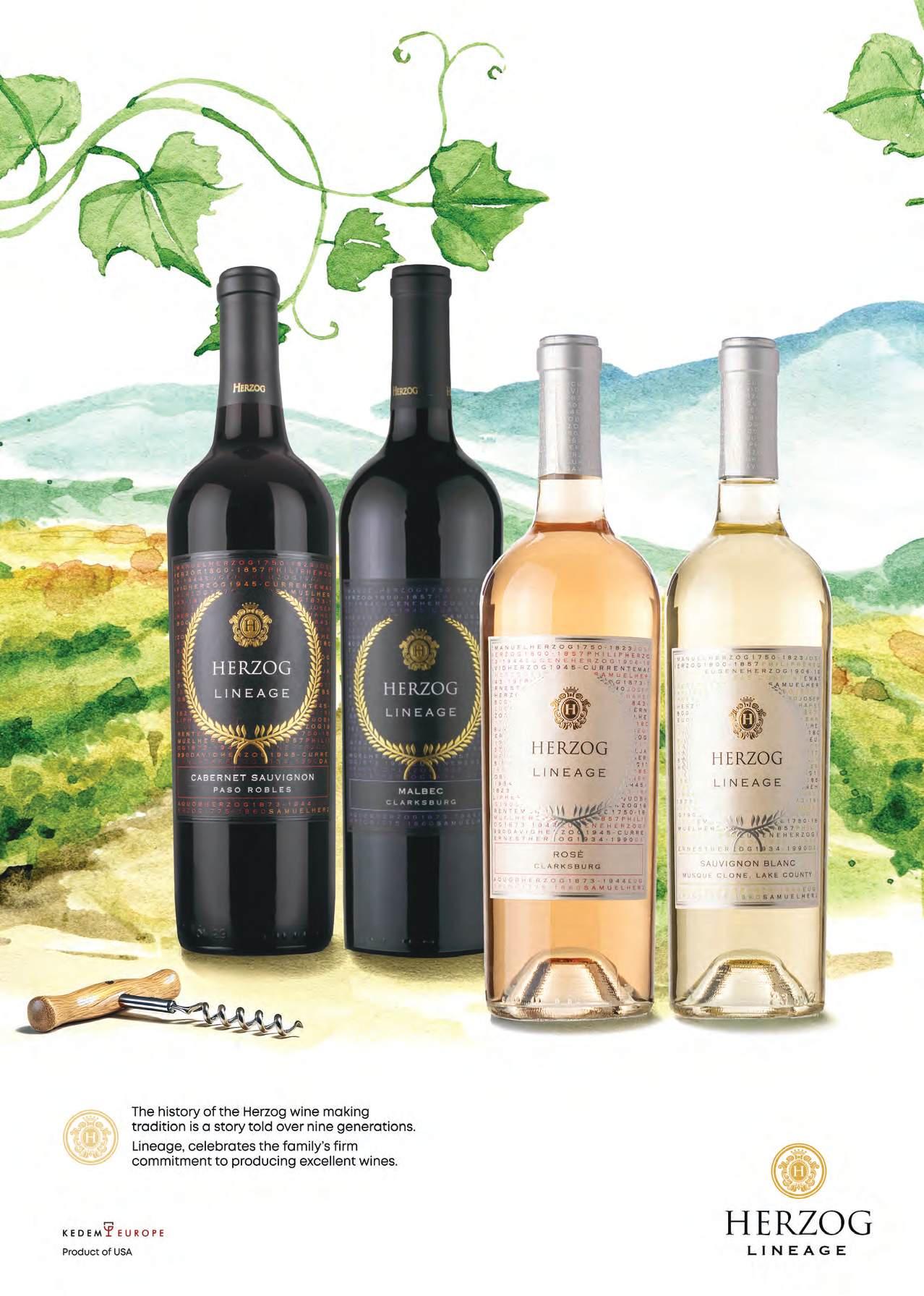STREISAND • TONY BLOOM
ISRAELI HOPE IN INDIA
THE THING • JEWISH CARE
GAY PRIDE • MEL BROOKS
ELLIOT LEVEY
EMILY DAMARI




STREISAND • TONY BLOOM
ISRAELI HOPE IN INDIA
THE THING • JEWISH CARE
GAY PRIDE • MEL BROOKS
ELLIOT LEVEY
EMILY DAMARI



SAYS IT ALL








Discover the difference – your journey with the Immanuel family starts here.
We believe in the power of small class sizes, inspiring Jewish education, outstanding pastoral care, and a personalised approach – ensuring every child flourishes.
To learn more about Admissions for 2025 and beyond, our generous bursary programme or to book a tour, please contact us on 020 8955 8938, admissions@immanuelcollege.co.uk or visit www.immanuelcollege.co.uk
Open Evening Monday 30 June
Scan here to register















25
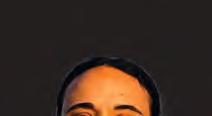




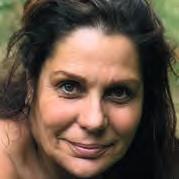
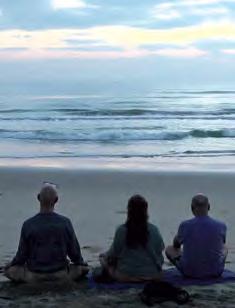

43 92 56
80
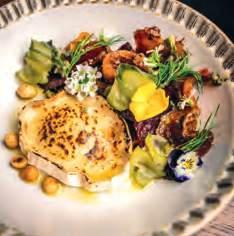
Isn’t this exciting?! You’re holding the first edition of a brand new kind of Life magazine, packed with stories and interviews with those you want to know more about.
People like Brighton FC chairman Tony Bloom (yes, the man behind the club’s meteoric rise), courageous Alice Wairimu Nderitu, former UN advisor cancelled for telling the truth, and Emily Damari, whose survival on October 7 has made her a symbol of strength in the face of terror. The images of Emily, shared exclusively with Life, remind us of what we can’t ignore, especially as Israel continues to be misrepresented, misunderstood and fights a war with Iran.
And yet here we are. The very existence of this magazine, and of Jewish News, stands as proof that we endure. It’s been tough and still is, but Jewish News continues to inform and inspire our vibrant community, which spans all levels of observance and identity. That we survive is thanks entirely to the support of The Jacob Foundation, a registered charity whose commitment to truth and Jewish continuity has never wavered.
We’re proud our cover for this new-look magazine features a fashion brand founder whose mission is to fight antisemitism, and are delighted that the last word comes from Olivier award winner Elliot Levey.
Hopefully there’s plenty inside to lift your spirits because we all need a break from the doom. Read, enjoy and if you’ve got a story, please do share it with us.
Have a splendid summer. You deserve it.

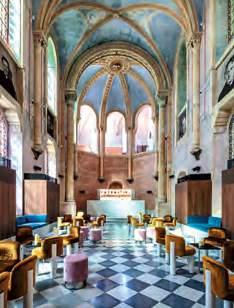
Editor Brigit Grant brigit@jewishnews.co.uk
Art director Diane Spender
Jewish News editor
Richard Ferrer
Features editor
Louisa Walters
Sub-editor Alex Galbinski
Contributors Justin Cohen, Debbie Collins, Jenni Frazer, Charlotte Henry, Candice Krieger, Jan Shure, Daniel Sugarman
Designers Sarah Rothberg, Dermot Rushe
Advertising sales
Brandon Cowan
Beverley Sanford 020 8148 9709
sales@jewishnews.co.uk
Front cover image ©Jouparty.com


Sun-drenched days, alfresco dining, and activities for all the family. The kind of stay that stays with you, long after check-out.





Seagal Hagege lived in California, just 20 minutes from Disneyland, before she made aliyah. It was after Covid, and she found out she was pregnant with her fourth child, when the family arrived in Israel on October 7, 2020. Exactly three years later, they were at their local synagogue, inside a Netanya high school, for Simchat Torah when the Hamas attacks happened.

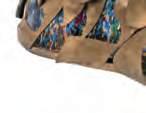
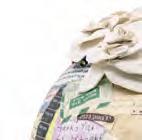











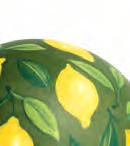
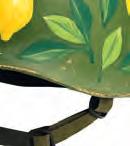
thought. Within minutes of going live on Facebook, she’d raised the rest. From that moment, Seagal, now a concierge with the Ari Fuld project, began receiving requests from commanders for everything from boots to glasses. “People give what they can. I top it off and deliver it.”

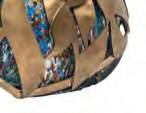

Aliyah hadn’t been easy. Settling the children in school was tough, and Seagal had even considered returning to the US. But October 7 changed that. At a local blood drive the next day, a message came through, she still doesn’t know how: could she help get 50 pairs of boots for Israel Defense Force (IDF) soldiers? She raised the funds, delivered them, then found out 90 pairs had been taken. “The supplier over-delivered, but how do you take boots back from soldiers?” she and accept, the will be ELO’s final

When she started replacing old helmets with new ones, she had an idea to ask artist friends to turn the old ones into art. Each helmet tells a story. One from the Yom Kippur war by Sylvia Harar is papier-mâchéd in blue, white and red. Another, by Ayala, is covered in rose petals made from love letters sent between families and soldiers in 1960. Seagal’s favourite is by Dr H, known for his gra ti-style, who surprised her by painting lemons.“I thought it was about turning lemons into lemonade, but it was the lemon tree in his mother’s yard, a symbol of home and safety is what kept him grounded when he went to fight.”
Some of the artists hadn’t touched a brush since October 7. For them, painting the helmets became therapy. On Yom Hazikaron, the helmets were displayed at the community centre in gratitude to the IDF and as a tribute to the victims . It is still in Netanya as transporting it is tricky, but Dr H has just opened a gallery,so the helmets may go there. Seagal would like to take the collection abroad to raise awareness and funds. “If someone can help make that happen, I’m ready.” arifuld.org story. One from the Harar is papier-mâchéd in
Get ready for a barmitzvah flashback – ELO and The Doobie Brothers are at BST Hyde Park on 13 July. Neither bands have Jewish members, but their music is pure simcha gold – with Mr. Blue Sky and Listen to the Music embedded in our party playlists. ELO’s rise to fame had the Jewish hand of Sharon Osbourne’s father Don Arden, the tough-talking impresario, guiding them on what became a 55-year journey that ends at Hyde Park. Yes, hard as it is to believe and accept, the Hyde Park show will be ELO’s final ever live performance –last stop on Jeff Lynne’s Over and Out farewell tour. Bring hankies for an emotional celebration of a symphonic legacy. bst-hydepark.com

Clueless: The Musical has been extended at Trafalgar Theatre until 27 September. We’d like to think that our Life cover played its part in the popularity of the show based on Amy Heckerling’s 1995 film, but it’s more to do with Emma Flynn, who made her West End debut with an enchanting portrayal of Cher Horowitz. Loved Tai in the film? Then Romona Lewis-Malley will delight as the new girl transformed by Cher's makeover mission, but she is joined by a cast committed to having fun with original songs by KT Tunstall. Trafalgartheatre. com



Depending on when you read this, Mel Brooks has turned or is turning 99. The word ‘icon’ gets thrown around a lot, but he is the real deal.
Just consider The Producers, his directorial debut in 1967, which introduced his irreverent satirical style, won him an Oscar for Best Original Screenplay and then won 12 Tony Awards in 2001 as a Broadway musical.

With Blazing Saddles in 1974, co-written with Richard Pryor, he skewered racism, and now nearly a century into life, Brooks is still busy. In 2023, he brought History of the World, Part II to Hulu, lent his voice to Paws of Fur and Hotel Transylvania and will soon
be heard in the animated The Land of Sometimes alongside Ewan McGregor and Helena Bonham Carter.
Brooks also publicly remembers his late wife, Anne Bancroft, who died in 2005.
“She was my soulmate. She knew who I was and loved me anyway,” he said in 2010.
Still sharp, funny and so Jewish, he is one of the last surviving links to Hollywood’s golden age. So in his honour we paraphrase the lines of Jim (The Waco Kid) in Blazing Saddles: “My name is Mel, but most people call me... Mel”. Happy Birthday Mr Brooks!
The first major London revival of Brooks’ hilarious musical transfers to the Garrick Theatre this autumn following a smash-hit sold-out run at the Menier Chocolate Factory. Based on the classic film, The Producers is about down-on-his-luck Broadway producer Max Bialystock, who schemes with timid accountant Leo Bloom to create the biggest flop in theatre history – only to have it backfire spectacularly. Patrick Marber directs a critically acclaimed cast, including Andy Nyman and Marc Antolin. It opens 30 August. To book, visit theproducersmusical.com
For your chance to win, visit jewishnews.co.uk/producers



Long before the Rolling Stones swaggered their way into rock history, a Jewish photographer from Camden was quietly snapping what would become their earliest portraits – then stashing the prints under his bed.
Gus Coral, 86, was a product of a British-Jewish betting dynasty – his uncle was Joe Coral, and his father Eric was also a bookmaker. His roots are in a Polish mining town and a childhood in London’s East End.
In 1963, Coral and two Cambridge friends predicted the Stones were going places. They tracked them down, then asked to shoot them.
The images, including this one at King's Cross, are on show for the first time at St Katherine’s Dock and capture a raw, unguarded band scraping for taxi fare.
There’s already a rumble at the Kiddush about Daniel Robbins’ Bad Shabbos, which is about a Friday night dinner that goes seriously awry – and we’re not talking just too much salt in the lokshen soup. Kyra Sedgwick, the Jewish actress and wife of Kevin Bacon, is the matriarch already struggling with her son marrying out, but wants to impress the future mishpacha, who haven’t met that many Jews. Dysfunctional with neurosis on the side, family tensions simmer and not just because of the dead body in the bathroom. Part Death at a Funeral, part Meet the Parents with added brisket, we promise you’ll be the first to know when it’s UK bound.
“They weren’t stars yet,” he says.
“But I knew they were something.”
Dockside Vaults in St Katherine’s Dock, 6 June to 10 Sept. £15.
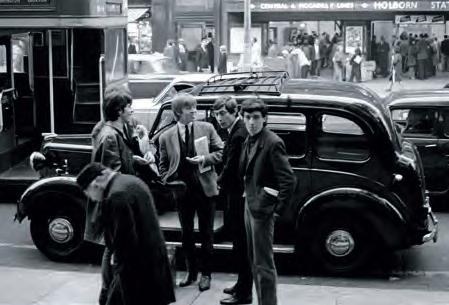



David Kracov, famed for his vibrant 3D butterfly sculptures, has just unveiled a bold tribute to Jackson Pollock – capturing Pollock’s raw, splashy energy in layered resin and paint. It’s a striking homage from one visual storyteller to another. Next up, Mark Rothko? We’d love to see Kracov translate Rothko’s emotional colour fields into sculptural depth. Now that would be a masterpiece in motion.
Scarlett Johansson never lets us down. She stayed put as the face of Israeli brand SodaStream and now her directorial debut, Eleanor the Great, honours the Holocaust. The film follows Eleanor, a 94-year-old widow (June Squibb), who moves from Florida to New York and, in a moment of spontaneous reinvention, begins telling a Holocaust survivor group her late best friend’s story as her own. When it premiered at Cannes there were tears and a standing ovation, not least for the real survivors who are in the film whom Scarlett found through the USC Shoah Foundation, among them Israeli actress Rita Zohar, who portrays Bessie, Eleanor's best friend. “There is absolutely no s**t


about her at all. Who she is, is who you’re getting all the time,” said June of Scarlett ( pictured above). We can’t get enough of Scarlett, so catch her now in Wes Anderson’s latest oddball epic The Phoenician Scheme in which she plays Cousin Hilda, head of a utopian engineering project at her scene-stealing best.
Nadav Lapid is regarded internationally as one of Israel’s most acclaimed and daring film directors and Yes! might be his most provocative yet. Set in the aftermath of the October 7 attacks, Lapid’s story is about Y (Ariel Bronz), a nebbish jazz musician asked to compose a new national anthem for Israel. That he goes to Gaza for inspiration tells you why Yes! is liable to getting a big No! from many camps, given the seriousness of the current situation. Yes! premiered at Cannes where it was critiqued in Screen Daily as “not an easy film to like – and it clearly wasn’t made to be liked”.
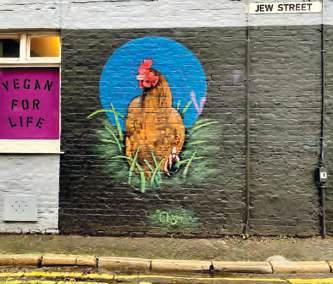
Walk with Marc Gardiner through the streets and alleyways of central Brighton on 27 July or 24 August to learn about the city’s history as a royal playground and 300 years of Jewish life. Starting at Brighton railway station, the stops will include North Laine, the Brighton Dome, Royal Pavilion, The Lanes and Middle Street synagogue. Book tickets on eventbrite.co.uk and, if you’re in Brighton you have to eat, so go on a Sunday to sample the incredible kosher BBQ at Novellino. Taste its burgers and you will never want another. See the sizzling on its insta page #bnjcbrighton

In the leafy calm of St Mary’s Park, Prestwich, the Muslim Jewish Forum’s annual interfaith picnic returns on Sunday 10 August to bring people of all backgrounds together for an afternoon of shared food and connection. No podiums, no politics, just sharing borekas and biryani with someone you might not otherwise meet. You might learn how to wrap a perfect vine leaf or share your challah tips. The message is to arrive at 12.30pm with food and an open heart.










The Jewish Children’s Book Awards will return for a final time in 2026. Run by Green Bean Books and The Jewish Literary Foundation, the awards spotlight original, unpublished stories by UK and European Jewish writers and illustrators for children aged four to eight. Entries must draw on Jewish history, values or traditions.
The winning story receives £1,000, and all entries are considered for publication by Green Bean Books – a rare chance for new and established writers to gain recognition and see their yet unpublished work in print.
Judges include PJ Library’s Chris Barash, Green Bean’s Michael Leventhal, illustrator Omer Hoffmann,
It’s coming from a care charity that has just unveiled a stunningly refurbished elegant, purpose-built home for up to 40 residents living with dementia. Wohl Household at Nightingale House is care, reimagined.

Israel Museum curator Orna Granot, and Jewish Renaissance editor Rebecca Taylor.
Michael says: “We really want to find exciting, innovative stories and discover how Jewish themes are explored in fresh, new ways.” Visit greenbeanbooks.com/ JCBA2026. Submissions close on Wednesday 5 November 2025 at 5pm

Each private room is fitted with an en-suite, thoughtfully styled with contemporary furnishings that balance comfort and calm. It’s a place that feels like home – but better.
But what truly sets Wohl Household apart is the people. Backed by a CQC ‘Outstanding’ rating, Nightingale House delivers exceptional, person-centred care. Every resident’s physical and emotional wellbeing is at the core of a holistic approach, supported by a dedicated expert team that values dignity and empathy. Communal spaces are filled with music, art conversation and calm – a nurturing atmosphere for residents and families alike. Part of the wider Nightingale Hammerson community, which supports more than 100 residents with residential, nursing, rehabilitation, respite, palliative and dementia care, the Wohl Household continues a tradition of excellence. To book a tour or to learn more, email ResidentsServices@ nightingalehammerson.org
The Shaare Zedek Memorial Book is a cherished annual publication that gives supporters a meaningful way to honour and remember loved ones while supporting the vital work of Shaare Zedek UK. Over the years, the book has become a moving collection of memories, tributes and reflections written by those left behind, as one supporter shared: “It has been an emotional journey that has linked me closely once more with those I miss, hold so dearly in my heart and will never forget.” To submit a name or tribute to the Shaare Zedek Memorial Book, contact katie@shaarezedek.org.uk or call 020 8201 8933.

For them And Eddie Had an Egg by Dina Leifer (Green Bean Books UK)
Author Dina Leifer transforms what could be a tedious tale of a fussy eater into a warm, relatable adventure. Born from Leifer’s real-life mealtime standoffs with her own son, the book nudges young readers towards curiosity (and maybe even broccoli). The story about stubborn little Eddie has a heimishe feel that children will recognise as loving persistence combined with the ever-present hope that today might be the day they try something new.
For you

My Other Half by David Isaacson (Ace of Swords Publishing)
After David Isaacson interviewed Life editor about her Midas Man Brian Epstein biopic for Jerusalem Post, she felt duty bound to plug his book.

Not much of a reader – every novel feels like homework – once she started My Other Half, she was in because she liked Jake, the 1970s student anti-hero, who dabbles in drugs and does his best to dodge adulthood. Then, quite suddenly, he ends up in Israel – and that’s when the story shifts. It’s still funny, but now there’s a head-on collision of past and present, heritage and hedonism, plus a messy romance with the elusive Diana.
But meet her for yourself. This coming-of-age tale asks whether the ‘other half’ we’re searching for might just be hidden in ourselves –or maybe in Jerusalem.

One year ago, a once-blank wall on the Finchley Road burst into colour with the unveiling of the London Jewish Mural at JW3. Spanning 26.5 by 14.2 meters across nine stories, this monumental artwork by Leon Fenster has become a vibrant testament to Jewish life in London. Featuring more than 150 figures,
weaving together centuries of history, culture and folklore, it includes Sigmund Freud, Benjamin Disraeli and Amy Winehouse, who is depicted confronting fascists at the Battle of Cable Street. To celebrate its first anniversary, JW3 is hosting events, including ‘Meet the Artist’ sessions, with Leon sharing his inspirations.
If you’re heading to Edinburgh this summer, check out Niusia, which is making its debut after sell-out seasons in Melbourne and Adelaide. Niusia was a Holocaust survivor and, 80 years on from the liberation of Auschwitz, there are almost no survivors left.
Her granddaughter Beth weaves together memories, handed-down stories and interviews to examine the precarity of identity and haphazard cultural legacy second, third and fourth generation immigrants are

immigrants are handed.
I Was A German is an autobiographical journey by writer and performer Clare Fraenkel exploring her quest to reclaim her grandfather’s lost citizenship upon finding the book he had written,


named Farewell to Germany. In a blend of personal history and broader themes of migration and antisemitism, this poignant piece intertwines her grandfather’s escape from Nazi Germany with her own search for roots, highlighting striking parallels with today’s anti-immigration climate.
Nu, does hot rabbi Noah (Adam Brody) ditch the one who isn’t Jewish (Kristen Bell) for one who is and opt for promotion at the Temple ? Or can Joanne now recite the Shema better than him while juggling kneidels? You can ponder this over the summer as season 2 of Nobody Wants This will not be on Netflix until October. Meanwhile the trailer is out and has the cast passing a black Magic 8 Ball as they seek answers to burning Season 1 cliffhanger questions.


Elstree Studios is turning 100 – and what a century it has been. It is where Star Wars, Indiana Jones, The Crown and EastEnders came to life. And the legendary Borehamwood-based studios is marking its centenary with a programme of events, including the UK’s first AI-driven immersive film experience opening on Borehamwood High Street and a Hollywood-style ‘Borehamwood & Elstree’ sign.
One of the most heartfelt events will be the Celebration of Jewish Filmmakers in partnership with Jewish News, which will toast such Jewish talent as legendary producer Alexander Korda, broadcasting titan Lew Grade and Stanley Kubrick, who filmed The Shining on site. Jonathan Weissler is producing the gala set for late 2025. “It’s always felt like home,” he says.

The fundraising landscape for Jewish charities has never been more challenging.
The Jewish community continues to give generously, but there’s fierce competition for every communal pound—both between Jewish charities and across the entire charity sector.
You need an edge. Hope can give you exactly that. We bring three decades of deep expertise within the Jewish community, where we’ve created some of our most memorable and effective campaigns. We understand the nuances, the values, and what motivates Jewish donors to act.
We’ve spent recent years expanding our expertise across other sectors, and now we’re bringing that broader perspective back to serve Jewish organisations.
This combination of community insight and fresh creative thinking delivers campaigns that don’t just raise awareness—they deepen engagement and significantly increase donations.
Our approach is strategic, creative, and rooted in genuine understanding of what works. We know how to cut through the noise and connect with donors in ways that drive real results.
Ready to explore what’s possible for your organisation?
Get in touch with Lionel Salama at lionels@hope.agency








Streisand assembles a glittering line-up of vocal royalty for her latest album, including Bob Dylan. By Jenni Frazer
At 83, she could be forgiven for spending her days in Malibu, gardening or reading presidential biographies, but that’s not Babs. She’s still got plenty to say – and sing.
Politically outspoken, famously private, and a fierce defender of democracy and decency, Barbra Streisand remains a cultural lightning rod: revered, criticised, unstoppable. She has been
happily married to James Brolin since 1998, published her memoir tome, My Name is Barbra, last year and is still the only artist with No.1 albums in six consecutive decades.
And now, she’s back with a new release – The Secret of Life: Partners, Volume Two – out tomorrow (27 June).
This latest offering is another starry collection of duets with the great and the good. And because Babs is Babs, she can call on literally anyone… and

she has. The line-up includes Paul McCartney, Sting, Mariah Carey – who doubles up with Ariana Grande – then James Taylor and, notably, Seal, with whom she performs Love Will Survive , the haunting theme from The Tattooist of Auschwitz TV series.
Pitching the grandkids of her fans is a smart move, so Barbra joins the woke ‘they ’ – Sam Smith on To Lose You Again – and there’s a collab with Icelandic jazz-style newcomer Laufey. More controversially – at least for some –committed pro-Palestinian Irish singer Hozier is her partner on The First Time Ever I Saw Your Face . Those who ganged up on Barbra when she posted about the ‘b eautiful, young Israeli couple gunned down outside the Jewish Museum in D.C.’ will doubtless be confused by Hozier saying of Barbra, (who plans to make a Golda Meir biopic) – “She is one of the most enduring and iconic vocalists of our time... To be asked to join her on the album was a huge honour.”
Their duet was the fi rst single released; the second was her croon with Sir Paul of My Valentine, a version of the 2011 love song he originally wrote for his Jewish wife, Nancy Shevell.
Reflecting on the collaborations, Streisand shared: “I’ve always loved singing duets with gifted artists. They inspire me in unique and different ways and make our time in the studio a joy!”
But wait! These “partners” are all, let’s face it, singers – as in people known for being vocally gifted. So what on earth is Streisand doing duetting with none other than the gravelthroated enigma that is Bob Dylan,
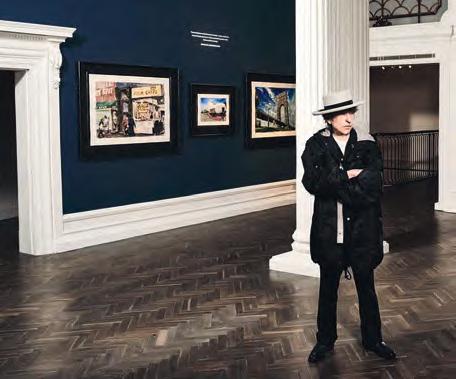

aka Robert Zimmerman?
The pair team up for a version of the Nat King Cole classic The Very Thought of You , and yes, it’s as unexpected as it sounds. Although, in a way, not totally out of the blue.
Dylan originally wrote Lay Lady Lay for the 1969 fi lm Midnight Cowbo y; however, he didn’t fi nish it in time, so Harry Nilsson’s Everybody's Talkin’ was chosen instead. There’s been speculation about who Dylan wrote the song for ever since, but Barbra claimed in a 1971 interview that he once told her he’d written it for her. Wild, right? Dylan never publicly confi rmed that – but Babs must know now. That backstory makes their new collaboration all the more delicious. Dylan even approached her in the ’70s about doing a duet album. It never happened – until now, in a way. And if Dylan doesn’t exactly croon like Nat King Cole, maybe that’s the point.
It’s not even his fi rst time harmonising with a legendary Jewish


woman. In 1976, Dylan recorded Buckets of Rain with Bette Midler – aka The Divine Miss M – which included the unforgettable line: “Little red wagon, little red bike, I ain't no monkey but I know what I like.” He had more of a voice back then. But not much more. Maybe Barbra figured it was time to catch him while she still could. Honestly, their voices entwine tenderly on The Very Thought of You . Meanwhile, Dylan is in something of a late-life renaissance. Famously private – often myth-making about his past – he’s been emerging more into the public eye. Ahead of the launch of the Dylan biopic starring Timothée Chalamet, the man himself popped up on social media to say: “There’s a movie about me opening soon – A Complete Unknown (what a title!). Timothée Chalamet is starring in the lead role. He's a brilliant actor so I’m sure he’s going to be completely believable as me. Or a younger me. Or some other me.”
If your Dylan fandom isn’t quite sated by that fi lm or the duet with Babs’ you can still catch Point Blank , a major exhibition of his paintings at the Halcyon Gallery in London’s New Bond Street until 6 July. There are 97 works on display, part of what Dylan calls “a more deeply personal” evolution of his art. The Times’ critic was impressed, calling the paintings “understatedly remarkable.”
So, no, Dylan’s not heading for the porch just yet and neither is Barbra. All we need now is to hear that she and Paul Simon,also 83, have quietly launched a fashion line on the side. There’s something to be learned from Babs’ new album – The Secret of Life – and that’s to keep going.























































































































































Scan QR code to book your tickets!


















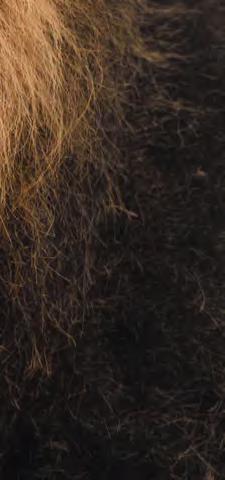



Rainbow flags were everywhere, moving in the breeze, and they moved me, as I had been invited to join a press delegation attending Tel Aviv Pride and was thrilled to be there. I was excited to report on celebrations that were scheduled, not in spite of the confl ict but because such freedoms are what are being fought for just a short distance away.
L ast year, Pride, not unsurprisingly, was paused out of respect for the hostages and the war and replaced by a moving ‘Pride and Hope Assembly’, but this year, Israelis decided the legendary party must return.
L ittle more than 24-hours after landing at Ben Gurion, Israel launched its daring raid against Iran and everything changed.
P ride began with a reception hosted by special guest Caitlyn Jenner. The alarm cut through my gin-enhanced sleep in the early hours of Friday 13 June. I scrabbled around my room, grabbing pyjama bottoms and my handbag, then headed down to the shelter - something I’d never done before, despite many trips to Israel.
The main Tel Aviv Pride Parade was set to take place the next day, but all events were immediately cancelled. As the sun came up, the rainbow flags still



Tel Aviv Pride started, then stopped due to the war with Iran. Charlotte Henry was there
fluttered in the empty streets. Everyone was ordered to stay near shelters.
The cancellation was a devastating blow to the businesses and workers expecting to benefit from Pride and the tourism it brings in. Millions of shekels are estimated to have been lost as the state of emergency forced the party to end right after it started.
The disappointment was tangible when I asked people how they felt about the situation. “It’s war with Iran,” said a staff member at a beach bar, walking away with an almost resigned shrug.
At the pizza restaurant across the road from the Royal Beach Tel Aviv, where I was staying, employee David had been told he could only offer a takeaway service. But he supported the action Israel had taken against Iran. “We can see again and again how they say they want to destroy us,” he explained. “The Iranian nation are not the enemy. They are good people. But we are scared by the government over there.”
T his was the view reflected in other conversations I had. People in the country know that Iran poses an
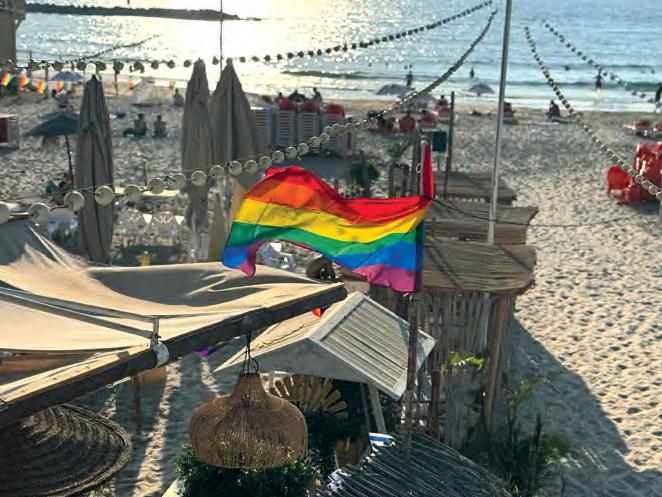

Since its founding in 2004, Masa has served more than 200,000 young professionals from over 60 countries, and its network continues to grow. Make this year stand out and see where your Masa can take you. Masa Israel Journey is more than just a physical journey to Israel. It’s an opportunity to explore oneself in new surroundings while gaining a transformative experience.

4-10 months for fellows between the ages of 18-40 in Israel, that allows fellows to shape their own futures. Masa fosters an environment where fellows are encouraged to strive towards their personal and professional destinations both during and after their programme in Israel.


existential threat. Israelis are sadly used to flare-ups of violence and trips to shelters, not least since the atrocities of October 7, but this was far more serious than when Hamas or the Houthis fire missiles.
A s for David’s view on the financial impact on his restricted business? “Money come and go,” he said, stoically.
O ver 250,000 people were expected to participate in Pride month in Israel and headed there from both within and outside Israel to join the celebrations in Tel Aviv itself. Zakai Ben- Haim and his partner Yaron Shiloh were in town from nearby Ranana with their daughter. The morning after the attack launched, she sat at breakfast in the bright pink fairy outfit, complete with wings, that she had prepared for the Parade. “We're the fairy fleet,” explained Ben Haim, himself in rainbow-adorned trainers. “Spreading happiness and rainbows everywhere we go.”
B en Haim made Aliyah from the US ten years ago and describes Tel Aviv Pride as “the centre of gay life in Israel”. His partner Shiloh, an Israeli who served in a technical role in the Airforce, adds that while the family did
consider returning home, “we wake up in the morning and things were as usual. Same breakfast. Same nice hotel. Same beach… people are going and insisting on keeping alive.”
EXCLUDED FROM PRIDE
D espite it being orders of magnitude more advanced than its neighbours, there is undoubtedly more to be done on gay rights in Israel, including allowing same-sex marriage. Yet, it is where LGBT Jews can be their full selves.

Darrow, a Californian who I met in one of my trips to the bomb shelter, explained that Israel is “the only place in the world that I feel safe as a queer Jew. Like, I feel safer here, even with the bombings, even with the running to the shelter in the middle of the night, even with all the crazy promises that Iran is making that they're going to wipe us off the face of the planet.”
It's an understandable sentiment. In the diaspora, balancing a Jewish and LGBT identity can be fraught. Many LGBT Jews have felt excluded from Jewish spaces, especially Orthodox ones, while simultaneously
PRIDE 2025 party flyers. BELOW: PRIDE beside Israel's call for the hostages return






encountering hostility in progressive queer ones, especially as tensions around the Israel-Hamas confl ict have escalated.
E lazar Ben Lulu, an academic at Ariel University who researches issues around Judaism, describes trying to connect the two worlds as a “double dialogue”, one that is often being met with “double discrimination”. In the UK, this has meant Jewish LGBT groups are increasingly absent from Pride events.
Eyal Yakoby, writing in the essay collection Young Zionist Voices, explains this through a DEI (Diversity, Equity and Inclusion) lens:
“DEI categorizes all social and political actors into binary classes. There are oppressors, and there are the oppressed. Jews, it turns out, are uniformly considered part of the oppressor class, and are therefore immune to prejudice or injustice.”
For Jews, being “immune to prejudice or injustice” would make a nice change.
As pro-Palestinian activism has intensified, Jewish groups have found themselves marginalised or excluded from queer spaces too. Slogans like “From the river to the sea”, viewed by many as antisemitic, are used by LGBT people at protests and other gatherings, creating a hostile environment for Jewish inclusion.
T his dynamic has affected UK Pride events. KeshetUK, the leading Jewish LGBT charity, has pulled out of

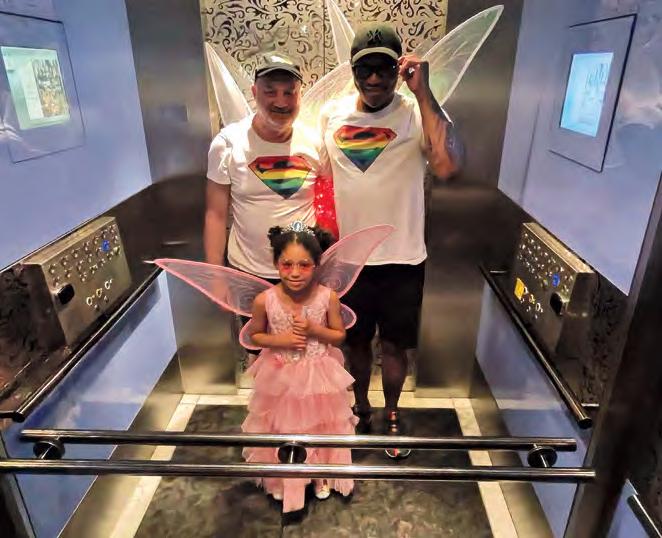
‘ For Jews, being immne to prejudice or injustice would make a nice change ’
London Pride for a second year, stating it was “hugely disappointed” in Pride in London’s leadership, which had failed to address its concerns.
Last year Brighton-based group Jewish and Proud was excluded from the march. This year, Brighton Pride organisers said they “weren’t aware of any Jewish groups applying” – a telling detail in itself.
Though organisers insist they welcome all communities and denounce antisemitism, Jewish groups are conspicuously absent. The official line about prioritising “local LGBTQIA+ organisations” doesn’t explain the consistent lack of Jewish presence given the city has a visible and engaged Jewish community.
Elsewhere, Manchester Pride faced a backlash last year for having Booking. com as a sponsor, not because of any LGBT issue with the company, but due to its “accommodation listings in occupied territory”. The grotesque irony of this, seemingly lost on those objecting, is that Israel is one of a relatively small number of countries in
ABOVE: Zakai Ben-Haim and Yaron Shiloh with their daughter.
LEFT: Pride love for the hostages in Gaza
the world - and the only one in the Middle East - where LGBT people could safely organise a trip via Booking.com . Manchester Pride declined to comment to Life on whether Jewish groups would be marching this year. At the time of writing, its website still proudly features marchers in branded Booking.com gear.
In author Ben M. Freeman’s view: "LGBTQ+ Pride in Israel is a beacon to the world, and a symbol of the hardwon rights Israeli LGBTQ+ people have fought for - and continue to defend. It also holds deep meaning for LGBTQ+ Jews in the diaspora, many of whom feel excluded from the wider Queer community because of their Jewishness. Now more than ever, LGBTQ+ Jews - in Israel and beyondmust stand fi rm and proud in both their identities. This is part of a broader movement of Jewish Pride, where embracing our full selves is an act of courage, resilience, and joy."
My trip to Israel was meant to be full of parades, parties and rainbow flags. That isn’t how things panned out. Yet as I stood in a sweltering bomb shelter in the middle of the night, the sirens screaming and missiles booming overhead, I felt prouder of Israel and the resilience of Israelis than I ever had before.
• At the time of writing Charlotte Henry was still in Israel.








Please join Technion UK for our September Solidarity trip to Israel.
You will experience a new highlights every day as our tours are fascinating, heartwarming, educational, breathtaking, and fun.
We meet the President of Israel and tour Mount Herzl to visit to the Military Cemetary where we will say a prayer for all the fallen soldiers.















You will experience real ‘behind the scenes’ situations as we meet with the IDF, as well as hearing stories of what actually happens on the battle fields. These will be one time experiences, unavailable to the general public.
Some highlights will be to visit Start ups and understand how Israel became the Start Up Nation. We will be visiting Meta (formerly FaceBook) as well as the fast moving Start Up called Moovit, which tells you in real time where your chosen mode of transport is and when it will arrive etc, used by most of Israel.
There will be a private event in a Villa in Herzliya with musical entertainment, a BBQ and the speaker will be a Reservist Battalion Commander, who has just completed 4 tours in Gaza.
We visit a new museum dedicated to the 1.5 million Jewish Soldiers who fought in WWII. The museum focuses on the heroism of these brave Jewish soldiers.
A visit to the Knesset is a must during these days of division. We will meet with MK’s, a Supreme Court Judge and understand more about the proposed Judicial Reforms and the enlisting of the Harredi community.
There will be briefings from high profile spokespeople and journalists and a day with the IDF to visit the Shura Military Base and an Air Force Base.
A day will be spent at the Technion in Haifa where we will hear about ground breaking research and innovations, which are changing the world followed up by a visit to the Rambam Hospital which houses the Technion Medical School where we will learn how a 1,500 underground parking lot can be transformed to a 2000 bed fortified hospital in 72 hours!
We will meet the Druze community and hear about their dedication and loyalty to Israel and the IDF and hear about some of the heroic stories from October 7th.
You will meet Reservist Combat Soldiers, one of whom is a Rabbi in the Search and Recovery unit of the IDF, whose job it is to find the bodies of combat soldiers who have fallen before the enemy finds them. We will hear about the work being done with soldiers who are struggling with psychological issues.
We will enjoy wine tasting, plus so much more. In the true spirit of Israel , we switch from heartache to celebration. Israel needs to see us visiting and supporting so please join us.




















For day trips and holiday escapes. For longer retreats or cosy Shabbat weekends. Just over an hour from London and moments from the sea, BNJC is your coastal Jewish community hub.























By Brigit Grant

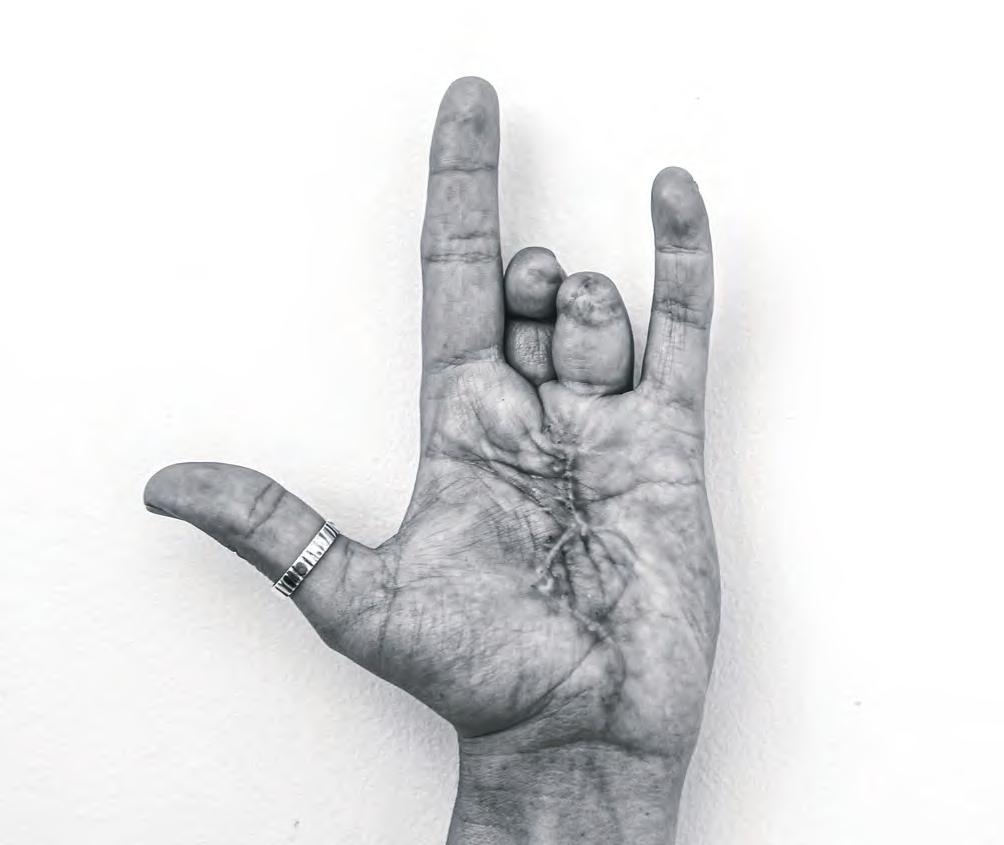
On Day 30 in captivity, Emily Damari thought about the sea. The terrorist guard, who refused to let her look out the window, teased her about it being visible from the roof of the Gaza building in which she was held. The Mediterranean has been a constant in Emily’s life, just three miles from Kibbutz Be’eri, the home from which she was abducted on October 7. The home where she was shot in the hand – that has become her defiant three-finger salute – then in the leg, at the same time as her adored 11-year-old dog Chucha was murdered.
The Hamas guard agreed to take the girl they nicknamed Fuduli (Arabic for curious) to the roof. Emily was led to believe his action, if discovered, would result in his execution, but his risk let her, wearing prayer garb, see the chimneys of Ashkelon, Sderot, Kibbutz Kfar Aza and Be’eri in the haze of explosion smoke. Panicked when she pointed at drones overhead, all Emily could think was that she was a hostage, standing on a Gaza roof in a hijab. “It was insane.”
Released on 19 January and held close by her mother Mandi – who campaigned relentlessly for her release – Emily was treated at Sheba Medical Center in Tel Hashomer, then reunited with her forever friend Romi Gonen, with whom she shared a cage in a Hamas tunnel for 14 months.
Supporting one another through terror that made the thought of suicide feel like a reprieve,
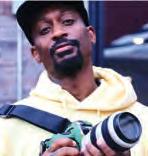


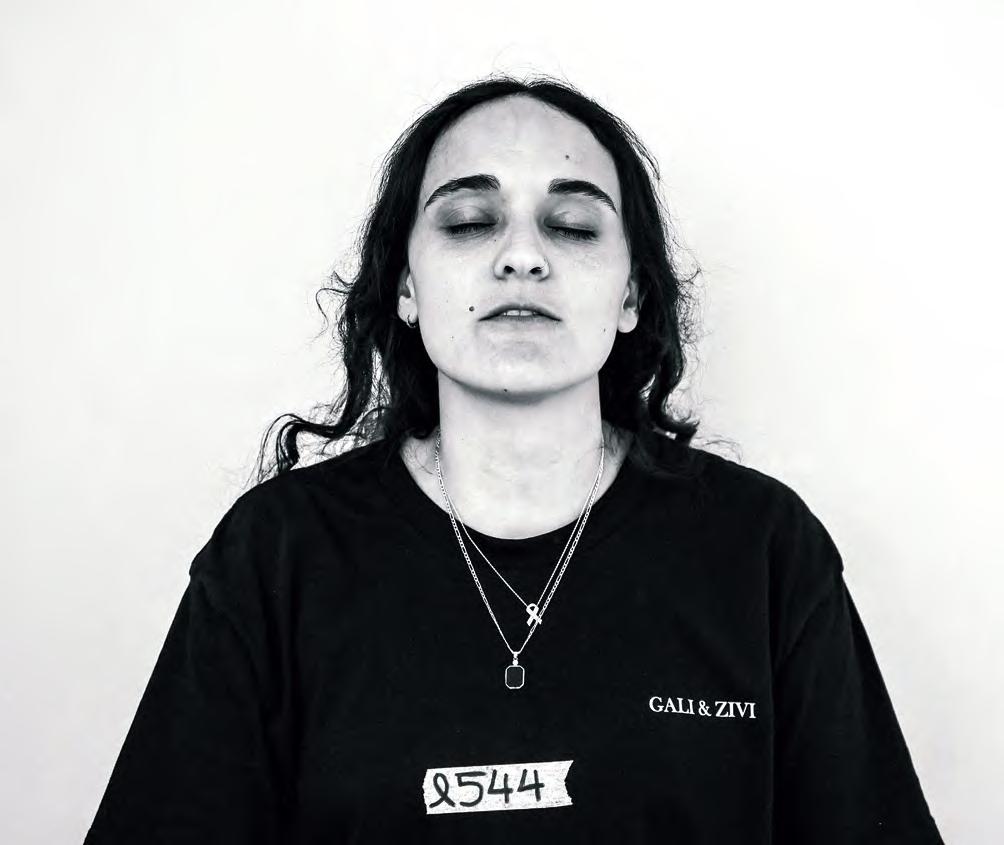
Emily and Romi’s shared ordeal was detailed in a recent documentary on Israel’s Channel 12.
In her interview with Yigal Mosko, Emily spoke about everything. Fearing her family had been murdered. Keeping her sexuality a secret – wisely, as a terrorist told her he’d have no issue killing his brother if he were gay.
Emily made it her mission not to show weakness, thinking, ‘If I take a bullet – fine. So I die.’ She could have died when she physically defended a fellow hostage by pushing a guard who had been a bodyguard to slain Hamas leader Ismail Haniyeh.
Her formidable strength of character wasn’t lost on the terrorists, who also called her John Cena after the American wrestler. The other hostages had never met anyone like her. She stayed cool even when labelled a saja’iya (hero) by her captors.
Emily said Romi – who cried on camera – was the emotional one, but there was no hiding her own feelings when she introduced her father Avichai, noticeably absent in all the coverage. He was diagnosed with Alzheimer’s a decade ago and Emily said the family never understood why. “Only when October 7 happened, we understood,” she said. “God didn’t want my father to go through it.”
Until Mosko’s interview, Emily refused in-depth media appearances, intending to stay silent until the release of her friends and neighbours, twin brothers Ziv and Gali Berman. Taken with Emily from the kibbutz in blindfolds, Gali comforted her as she recited the Shema moments before terrorists stormed her house. She has their names
embroidered on the cap she wore as she stuck posters of them on a lamppost. Ziv and Gali punctuate all her conversations, so sharing her spotlight with them – and the remaining hostages – was always
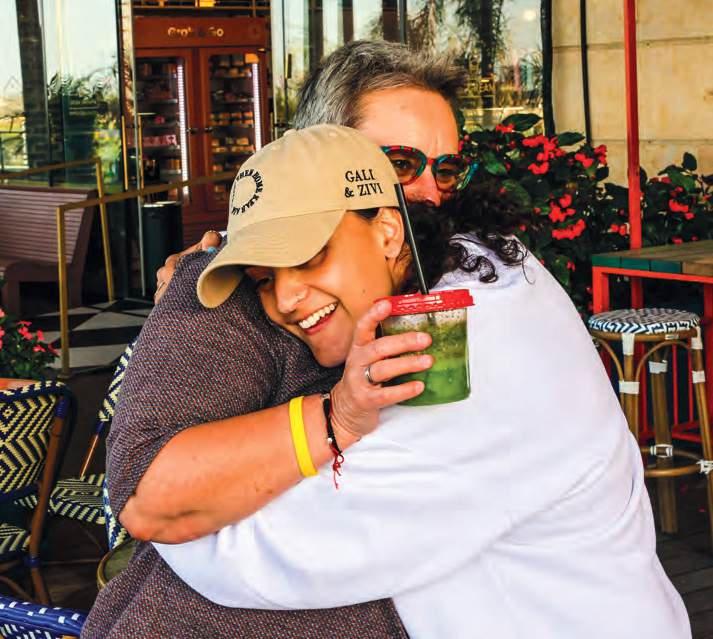
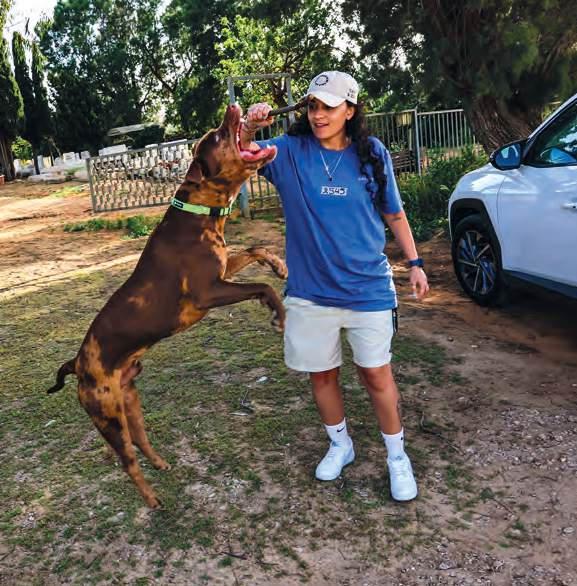
going to be more powerful than her silence.
The documentary wasn’t planned when New York photographer Mel D. Cole went to take pictures of Emily in Israel. His first visit was during another tenuous ceasefire when some hostages were released, but he didn’t come from personal connection or emotional investment. “That’s not how I operate,” says Mel, who for two decades has shot everything from album covers to political protests. “When I photograph war or trauma, I don’t go looking to feel – I go to see. To document. To listen. To get clarity. My job isn’t to insert myself; it’s to tell other people’s stories.”
Until meeting her, Mel had only captured Emily second-hand, photographing people holding her picture at rallies and vigils. “But something about that trip lingered. It felt incomplete. I went back because I wanted depth – something grounded in aftermath and recovery. I thought if I could document someone who survived – whose life continued after the headlines – maybe I could tell a fuller version of this crisis.”
Their first meeting was outside the Sheba
hospital. From there, he followed Emily, observing whatever she needed to do. “Ninety percent of what I shot was unstaged. A couple of times I asked for specific things – portraits of her hand – and mostly, she let me in.”
Mel was with Emily for two days. “We were meant to do more, but she cancelled a session –understandably. Emotionally, it was a lot. I met her mother, one of her brothers, a close friend, and Romi Gonen at the hospital, where their beds were still pushed together. They’d been through the same surgeries, the same silences, the same hell. You could feel the weight of that bond.”

One image stayed with Mel; it was of Emily playing with her brother’s dog. “She told me her own dog was killed in front of her. I’m a dog owner too – your dog is family. I understood why that loss, layered with everything else, was devastating.”
ABOVE: Emily with her brother's dog. Portrait gift of support . BELOW: At the grave of Shahar Aviani, who was murdered

Mel didn’t announce his trip to Israel before leaving. He wasn’t looking for opinions. “But when I posted some of my work – just street photos in Jaffa, Black and Brown folks at the beach – I got backlash. People assumed I was pushing a political message. I wasn’t. I was documenting life as I saw it. Still, I lost followers. People called me a Zionist. Others said I was trying to whitewash the war. All I did was share what I saw – a peaceful beach. A religious festival in Bnei Brak. That’s the thing about being a documentarian – people project anger onto your work. But I’m not giving personal commentary; I’m showing what’s there.”
Given the opportunity, Mel would have gone to Gaza too. His inclination as a photojournalist is to show both sides. For those who campaigned for Emily Damari, there was only one side – and a single objective: to see her released.
The fruit of that campaign was Emily’s Shabbat appearance at Highgate synagogue and the next day at White Hart Lane, where the loyal Spurs fan is “one of their own”. Mel wasn’t at either rapturous event, but he was with her in Israel, on a hill by the sea. Emily wrote the caption for Mel’s photo on Instagram: “I came back to life.”

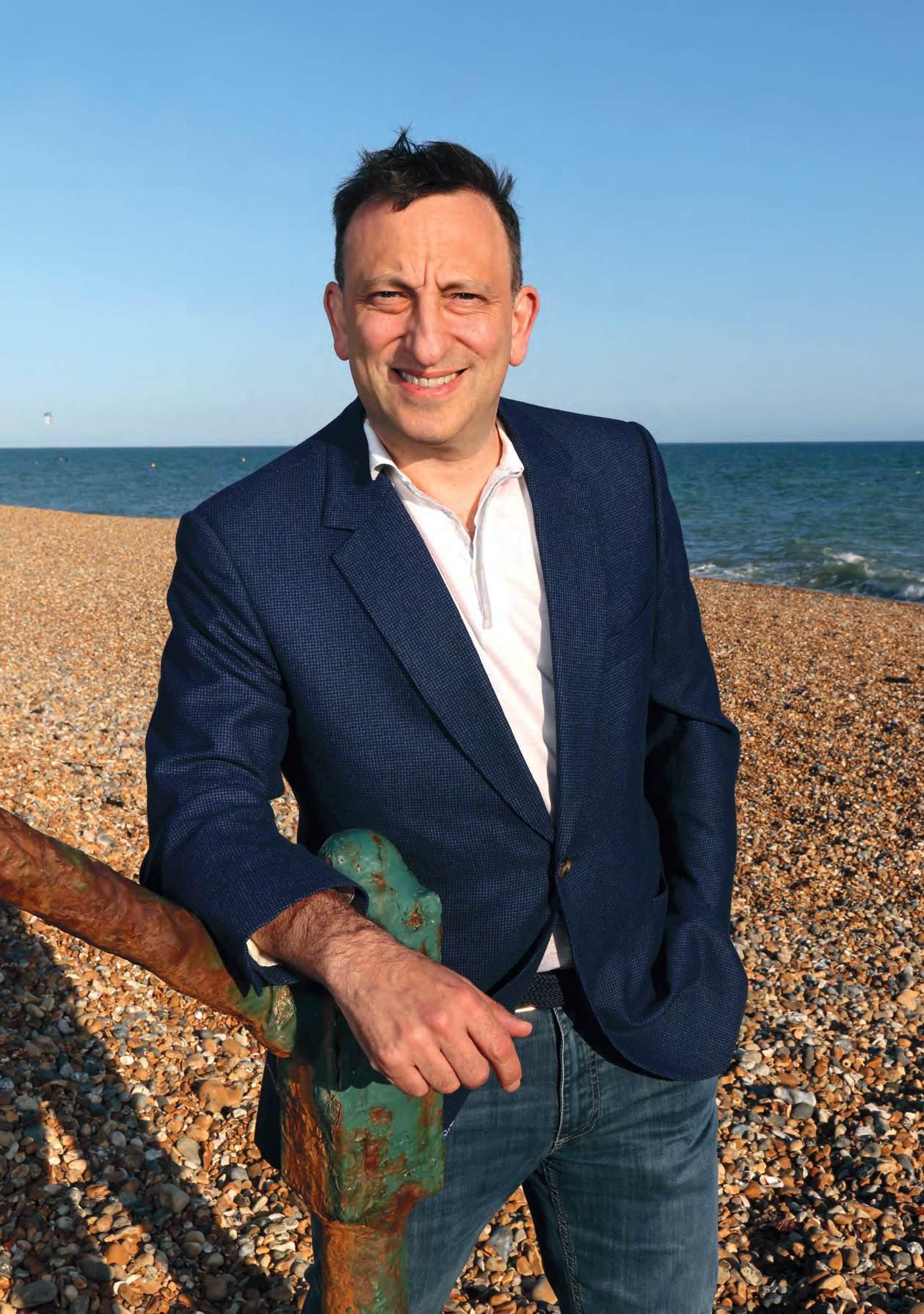
Tony Bloom has built a football club and a future for Jewish life on the south coast, writes Justin Cohen
Tony Bloom is living every football fan’s dream. He is the owner of the football club he has supported since he was eight, but to say he wears his success loosely would be an understatement.
The 55-year-old famously travels to games by train, where he rubs shoulders with fellow fans, shuns private planes (not just for environmental reasons) and comes across as every bit the man of the people those who know him best describe. I meet him at the modest London offices of the gambling consultancy to which he is closely linked, where Britain’s 213th-richest person prepares himself a tea and offers to make me one.
His positive impact on Brighton goes well beyond football. While fans chant his name at the Amex Stadium, Bloom has also set his sights on revitalising Jewish life in the city through the creation of BNJC (Brighton & Hove Jewish Community), a landmark community hub that has already begun shaping a new future for the city’s 4,000-strong Jewish population.
Given this is his first full interview in years, the absence of a club press officer in the room or on the phone is striking. When it comes to business, Bloom, a devoted father of two, is very much in control.
The same applies to his public pronouncements in his career as one of the country’s most accomplished sports betters. (He dabbled in slot machines as a teenager and won hundreds of thousands in televised poker tournaments before setting up a private betting syndicate).
But when it comes to his beloved Brighton, the

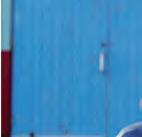






words flow like the goals he loves to see since his arrival as owner in 2009. “I’d go wild,” a suddenly illuminated Bloom vows when asked how he’d celebrate if the club ever achieved his dream of winning a major trophy. “I don’t know exactly how until it happens. That’s the emotion of football.”
You’d be braver than I am to make a wager against one of the country’s most successful professional sports betters, whose access to the most cutting-edge data has helped drive his success on and off the pitch. Brighton returned to the top flight of English football after a 34-year absence in 2017, boosted by a £93m cash injection and a new stadium. Four years later, they finished sixth in the Premier League, qualifying to play in Europe for the first time.
“I couldn’t have imagined it going better over the past 16 years,” he says. “I was always confident we would make the Premier League, but I wasn’t sure we could stay there and thrive. The past four years show we can.” For Bloom, Brighton FC is a family


affair: his uncle served on the board for four decades and his grandfather Harry was vice-chair for nine years until his death on the team coach in 1980.
He acknowledges that buying a football club is usually a recipe for losing money. “It’s an amazing feeling [to own the club], but I had my feet on the ground,” he says. “In most cases, football ownership isn’t wise. People lose money and often get abuse from fans. I wouldn’t recommend it. But if I hadn’t stepped in, the club I’ve loved my whole life might have disappeared.
“I had a vision – to get to the Premier League, with a new stadium and a long-term plan. Many fail because they want instant success, which is nearimpossible in sport.”
So can we expect to see his children on the board one day? “They are both big Brighton fans,” Bloom smiles. As for himself, he has no plans to step away “for a very long time”.
It’s no wonder Bloom’s name is sung from the stands with the kind of affection rarely reserved for a chairman. As Brighton CEO, Paul Barber, noted when Bloom was awarded an MBE for services to football and the community, his influence extends far beyond the pitch.
The Bloom Foundation – the charity he and wife Linda set up – has given millions to causes locally, nationally and in Israel. “My parents were involved in charity, so I understood how important it was,” he says. “We feel blessed to support so many causes. I did a half-marathon at school for RNLI [Royal National Lifeboat Institution] and I remember the joy when friends donated. We started the Foundation young and hope to build it for decades.”
ABOVE: Diego Gómez of Brighton & Hove Albion celebrates a goal against Spurs last month. BELOW: Chief Rabbi Ephraim Mirvis officially opens the BNJC in 2023



'British Jews have been here a long time and they’ll be here for a long time to come'
Two projects are especially close: the charity Overcoming MS, as Linda was herself diagnosed with multiple sclerosis 20 years ago, and BNJC, the state-of-the-art Jewish hub that opened in 2023. He says of his parents that “they’ve had lots of nachas from what we’re trying to do”.
“We once had three thriving Orthodox synagogues in Brighton, but large numbers have been leaving and we were concerned what Jewish life would look like for the next generation. I knew that New Church Road shul was looking to sell its property to a developer, with some land kept for a shul and small adjoining community hall.
"It was at that point that Marc Sugarman [long-term friend of Bloom and BNJC trustee] and I began speaking to Brighton & Hove Hebrew Congregation (BHHC) about doing something much more substantial.”
From Covid delays to community politics, the BNJC journey hasn’t been simple. But the end result is a stunning new home for the BHHC, the city’s only kosher restaurant, a mikveh, a nursery, a gym, space for educational and cultural events and accommodation for short-term holiday rental and family living.
“It’s attracting all types. Young families, London commuters, people wanting a sea change. We’ve hosted synagogue and youth group Shabbatons, school visits and young adult events and we’re only minutes from the sea. I’d say: try it out!”
In a city where anti-Israel activity has spiked, BNJC is also a place of solidarity with the hostages. “Anything we or anyone can do to publicise the plight of the hostages is so important,” says Bloom. He ranks the centre “high” among his proudest achievements. “We’re really pleased with how the
past two years have gone. BNJC gives the community the best possible chance of thriving for decades to come. Synagogue attendance is up and we are welcoming locals and Jews from further afield too.”
The theme of unity runs throughout our conversation. In Israel, his Foundation supports initiatives bridging Jews and Arabs, religious and secular. In Brighton, he speaks proudly of hosting iftars at the stadium and the friendship between Israeli Jew Tomer Hemed and Israeli Arab Beram Kayal, who played side by side.
What isn’t left to chance is player recruitment. Bloom is confident Brighton are on track for more European football, with Jamestown Analytics – a data firm he is closely linked to – playing a key role. Its insights helped to discover players early and sell them at huge profit. Jamestown and Starlizard, where Bloom is the main client, also provide data to Belgian champions Union SaintGilloise and Scottish side Hearts, where he recently invested £10m.
And Israel? Would he ever invest in a club there? “My fear would be the politics in Israeli football would be more than I can cope with,” he smiles.
Turning to Jewish life in the UK, Bloom – who is “very proud to be Jewish” – is optimistic: “British Jews have been here a long time, and they’ll be here for a long time to come.” But the rise in antisemitism post-October 7 didn’t surprise him. “Thew situation right now is bleak. I'd like to think that education from a young age across communities would lead to stronger connections and better understanding between faiths."
As if he hasn’t already done more than enough for Brighton’s reputation, we end where we began: at BNJC. Who’s his dream guest? “Messi could come seven days a week if he wished,” Bloom grins. And what about seeing him in a Brighton shirt towards the end of his career? “Even on a downward trajectory, his salary is far too much for us.”
PLAN A KOSHER HOLIDAY BY THE SEASIDE
Enjoy a relaxing break at BNJC - from fivebedroom mews houses with private gardens to bright two-bedroom apartments with balconies. All accomodation is fully equiped offers Kosher dining, local amenities and the seafront moments away. Longer-term rentals also available. bnjc.co.uk/stay-with-us

Lazy days and memorable nights. Quick coffees and long cocktails. Peaceful pampering and lively celebrations. Our countryside home is somewhere for any occasion. And whatever you want to make of it, we make sure it’s done well. Find out more Sopwell House, Cottonmill Lane, St. Albans, Hertfordshire, AL1 2HQ
+44 (0) 1727 864477 enquiries@sopwellhouse.co.uk

sopwellhouse.co.uk


Beaverbrooks has thrived for three generations. Candice Krieger learns how from its civic-minded chairman
As the old business adage goes, “shirtsleeves to shirtsleeves in three generations”. The first generation builds it, the second maintains it and the third destroys it. But not in the case of Beaverbrooks.
Under the stewardship of thirdgeneration chairman Mark Adlestone, the family-run jewellery business has defied the proverb – and then some. From its humble beginnings in 1919 as a single store in Belfast, Beaverbrooks has grown into a nationwide name, with 83 stores across the UK, more than £220 million in annual turnover, and a reputation as one of the country’s best places to work.

For Mark, though, who in 1979 joined the company founded in 1919 by his grandfather and great-uncles, success isn’t just about the bottom line. It is about building a business that gives back and bridges communities.
“Profit is crucial,” he says, “but purpose is everything.”
Talking to me from his home in Hale, south Manchester, Mark explains: “Our purpose is summed up in two words: enriching lives. That’s enriching the lives of our customers, colleagues, suppliers and, through our charitable giving, the wider community.”
Each year, Beaverbrooks donates 20 percent of its retained profits to charity through the Beaverbrooks Charitable Trust. Last year, the company
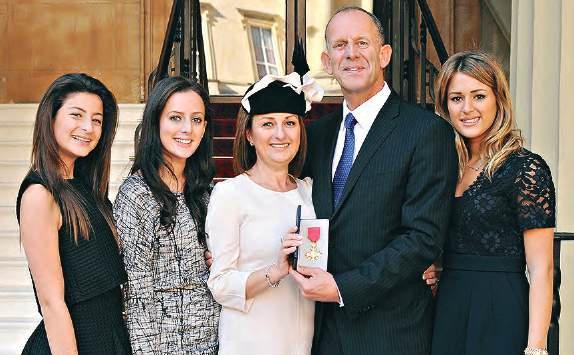
gave £1.65m – a figure Mark admits it “subsidised” to maintain despite lower profits. The Trust splits its donations between Jewish and Israeli charities and broader secular organisations. Beaverbrooks also provides additional support via emergency appeals and match-funding when colleagues are passionate about a cause.
Mark’s sense of responsibility is rooted in Jewish values. “On Yom Kippur, when we reflect on our fates, I think about negotiating from a position of strength,” he shares. “We’re told to be fair, not take advantage.” He adds: “We want our suppliers to thrive. It’s a symbiotic relationship. Fairness is core.”
This ethos extends throughout the company, which employs 1,150 people. Beaverbrooks encourages staff at every level to give back – offering each store a donation budget, time off for volunteering and matching contributions through a workplace giving scheme that sees 47 percent participation – nearly eight times the national average.
“I’m very proud of that,” says Mark. “It shows how much people buy into our philanthropic philosophy.”
Through this, Beaverbrooks supports a wide range of charities, empowering colleagues to make a difference in their communities. Colleagues are often encouraged to share stories of their impact, creating a culture of collective pride and mutual motivation that ripples across the business.
Beaverbrooks has consistently ranked among the UK’s Best Companies to Work For since 2004, “including being named second best the first time we entered. It changed how people saw us,” says Mark. Beaverbrooks has since come first twice (2021, 2009) and Mark has won the Best Leadership Award eight times.
Other highlights include being presented with an OBE for Services to Business and Charity in the North of England in 2015 by the late Queen Elizabeth II. Last year, he received a Lifetime Recognition Award from Best Companies for workplace commitment over 46 years. And in May, Mark – who has been the chair of the Jewish

Representative Council of Greater Manchester & Region (JRC) since 2021 – received a lifetime achievement award from the JRC, presented by Greater Manchester Mayor Andy Burnham.
“Can you combine purpose and profit?” he reflects. “For us, they’re intertwined. Without profit, we can’t give. Without purpose, there’s no reason to exist.”
At 66, Mark devotes 60 percent of his time to Beaverbrooks, and 40 percent to charity and civic work.
His civic involvement is extensive: Deputy Lieutenant, High Sheriff of Greater Manchester, and supporter of Mustard Tree, which combats poverty and homelessness.
Within the Jewish community, Mark chaired The Fed from 2009 to 2018,


oversaw its merger with Heathlands Village, and chairs the Jewish Strategic Group. He is the only non-London-based trustee of the Jewish Leadership Council.
As JRC chair, he champions crosscommunity bridge-building. “We have a duty beyond our own community. As Jews, the optics matter.”
He’s fostered relationships with political leaders, civic authorities and faith communities, including the Muslim community. “It’s been tough,” he admits, post-October 7. “Some brave, progressive Muslims are working with us to develop a joint statement – to sit down, hear each other’s pain, and learn to disagree respectfully.”
So, what’s the secret to thriving into a fourth generation – with two of Mark’s daughters already involved?
“Staying focused, aligned and in control,” he says. Family businesses can become fragmented. The Adlestones have bought out shareholders to keep objectives aligned. Today, 80 percent is owned by the family, 20 percent by the Charitable Trust.
Mark credits past partners too –especially the late Andrew Brown, who was instrumental in the company’s growth. “We’ve had excellent shareholder relationships. Andrew was key.”
Retail isn’t without challenges. Revenue dropped to £221m from £230m. “Last year was tough. Premium Swiss watch demand spiked post-Covid but slowed. The economy’s weak.” Still, the firm is targeting five percent growth. It has also diversified its online offering and is investing in customer experience, both in-store and digitally.
A member of Hale & District Hebrew Congregation, Mark says he’s “one of those Jews who goes to shul in the morning and football in the afternoon”.
A Blackpool FC fan, he enjoys sports including rugby, cricket and tennis and plays padel and racquetball. He keeps a strict routine – bed by midnight, up at 6am and managing his own diary.

He has also prioritised engagement with the Charedi sector, which comprises 40 percent of Manchester’s Jewish population. “To be representative, we must engage with the Charedi community,” he says. “My eyes have been opened to the amazing things they do.”
Back to business.

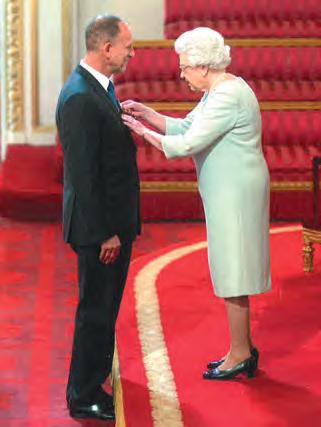

The company opened its first store, Adlestones, in Belfast in 1919, with a Manchester shop called F Hughes following in 1924. In 1935, the name Beaverbrooks was chosen for its British appeal. “Ironically, Lord Beaverbrook was Canadian,” Mark laughs. They were sued for the name but won.


The business now includes 57 Beaverbrooks stores, 23 monobrands (Tag Heuer, Omega, Breitling, Tudor, Longines) and three Loupe boutiques selling Rolex and luxury jewellery.


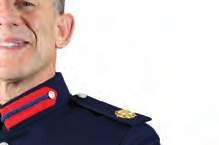
Mark is married to Gabrielle. They and wedding ring buyer for the marketing and B2C business the Beaverbrooks group), and Libby and four grandchildren.
Mark is married to Gabrielle. They have three daughters: Chloe (a diamond and wedding ring buyer for Beaverbrooks), Tara (who runs the marketing and B2C business for Mintini, part of the Beaverbrooks group), and Libby (who works in PR and events), and four grandchildren. He has no plans to slow down.



“I still want to be relevant passion for Beaverbrooks, community and generation of family
“I still want to be relevant at 100 years old – may it be God’s will.”
With his passion for Beaverbrooks, dedication to the community and the next generation of the Adlestone involved in the business, the legacy of this fourth-generation family firm looks set to continue.












Stunning gardens encircle a host of enchanting indoor and outdoor ceremony and reception spaces
A diverse range of delicious menus with seasonal home-grown, locally sourced food Wildower meadows and orchards create the perfect wedding backdrop and a haven for wildlife Impeccable service from our friendly, professional and experienced team
www.south-farm.co.uk | info@south-farm.co.uk | @south-farm1 | 01223 207581






5-Star Boutique Hotel with Classic Design
Glatt Kosher (Mehadrin) all Year-Round
Gourmet dining experience
Luxurious Rooms & Suites
Spa, Wellness & Indoor Pool
Synagogue & Mikvah on Site
Walking Distance to Old Town & Main Attractions







Alice Wairimu-Nderitu was the UN's advisor on prevention of genocide, but everything changed when she refused to describe Gaza
in such terms, writes Daniel Sugarman
Standing up for what you believe can be difficult enough – but doing it in the face of overwhelming pressure takes courage. For Alice Wairimu Nderitu, former United Nations Special Adviser on the Prevention of Genocide, speaking truth as she saw it ultimately cost her her position. But she doesn’t regret a word.
On October 15, 2023, just days after the horrors of October 7, Wairimu Nderitu released a public statement. It was a principled, balanced document in which she condemned “multiple and coordinated attacks” by terrorist organisations within Gaza, describing them as “unacceptable” and “inexcusable”, while also acknowledging “the loss of civilian lives resulting from Israeli bombardments in the Gaza Strip”, and calling for “all possible measures to protect those… most vulnerable”. She urged the release of Israeli hostages and noted “the vulnerability of Palestinian and other civilians… in light of ongoing and escalating risks of violence irreversibly affecting them”.
This wasn’t a spontaneous outburst. It was a carefully-considered and discussed
declaration. But it would trigger a series of consequences that would change her life – and send a warning to anyone else at the UN who dared to walk a similar tightrope. Looking back, she’s clear: “If we went back to October 7, I would issue the exact same statement.”
The first indication of internal UN pressure came when one of Wairimu Nderitu’s team told her a junior staffer had criticised her statement. The staffer, a Palestinian, then emailed her directly, copying in other Under-Secretary Generals, questioning whether she had considered the UN’s reputation when issuing the statement.
“This was somebody five or six times my junior. It was shocking,” she recalls. Senior UN colleagues told her they would take care of it. But she kept receiving critical messages from junior UN employees. Simultaneously, media outlets – Wairimu Nderitu specifically mentions Al Jazeera, Al Arabiya and Chinese State media – began regularly using UN press conferences to target her. “They would ask a very specific question, and they would really draw it out. ‘Why isn’t she calling the situation in Gaza genocide?’”
Spokespeople repeatedly made clear the UN’s official position was not to refer to a conflict as a genocide unless designated as such by an international court such as the International Court of Justice (ICJ). The media did not accept that.
“It kept going, on and on,” she says. “They built that pressure. They literally created the justification for ‘she must go’.” One of those reporters, she says, later spoke at Rutgers University.
“He mentioned me and Pramila [Patten, UN Special Adviser on Sexual Violence in Conflict] who went to Israel and wrote a report about what had happened. He said the UN has been infiltrated by Zionists, and he named both of us.”
On December 9, 2023, Wairimu Nderitu hosted an event marking the 75 years since the creation of the UN Genocide Convention. That same day, a public petition launched, falsely claiming her original statement had “failed to acknowledge Israel’s overwhelming violence against Palestinian civilians”. It demanded the UN investigate her conduct and called for her resignation. Shortly afterwards, the death threats started.
“I felt sorry for my family”, says Wairimu Nderitu. “When all the threats were coming in, they were very concerned – many were on social media, so they could see them. The pressure was very intense.”
Within the UN, she was being told perhaps she should issue a statement on genocide in Gaza to prevent further attacks on her.
“Colleagues were telling me, ‘What will it cost you just to put up a statement and say you see clear risks of Israel perpetrating genocide?’ And I kept
telling them, ‘No, no, no.’”
It is clear she is deeply troubled by the total lack of focus on any other world crisis; in particular, Sudan.
“I interviewed people from Darfur. I briefed the Security Council; I told them, ‘My role is to identify risk factors for genocide, I’m telling you every single risk factor for genocide exists in Sudan.’ I gave them granular details of who was killing who there. And I told them, ‘You have to act, because one day you’ll be held accountable for not acting.’ I went to Geneva and briefed the Human Rights Council in great detail.”
I ask whether there was any action. “Nobody, nobody.”
The media prioritisation was clear.
“They would ask about Gaza every day; I would say, ‘People are dying in other places too.’ I was issuing statements about Myanmar, South Sudan, the Sahel, the DRC [Democratic Republic of Congo], places where risk factors for genocide clearly existed, people dying in different parts of the world. No journalist asked about these,” she says.
Wairimu Nderitu looks at me. “You know, South Sudan is on the verge of a genocide right now. In terms of Sudan, it is already being perpetrated; in South Sudan they are very close.”
She describes the actions of the Rapid Support Forces (RSF) paramilitary in Darfur, who have killed tens of thousands.
“It was racial. Those killed were darker-skinned. When I went to the [refugee] camps, they would talk about being referred to as ‘slaves’. I remember going to Yale, and satellite imagery showing us all the mass graves in Sudan and how attacks happened.”
Weeks after South Africa brought its case against Israel to the ICJ, its President welcomed the RSF’s leader to Pretoria.
“The ICC [International Criminal Court] has not indicted anyone for what’s going on in Sudan now. The indictments that exist are for what happened in Darfur more than 20 years ago. If that ever happens, or if the ICJ decides to take up the issue of Sudan the way they’ve taken up Israel and Gaza, there is so much evidence a genocide is in the
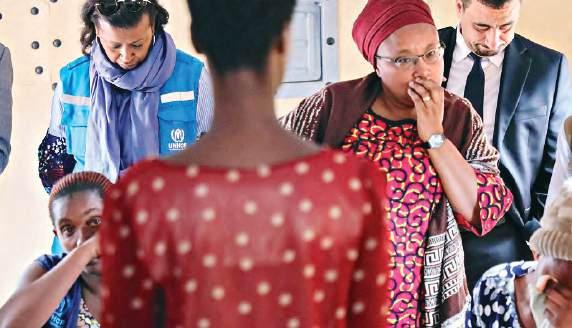
course of being perpetrated.”
Two weeks after our interview, the ICJ rejected a case accusing the United Arab Emirates of complicity in genocide in Sudan, claiming it lacked jurisdiction.
Wairimu Nderitu speaks candidly about the UN’s lack of focus on the region. “If you analyse speeches and statements from various UN agencies, and their websites, what flashes up is all Gaza-focused. In Sudan, there’s almost zero UN presence on the ground, especially in Darfur; so many are dying of hunger. Isn’t that a place we should be seeing things flashing up, saying this is going on? Do people assume that ‘if Africans are fighting, they should just be left to fight’?”
It is clear she sees a double standard. But then I ask her, the former UN Special Advisor on the Prevention of Genocide, the question I have been wondering.
“You mentioned you briefed different UN councils and said that with Sudan, every single prerequisite that could lead to a genocide had been fulfilled. Did you feel differently about Gaza?”
She thinks carefully.
“When the Polish Jewish lawyer Raphael Lemkin coined the word genocide, he called it ‘the crime of crimes’. In any court of law that tries genocide, the intention ‘to destroy an ethnic, racial, religious or national group in whole or in part’ has to be proved. Genocide is a crime of intent.
“You have to be very, very careful before you say, anywhere in the world, that anybody is at risk of genocide, unless you are sure intent can be proved. And the clarity I had for Sudan, I did not have
it for Gaza because, as in any war, from the position I held in the UN, there are legal and moral issues to consider.”
She sees the situation in Gaza as an armed conflict. “Morally, nothing can justify the deaths of innocent civilians, both Palestinian and Israeli; my heart weeps for what is happening to them.
“I’m a mediator… by training, I’m trying to look at both sides. It was quite instructive for me to see it was those who wanted to spread the narrative that Israel is perpetrating a genocide who were accusing me of bias.”
By late 2024, it became clear the UN would not renew her tenure. To many, this seemed because of her refusal to describe the Israel-Hamas war as a genocide. But despite the fallout and her subsequent departure from the UN, Wairimu Nderitu remains resolute.
“In the last meeting I had with my staff, I told them, ‘If October 7 happened today, I would issue the exact same statement’. In time, more people will look at this with an understanding of how… international organisations can be speaking consistently about one war and not others,” she says.
“If we get a critical mass of people to see that, people will understand I was right; [Gaza] is an armed conflict. And in any conflict, we are supposed to look at it in terms of how we end the conflict, by mediating, by not taking sides.
“The UN says it believes in a two-state solution, which as a mediator is not possible unless we listen to both sides and understand the root causes of this armed conflict. That’s what the UN was created for.”
'Sudan is on the verge of genocide right now'

Awnings
Contact
020 8868 7899 henry@rigbyfires.co.uk www.rigbys.com
020 8868 7899 henry@rigbyfires.co.uk www.rigbys.com
020 8868 7899 henry@rigbyfires.co.uk www.rigbys.com
020 8868 7899 henry@rigbyfires.co.uk www.rigbys.com
8868 7899 henry@rigbyfires.co.uk www.rigbys.com










Enjoy the best of Hendon with shops, cafés, and great transport links, all while relaxing in your own peaceful, modern apartment. Be part of a welcoming close-knit Jewish community, with meaningful events, high-quality care, and a real sense of belonging.













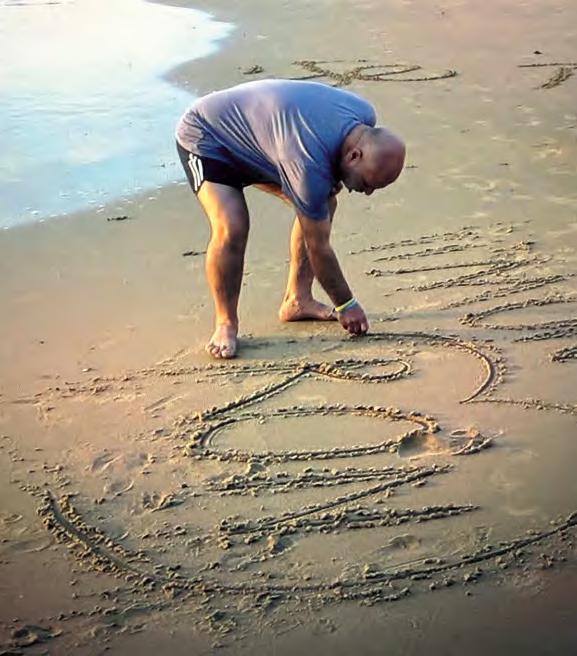




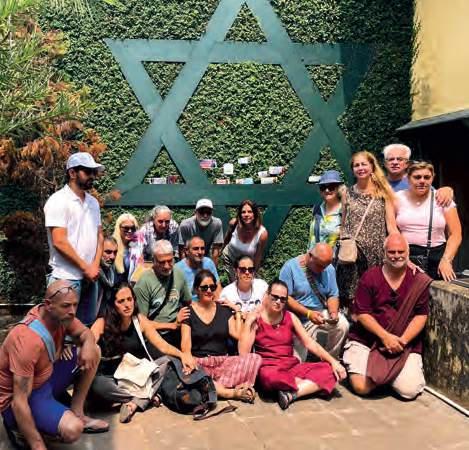
In the wake of unthinkable loss, a group of Israeli parents travelled to India in search of healing –and their children. By Brigit Grant
On a quiet beach in southern India, a group of parents gathered at the shoreline, each of them writing their child’s name in the sand – names of sons and daughters murdered at the Nova music festival on October 7, 2023.
As the waves crept in, one name vanished before the rest. Ron.
Yoram, Ron’s father, stood in silence.
“It hit him hard,” one parent recalled. But the moment wasn’t just metaphor. It was memory.
Ron Yehudai, 25, had also been erased. Not by nature – but by terror.
As the massacre unfolded, Ron sought refuge in a rubbish container alongside 15 others. Hidden and silent, he texted his father. At 11.39am, he sent Yoram a message: “Everything is okay, I’ll keep you updated.”
It was the last time Yoram would hear from his son.
Seven minutes later, Hamas terrorists




discovered the group. Nine people, including Ron, were murdered on the spot.
“I carry him with me,” says Yoram. On his leg is a tattoo – a perfect replica of one Ron had inked on himself. “I carry him on my skin. And in everything I do.”
Yoram didn't come to India because it was a dream trip they had planned together. He came because Ron never would.
The spiritual trip was organised by A Good Land, a volunteer therapeutic space established in the Sitria moshav by Einat Haimovitch, Liron Davidov and Yiftah Shahar after October 7. The trip was offered to bereaved parents as a chance to heal – or just somewhere new to grieve.
Once in what Yoram now calls “Mama India”, the group looked for signs of their children – and his came on a hike towards Mount Arunachala.
At the foot of the hill – on a screen nearby, a 7Up advert played. And every

ABOVE: Ron Yehudai’s father Yoram writes his name in the sand at retreat for parents of victims of October 7; The parents at the Kochi synagogue on the trip organised by Good Land












member of the group immediately spotted that the man in the ad looked just like Ron. Same posture. Same gentle grin. He was even wearing a yellow shirt – Ron’s favourite colour as a devoted fan of the Beitar Jerusalem football team.
“That was my sign,” said Yoram, who posed beside the hoarding with a smile that delighted some of the accompanying empathetic Good Land team.


Yoram continued to look for more connections to his son, but found solace in the people. “They were so kind when we told them who we were. A Tuk Tuk driver listened to my story then asked if he could put a sticker of my Ron on his dashboard, ‘so he’ll ride with me.’ It meant everything. The smallest gestures – they stay with you.”




Yaira Gutman, mother of October 7 victim Tamar, almost didn’t go on the trip. “I didn’t want to travel with them,” she says. “I was avoiding people – even just going for coffee. I needed to be alone.”
But someone from the group asked one of her other daughters to convince her. She did.
and full of life.
The charm of India was not lost on Yaira and Yoram, and they knew when waking each day that they weren’t alone.
Los Angeles to Israel in 2010. After losing Roya, they campaigned for the hostages, hoping Norelle was still alive – until they were told she was dead during a Zoom call with President Joe Biden.

“Now I’m so happy I went,” Yaira says. “It was so important for me.”

Tamar was the youngest of Yaira’s four daughters. She was studying law. She loved family and beauty, and called her mother constantly.
“She used to call me two or three times a day. Now I travel with her photo. I open it when I miss her. I talk to her in my heart.”




For among the group was Dudi Saidi mourning his son Zur, 29, who had planned to propose to his girlfriend during a trip to Australia. Zur died with his childhood friends Omri Ram and Aviad Halevi, shot while fleeing in a car.
Menashe Ram, Omri’s father, was in India, too, as were Rita and Menashe Uri carrying the loss of son Ben, 31, a veteran of the 2014 Gaza war, who suffered from post-traumatic stress disorder. Ben recorded himself meditating in a sewage pipe before he was killed.
“I think about that father who lost both daughters and a son-in-law,” says Yaira. “He told us: ‘The day before, I had a family. The day after, my house was empty.’ How do you live with that?”
Tamar had endured serious illness –Crohn’s disease and a tumour in her brain membranes – but she was joyful
Manny Manzuri lost both daughters: Norelle, 25, and Roya, 22, who were murdered alongside Norelle’s boyfriend Amit Cohen. The Manzuris moved from
Living with the knowledge that their son, Dvir, 23, was murdered after returning to help others is what group members Hagit and David Rahamim have to do, and sharing the agony is Ilana Arbiv, mother of 21-year-old paratrooper Ofek, and Orly Ben Yehuda, whose daughter Yuval, 26, snuck out while she slept, hoping to spare her mother worry.




LEFT: Yoram’ s leg with Ron’ s tattoo and the 7Up ad ABOVE: Yoram with a photo of Ron
The need for worry has passed, replaced by agony that for more than 600 days has consumed mothers such as Gania Alkind, who was in Germany when her son, Arieh, texted from the Nova festival. She didn’t know he was at the party, but in his voice message he told her he had been shot and she heard his last breath.
Bella Habani, in India without her husband, knew he would be at the weekly meeting with friends of their murdered 21-year-old daughter, Shaked. On October 7, as she hid from the terrorists, Shaked replied to army buddies on WhatsApp who wanted to set up a meeting. Shaked posted two options: “A. I’m coming no matter what; B. I’m not coming, I loved you all, but you can’t bring back the dead.”
Together, the Good Land group

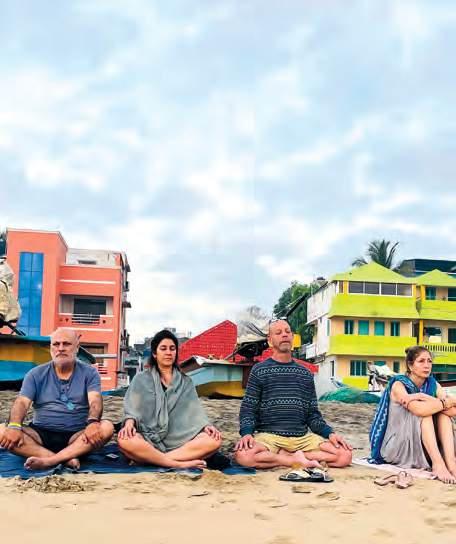

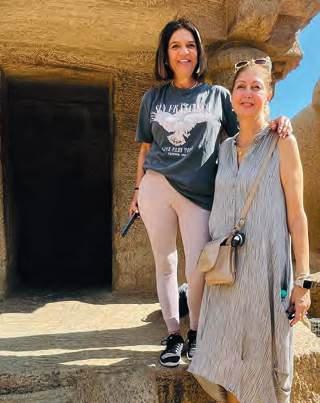
‘No phones. No news. Just India. Just us. Our pain. Our children’
journeyed from Chennai to Kochi. They circled sacred mountains, prayed in ashrams, planted trees, danced with strangers and said Kaddish in the ancient synagogue of Fort Kochi.
In Mahabalipuram, they were welcomed by sculptors. In Auroville, they explored a utopian vision of community. On the beach, they held a night ceremony for their “beloved flowers”.
“We were in a bubble,” Yaira says. “No phones. No news. Just India. Just us. Our pain. Our children.”
She began to notice life again. “I started putting on make-up. I looked in the mirror and asked, ‘Does this shirt fit?’ Before, I didn’t care. But in India… I started to feel like a human being again.”
She pauses. “I heard birds again. I hadn’t heard birds since Tamar…”
When the parents returned home, Yoram was among the impassioned group who, in March, tried to attend a parliamentary debate at the Knesset. They wanted answers with dignity, not confrontation, but when only 10 individuals were permitted entry, tensions escalated. Grieving father Yoram was thrown to the ground by security officers.
Yoram tries to avoid the news and Yaira can’t stop watching, but the world’s

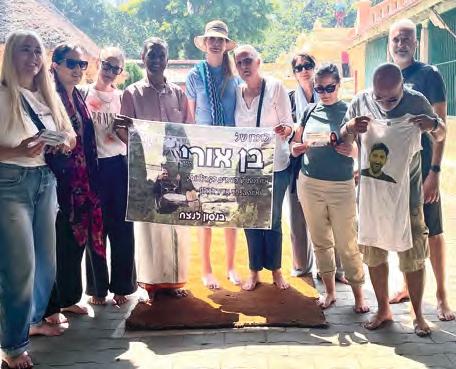
ABOVE: The group holds a poster and a T-shirt of Menashe
misunderstanding stings.
“People chant ‘From the river to the sea’ – but they don’t understand it means no place for us. That’s genocide,” says Yaira, whose husband didn’t join the India trip. “He says when he’s with the other parents, he sees his own face – and he can’t breathe.”
At first, Yaira was angry. “But I understand now. He feels he didn’t protect Tamar. He never says it – but I know.”
Sigal, Yoram’s wife and Ron’s mother, also didn’t go to India – she wasn’t ready, but commemorating her son’s memory at a Knesset event, she carried a framed photo of him and a bouquet adorned with his favourite slogan: “You only live once, just f***ing do it.”
Adi Fainaru Kotler, a film-maker, decided to join the group at the last minute. “Beyond documenting this emotional trip, the camera became a significant therapeutic tool,” she says.
“There is a sense that the topic has been thoroughly explored. But this isn’t about the massacre. It’s about parents who lost everything – and still choose to live.”
Yoram calls it a chapter. “One chapter in a long journey that began on one day – October 7 – and will continue until our last.”



WED 18TH JUNE
TUE 24TH JUNE
WED 9TH JULY
TUE 1ST JULY MON 14TH JULY
WED 23RD JULY
training@projectlily.org.uk
Honorary Patron: Lady Elaine Sacks

BookYourself AHugToday!
We’re in the business of improving people’s wellbeing.That’s why our free, stand-alone 50-minute online training sessions give you invaluable knowledge and skills to help you take care of yourself and others.


Self-Care and Stress Management
Reaching Out to Someone Who’s Struggling
Stress-busting Practical Relaxation Session
Introduction to Mental Health Understanding Mental Health Conditions
Reaching Out to Someone Who’s Struggling
Trustees: Rabbi Danny Kirsch, Dr Lisa Kagan, Mr Eli Seliger


As we gear up for a summer bursting with blockbuster exhibitions and gallery openings, it’s easy to get swept up in the big names and bold canvases. But closer to home, in the heart of the community, is a space where art isn’t just something to admire – it’s a lifeline.
Founded by artist Adrienne Konviser, Art Hub LDN is a creative studio offering workshops and classes for children, adults and families. The Hub, which welcomes more than 200 people each week, champions art as a tool for emotional wellbeing, mental health support and personal growth.
Whether it’s a child building confidence through colour, an adult finding calm in the flow of paint, or families reconnecting away from screens, the Art Hub shows how powerful creativity can be.
Adrienne launched Art Hub LDN from her garden in 2017 and last year moved to a larger studio in Mill Hill. She says: “I set up Art Hub because I wanted to create the kind of space that I was searching for myself – somewhere people could

Creativity and calm are the essence of an art studio in London. By
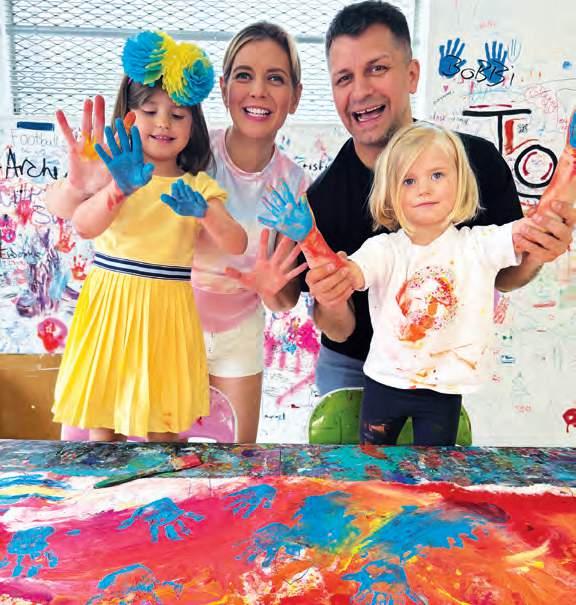
create without judgment or pressure. Art has always been my therapy, and I saw how powerful it could be for others too. My mantra is simple: art is for everyone.”
Rachel Riley met Adrienne at a children’s party, where her daughters Maven, five, and Noa, three, were drawn to the arts and crafts table that Adi (as she is known) was running. Not long after, Rachel and her husband, Strictly Come Dancing ’s Pasha Kovalev, booked a family session, where Adrienne guides families to create a collaborative large-scale canvas to hang in their home.
“You don’t need to be artistic,” says Rachel. “I was worried we’d create something we wouldn’t want to
ABOVE: Rachel Riley and her family created a piece of art for their home
LEFT: Adrienne Konviser in her studio.



hang up, but it turned out beautifully. We included our initials, Magen Davids, silhouettes of the girls… it’s a meaningful piece that we will love having on our wall.”
Rachel says it was a chance to see her daughters’ personalities shine through. “One of them got stuck in straight away, hands covered in paint, while the other waited for instructions. ”
Adrienne’s studio motto reads: “Trust The Process”– and, for families like Rachel’s, that process is proving to be as powerful as the art itself.
FAR LEFT: Georgia Cantor at work; LEFT: Asher Daleski finds the art studio his “safe zone”; BELOW: Adi with Kate Lawler
the Hub after a friend raved about the family session they had done. Kate loved “the idea of creating a piece of art with my family that we could frame and put on the wall”, adding: “Once I saw the incredible pieces Adi had helped other wwfamilies create, I booked straight in.”
Kate says the session was a “fun and interesting experience” in which the focus was on freedom, connection and creativity.

For nine-year-old Asher Daleski and his family, Art Hub LDN has become a “safe zone where he can thrive”, says his mother Steph.
Following an ADHD diagnosis, Asher has attended regular art classes and holiday camps at the Hub. “Under the expert guidance of Adi, he’s blossomed both emotionally and artistically. When he enters the space, he becomes enriched – anxiety fades and self-confidence shines. He is able to self-regulate so much better after an art class.”
And it’s not just Asher who attends sessions: his 63-year-old grandmother Martine Wulfsohn also takes part. “It’s a gorgeous experience that they share and chat about,” says Steph. “They write love letters to each other on the walls of the Hub.”
Tessa Samuels was around seven months pregnant with her second son when she started going to the Hub. Although she didn’t realise it at the time, she was struggling with depression. “Adi asked me if I was okay and suggested I see my GP. I was able to start getting the help I needed,” Tessa shares.
Tessa found the Art Hub a welcoming, judgmentfree space but, at first, she struggled to create. “I wasn’t myself and I couldn’t produce the work I had done previously.” But through Adi’s encouragement and ‘process art’ exercises, she “soon found myself creating abstract pieces that were my own”.
After her son was born, Tessa experienced postnatal depression, and the Hub became a refuge. “It was a dark time. The colour and space Adi provided each week was my escape.”
During the Covid lockdowns, Adi offered a vital lifeline through art and connection by taking clients online.
TV presenter Kate Lawler was inspired to visit
BELOW: A friend inspired Kate Lawler to take her family to the Art Hub LDN
Mum-to-be Georgia Cantor, 28, found her way to the Art Hub during a challenging period early in her pregnancy, when severe nausea often left her unable to leave the house. “It was tough physically and eventually became difficult mentally too,” says Georgia. A friend who was attending regular sessions suggested she come along.
“I hadn’t picked up a paintbrush in 10 years, but remembered how much fun and meditative I used to find it, so I felt it was a perfect time to get back in front of the canvas,” she says.
Beyond rediscovering her creativity, the Art Hub provided Georgia with “a sense of community and a creative outlet when I was struggling to interact with people,” she says. “The two-hour bursts once a week were so cathartic and just what I needed.”
Reconnecting with painting made a big difference to her mental wellbeing. “I was able to completely immerse myself in the paints and colours and remember why I’d loved painting so much.”
Caroline Lisberg started going to the Art Hub in 2023 after the sudden death of her mother. Looking for a way to feel closer to her, Caroline turned to creativity – something her mother had always loved.
“At my first session I ended up in tears trying to explain why I was there. Adi has this amazing way of making you feel like you can do anything – even when you’re convinced you can’t. She kept encouraging me to ‘trust the process’, as she always says. I’m no Picasso, but I truly believe that everyone has a bit of creativity inside them and, with Adi’s help, you just might find yours too.”

The Grove has long been known for offering more than your typical country house retreat.
But this summer, the estate’s Walled Garden has undergone a transformation and it’s fast becoming one of the season’s most talked-about escapes.
Designed with the carefree spirit of summer in mind, the Walled Garden now feels like a destination in itself. At the centre of it all is Ralph’s Beach, where hotel guests can stretch out on a daybed with a cocktail in hand, cool off in the heated outdoor pool or book in for a treatment at the open-air Sequoia on the Beach spa area.
The daybeds – available in Family, Laid-back and Luxury styles – come with thoughtful touches, such as snacks, cocktails and a revitalising face spray, bringing a boutique beach club vibe to the countryside.
Families will appreciate the new shaded play area that has been added so that younger guests can run around and explore safely while adults lounge poolside or enjoy a bite to eat at Ralph’s – a casual spot serving up salads, sandwiches, ice cream and other summery snacks.
The Grove has also partnered once again with Everyman for its open-air cinema experience, Everyman in the Garden. Running from 23 July to 7 September, the programme features everything from family favourites to nostalgic classics and rom-coms. Live pre-film performances add a touch of theatre to the experience, while vibrant

installations by artist Yinka Ilori MBE provide a colourful visual backdrop.
For those who enjoy dining with a difference, there’s something new on the evening menu too. Skewd, a pop-up restaurant with Anatolian influences, is serving a flavour-packed menu from its corner of the Walled Garden – think lamb shish, honey-glazed goat’s cheese and mini lahmacun, all cooked over fire. A live DJ plays on Friday and Saturday evenings, adding to the sense of laid-back celebration.
Whether it’s a midweek escape, a weekend with the family or a romantic overnight stay, the atmosphere at The Grove this summer feels deliberately unhurried and full of personality. It’s stylish without being stuffy and luxurious yet open to everyone – whether you’re there for a spa treatment, a swim, a

cinema night or just an afternoon in the sun.
In a season during which we all crave a little more joy and a lot more fresh air, The Grove’s reimagined Walled Garden offers both in generous supply. And being so close to London, it’s the kind of place you can return to again and again.
thegrove.co.uk




Over the past five years, Fiducia Properties has managed properties on behalf of international clients through a leading law firm based in Tel Aviv. During this time, we have supported numerous foreign homeowners – whether they’ve inherited property in Israel or invested in real estate here – who often face significant challenges due to language barriers, distance and unfamiliarity with local systems. These obstacles frequently result in underutilised or poorly-managed properties, leading many owners to miss out on the full potential of their investments.
Recognising this widespread need, we
founded Fiducia Properties as an independent property management company dedicated to serving non-resident homeowners in Israel. Our mission is to be your trusted local partner – ensuring your property is professionally managed, consistently rented and meticulously maintained. Beyond property management, we also assist clients in purchasing real estate. Thanks to the strong network we’ve cultivated over the years, we offer access to a wide range of properties and exclusive investment opportunities throughout Israel.
Fiducia Properties—your home in Israel, professionally cared for.
fiduciaproperties-israel.com
Saskia Joss tells Sarah Miller how we can help ourselves to help our anxious children
Some children are naturally fearful of just about everything – but Saskia Joss was not one of them.
She recalls with glee how her mother, TV and radio presenter Vanessa Feltz, would often find the youngest of her two daughters halfway up a tree or about to jump off a high plinth.
“Mum used to say that when we went into hotels, I’d suddenly disappear and be sitting on the counter at the desk. She would tell me off, saying ‘For God’s sake, come down, come on.’ I was always climbing something.”
Years later, Saskia, 36, has channelled that fearlessness into a mission to help children overcome anxiety. A former primary school teacher, she now works as a qualified child therapist at the Mill Hill Therapy Hub in north London.
She ha s seen referrals skyrocket, with mental health cases among children rising from almost 100,000 pre-Covid to
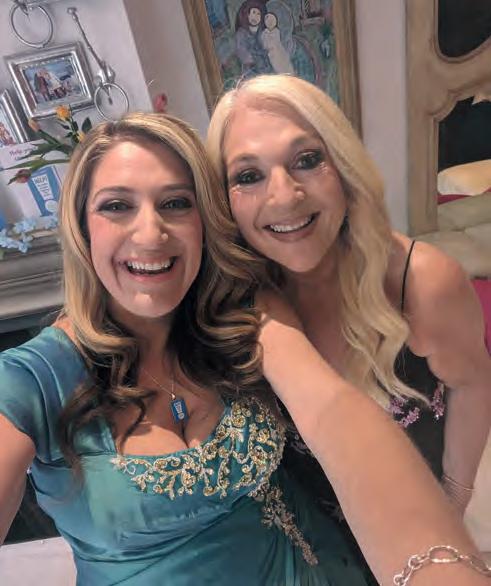
more than 20 0,000 in 2023–2024. And within the Jewish community, the events of October 7 have intensified this surge.
“It’s had the most profound impact on children in the most obvious ways,” says Saskia, who was contacted by many parents whose children were having nightmares about kidnappings or were anxious about relatives in Israel.
Her new book, Help! My Child’s Anxiety Is Giving Me Anxiety, couldn’t be more timely. With warmth and clarity, it outlines tools for parents, including the idea that the antidote to anxiety isn’t calm – it’s safety.
Saskia also stresses how anxious parents can make anxious children.“I was a sing-while-they-play kind of kid,” she says. “I felt safe inside. My mum is a very good parent – very sensible, but also lots of fun and very positive.”
Not every child has that kind of inner resilience, she notes, and modern childhood comes with extra threats.
Aren’t you sick of the noise of 24/7 news, bulletins, opinion, debate? The Middle East comes at us from every speaker and we wake up to hear raging about Greta not getting arrested with an Aperol spritz. It’s exhausting, endless and leaves no room for joy.
If you need a reprieve, go to the quieter corners of the podcast world where Jewish voices talk about other things. About family, fashion, pets and perfume. Have a break from the news with Bella Freud’s Fashion Neurosis.
The granddaughter of Sigmund offers a little therapy (obviously) and some glamour with guests of the Kate Moss kind. They lie on a couch while Bella unpicks the emotion in their clothes.
If you’ve got little ones, Raising Jewish Kids with Evelyn Goldfinger turns parenting into performance art with storytelling, music and advice about moulding them into menches.
Find the laughs with Rachel Creeger and Philip Simon’s Jew Talkin’ to Me? and Debra Tammer’s Oy Vay to Z .
“All the usual worries are still there – being good enough, illness, divorce – but now we have social media, TikTok, YouTube, gaming apps like Roblox, where predators might be. Kids are exposed to so much more.”
And the pandemic, she says, left a lasting impact. “Our collective feeling of safety was violated. People were dying. Germs were invisible. The idea that you or someone you loved could die became amplified. Things didn’t return to normal for a long time.”
In Jewish schools post-October 7, the anxiety hasn’t eased. “There’s been a constant drip feed of scary information – photos of hostages, yellow ribbons. Even if kids weren’t directly affected, it’s made them feel unsafe.”
Her advice to parents? Address misinformation. “Children fill in the gaps with scary things. We need to calmly explain what’s real, what’s not – and help them feel safe.”

Synagogue politics, guilt or the state of your knees after 40, if your chuckle brothers are busy, these witty people will tell you how to survive a Friday night dinner with extended family. Or mute it with Mazel Pups, a podcast made for Jewish and Jew-ish dog lovers hosted by Rabbi Robyn Frisch. Expect emotional support schnauzers and Hebrew names for pets.


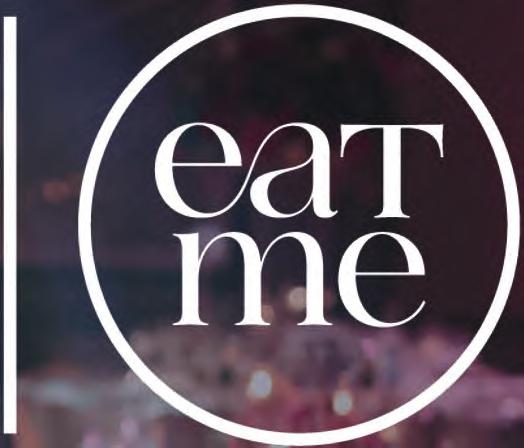







When war interrupts education, most institutions scramble to adjust.
But Israel’s Technion – the country’s oldest and most prestigious technological university – didn’t just adjust: it stepped forward and wrapped its arms around students and staff pulled into reserve duty during the Gaza war.
In recognition of this, Technion has been awarded one of the nation’s highest civilian honours – the 2025 Defense Shield. The university is no stranger to accolades for its research and innovation, but this award – for its support of reservists among students and staff – was due to be presented at a ceremony in May attended by Israel Defense Force (IDF) Chief of Staff Eyal Zamir and Chief Reserve Officer Brigadier General (Res) Benny Ben Ari. The cold irony is that the ceremony was cancelled because of the war – a fact not lost on students-turned-soldiers whose lives are on hold.
One is Rachel, a data science engineering student, a captain in the IDF, and one of more than 1,000





Technion students who served more than 150 days in the past year. Over 500 passed the 250-day mark.
“Since the war started, I didn’t have much motivation to go back to studying,” Rachel admits. “I was doing 25-hour shifts every week. But Technion was the only university that really saw what was happening.”
W hile others postponed the academic year’s start to December 2023, Technion went further. Knowing many reservists wouldn’t be demobilised by then, it delayed the term until 14 January 2024.
“That made all the difference,” says Rachel. “I talked to others in my unit at

different universities — Technion beat them all.”
Support didn’t stop with scheduling. Academic accommodations, tutoring, financial aid and emotional care were all offered. “Whatever we need, we have its support,” she says. “Other universities aren’t doing that any more.”
T his care extended into the smallest details. “They gave us tutors for certain courses. Even if you didn’t quite qualify, they still helped. There was almost always a solution.”
T he result? Rachel is on track to graduate a semester early, in winter 2026. “Instead of a Passover break, I did reserve duty. I didn’t really breathe, but Technion made it manageable. Now I’m enjoying the coursework – and I’m not behind.”
W hat makes the Technion’s response so remarkable is not just its scale but its tone. As Rachel puts it, the institution didn’t wait for students to ask – it reached out first. “The president, Professor Uri Sivan, is a former air force pilot. I met him at an event and asked if he had studied during wartime. He said, ‘I get you guys. You’re all my kids.’”
It’s this shared understanding that has driven Technion to go above and beyond. “Everyone’s life fl ipped,” Rachel says. “But here, everyone gets it. Just being here feels meaningful. We’re here because of the IDF.”
Now she’s even considering rejoining the military after graduation. “The war changed me. I don’t think I can do something that’s not for the country’s security.”
Sivan summed it up simply: “The Defence Minister’s Shield is a

recognition of the tremendous effort the Technion invests in supporting its reservists. Above all, it expresses our gratitude to the academic and administrative staff, and most importantly, to our students.”
In a period that has shattered lives and redefined what it means to study in Israel, Technion has emerged not just as a university, but as a second home – one that stands with its students, in and out of uniform.
If there is one thing that the Technion University, on its sprawling Haifa campus, is famous for, it’s that every faculty, no matter the discipline, has professors and students thinking ahead of the curve. On a recent Technion UK mission to Israel, we were introduced to two professors inspiring their students – and supporters – in two of the most vital subjects facing modern society. One is tackling the present-day plague of cancer; the other, the complex world of food and its technology, giving rise to previously unthinkable solutions – such as artificial meat, recently ruled kosher by the Israeli rabbinate.
It would not be an exaggeration to say that Moroccan-born Professor Marcelle Machluf wowed her British visitors, as much for her clarity in explaining complex processes as for her wry sense of humour. Now dean of the Faculty of Biotechnology and Food Engineering,
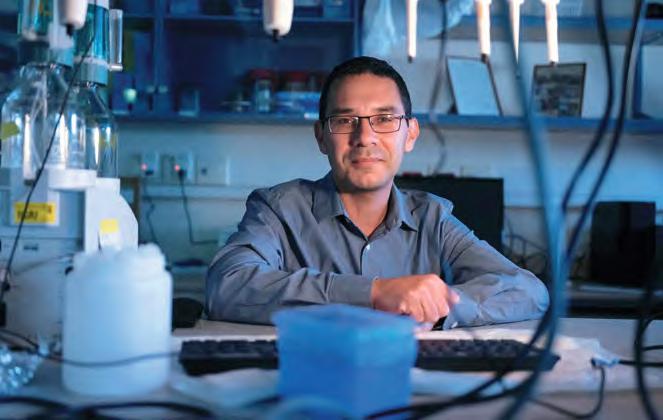
she had a rocky start after army service, having not been accepted to medical school. She studied biology instead, becoming a fellow at Harvard Medical School, focusing on gene therapy, tissue engineering and drug delivery in cancer therapy. Today, she’s one of the most in-demand faculty members, juggling research with limited appointments.
T he faculty she heads includes the Carasso FoodTech Center, a state-of-theart lab. She says: “The faculty is one of the only ones in the world that combines the disciplines of bioengineering, technology, food sciences and life sciences. Coping with the Covid-19 pandemic only emphasised the importance of food and biotechnology in maintaining our existence and meeting future existential challenges.
“To address the many challenges in this field... we need advanced infrastructure... to develop the necessary technologies, as well as the infrastructure and equipment that will support the development and assimilation of the knowledge required to tackle tomorrow’s food challenges.”
A major part of her work is cancer research – what she calls “a guided missile to target cancerous tumours.”
She co-created a drug delivery system with NYU called NanoGhost,

using modified stem cells that carry medication and trick tumours –hence the “ghost.”
Her ambition is “to make cancer a chronic disease such as HIV, which can be treated accordingly”. She launched the NanoGhost start-up to develop and fund the system.
Named Lady Globes Magazine’s Woman of the Year in 2018, she is also Adjunct Professor at Singapore’s School of Material Science Engineering. Her second start-up, MeatAfora, is focused on cultivated meat.
“We believe our cultivated meat will provide nutritional security, as well as increasing food safety worldwide.”
T he firm uses cells derived from bovine umbilical cords to develop its product. Working closely at the Food Innovation Center is her colleague Associate Professor Uri Lesmes. Colombian-born and known for his humour, he asked British visitors what distinguishes humans from other species. Suggestions included joketelling. His answer? “Humans are the only species that cooks.”
Lesmes and his team are developing sustainable, personalised alternatives to modern diets. A key project, EAT4AGE, funded by the EU, aims to create appealing, nutrient-dense meals for older adults.
Lesmes heads the Laboratory of Food Chemistry and Bioactives and leads Israel’s pan-European accelerator for food start-ups. His shelves are fi lled with samples – juices, meat hybrids, even ice cream made with silkworm pupae. He is also experimenting with algae: spirulina-enriched falafel, for example.
His work on carrageenan – used in yogurts, meats and plant milks – found potential risks for infants and the elderly via bioreactor testing that mimics digestion.
A nd these are just two of the remarkable breakthrough scientists at the Technion. Imagine if we had access to them all.

Choosing end-of-life care for a loved one is one of the most emotional and difficult decisions any family will face. You want to honour their wishes, ease their pain, and make sure every moment counts—but navigating care systems, providers, and medical teams can quickly become overwhelming.
At SweetTree Home Care Services, we believe no family should have to manage this alone. Our specialist palliative Live-In Care service is built around one core mission: to bring comfort, dignity, and expert support into the heart of your home—while taking the logistical burden off your shoulders.
We Coordinate Everything So You Can Focus on What Matters
End-of-life care is a deeply personal experience, and at such a sensitive time, families should be able to focus on being present with their loved one—not having to juggle paperwork, medical appointments, and care schedules.
That’s where SweetTree makes a meaningful difference. We take full responsibility for coordinating all the moving parts of your loved one’s care—whether that’s liaising with GPs, specialist clinicians, district nurses, social workers, or equipment providers. From arranging new equipment and home adaptations to syncing visits across multiple services, our dedicated team ensures nothing falls through the cracks.
Our specialist carers are trained specifically in palliative care, not just in theory but in compassionate, practical delivery. Their training includes understanding the stages of advanced illness, recognising subtle changes in needs, and knowing how to provide emotional support for both clients and families. They’re not just carers—they’re advocates, companions, and trusted professionals.

Remaining at home during the final stages of life can be profoundly meaningful. Familiar surroundings, cherished routines, and a sense of autonomy offer deep comfort for individuals facing a terminal illness. Live-in hospice care from SweetTree provides:
• 24/7 one-to-one care tailored to evolving physical, cognitive, and emotional needs—we can provide specialist care for dementia and complex care requirements
• Expert symptom and pain management, working alongside medical teams
• Respite support to give family carers time to rest and recharge
• Thoughtful companionship and supportive care rooted in respect and dignity
• Carers trained in the Jewish way of life and care plans created around your religious and cultural preferences
If you’re unsure where to begin, know that you’re not alone. SweetTree offers a free assessment with no pressure or obligation just honest, empathetic guidance.
We’re here to listen, support, and guide you every step of the way.



This summer, Marvel isn’t just relaunching The Fantastic Four, it is reaching into its Jewish soul. For sharing – if not entirely fi lling – the spotlight with Mister Fantastic (Pedro Pascal) and the Invisible Woman (Vanessa Kirby) is the gravel-skinned bruiser with a heart of gold – The Thing. Yes, finally The Thing is stepping into the emotional foreground, and he is doing it as a proud Jew from Yancy Street. Of course it’s unlikely The Thing will be wearing tzitzit when he makes his entrance, but Jewish fans of the comic book superhero know the truth about Ben Grimm (his real name).
And if by some fluke The Thing has tefillin on his arm or tied to his huge craggy head, then casting Emmy-winning Jewish actor Ebon Moss-Bachrach in the role brings the cultural

ABOVE: Ebon Moss-Bachrach.
BOTTOM: Jack Kirby was a pioneer of the US comics industry




weight his creator would have appreciated.
You see, The Thing, who first appeared in Fantastic Four #1 in 1961, wasn’t just another member of Marvel’s original superhero family. For Jack Kirby – the character’s co-creator with Stan Lee, arguably the most influential comic book artist of the 20th century – Ben Grimm was personal.
Kirby, born Jacob Kurtzberg to Austrian-Jewish immigrants, grew up on New York’s Lower East Side – a world fi lled with immigrant families and street gangs fighting to survive. All of this was poured into the character of Ben Grimm. “They associated me with Ben,” Kirby admitted to The Comics Journal in 1986. “I suppose I must be a lot like him. I never duck out of a fight; I don’t care what the hell the odds are, and I’m rough at times, but I try to be a decent guy all the time.”

The fictional “Yancy Street” in the comic was quite obviously a thinly-veiled version of Delancey Street, where Kirby spent his youth, and Grimm’s tough but loyal traits were inspired by the real people with whom Kirby grew up – and even, by some accounts, his own father Benjamin.
Although it’s not a huge leap to see where the name Ben Grimm came from, his Jewish identity was not made explicit until Fantastic Four Vol. 3, #56 , when he wears a tallit in synagogue and gets chummy with the rabbi and all in preparation for Marvel Two-in-One #8 , when Ben mentions his barmitzvah . Lest there be any doubt, in 1976, Kirby and his wife Roz sent out Chanukah cards featuring The Thing reading a Hebrew prayer book while wearing a yarmulke
Stan Lee, the more famous of the two, was also Jewish, but Kirby’s work alluded to the Jewish experience of being othered and fighting back. He created Captain America – who punched Hitler on his very first cover in 1941 – and the X-Men, a team of outcasts who are always fighting discrimination. Hulk and Thor were also Kirby creations – but none of them were quite as personal as The Thing. Comics historian Arie Kaplan says Grimm represents a “Jewish golem” of sorts: a creature of immense power created to




protect others. “The Thing is Jewish because Jack Kirby was Jewish,” Kaplan notes. “Not just in background, but in soul.”
For actor Moss-Bachrach, who has not said too much about The Thing’s Jewish roots or his own in a world in which we count even less (at least, nothing at the time of going to press)– it’s a good fit. Best known as the erratic, fast-talking Richie in The Bear (Apple TV+), Moss-Bachrach is the son of a Jewish music teacher and is married to Ukrainian-born Jewish artist Yelena Yemchuk, with whom he has two daughters.
Audiences of The Bear thought Richie was Jewish until he called his daughter Żabka – Polish for ‘little frog’, so the closest the actor has been to a Jewish story to date was playing a codebreaker’s ally in The Monuments Men , George Clooney’s film about reclaiming Jewish-owned art from the Nazis.
As mentioned, there has been no official confirmation or denial about the ‘Jewishness’ in The Fantastic Four: First Steps, but casting Jewish actor Natasha Lyonne of Poker Face in a small but significant role ignites hope, particularly as there is speculation that she is portraying a rabbi of sorts, and one of the locations where crew were spotted is Sandys Road Synagogue in Spitalfields.
This is only conjecture, but what is confirmed is a faithful recreation of fictional Yancy Street – complete with fire escapes and Hebrew signage –a homage to the immigrant story that shaped Kirby and inspired him to create his favourite hero, The Thing.
“He’s the kind of guy I would have liked for a friend,” Kirby once said of the chunky character. “He doesn’t fool around, and he’ll beat your brains out if he has to – but he’s loyal.”
From the moment Ben Grimm appeared more than 60 years ago he stood out. Not because he could clobber a planet – but because he never forgot where he came from.
The Fantastic Four: First Steps opens in cinemas on 25 July



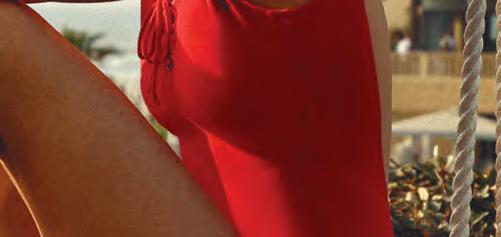







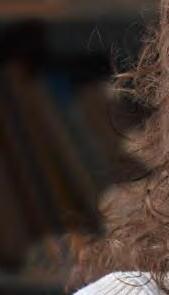








In-house services include:
GP, Pharmacy Technician
Physiotherapy, Occupational Therapy, Clinical Psychology
Audiology, Dietitian, Speech & Language Therapy

Find out more
Outstanding residential, nursing, dementia, respite & rehabilitation and end-of-life care HAMMERSON HOUSE, WOHL CAMPUS LONDON N2 0BE | 020 3838 8090
Scan the QR code, visit nightingalehammerson.org or email ResidentsServices@nightingalehammerson.org
HOUSE
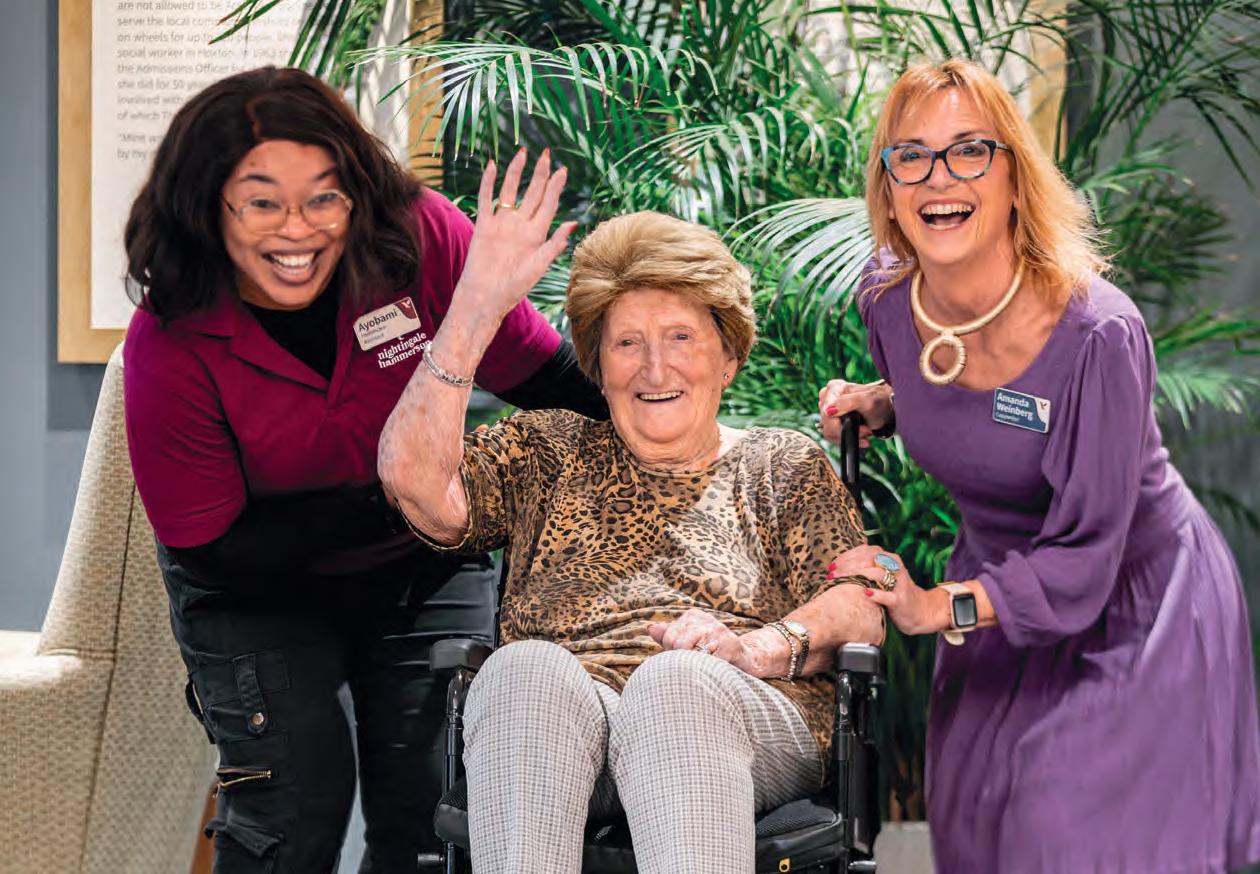
RESIDENT MARY, 107, A GREAT-GREAT GRANDMOTHER IS HAPPY TO CALL HAMMERSON HOUSE HER HOME.
“I’m happy here and I can relax, knowing I will be looked after really well. I enjoy the Jewish atmosphere and everyone is jolly. I particularly like the concerts and the quizzes, I do really well in the quizzes.”
Jan Shure reports on a housing initiative that solves two problems with one key

Atrio of Jewish marketeers and tech entrepreneurs is leading a revolution in a corner of the housing market and may also have found the magic bullet for easing – if only slightly – the housing crisis, the cost-of-living crisis, the childcare crisis and a number of other crises brutally draining cash in today’s Britain.
Hapipod was originally designed to connect seniors and young adults via a
genius platform that would help overcome some of the minor practical challenges faced by older people living alone, while easing the housing crisis faced by the UK’s young adults, with 40 percent of under-30s unable to afford to leave home.
I wrote about hapipod (sic) in its original incarnation a couple of years ago, noting that as Boomers hurtle towards old age, even if we were open to the idea of life in a care home – which most of us are not – our greater
longevity probably makes long-term care unaffordable. According to those I spoke to, most of us were seeking ways to retain agency and remain independent – at least before frailty or chronic illness deprived us of that option.
I mentioned a number of ‘solutions’ that would defer or remove entirely the need for care, including self-contained apartments in a ‘supported’ environment – an option available from several Jewish communal organisations as well as commercially

– that ranged from a warden and a communal lounge, to super-ritzy ‘seniors’ developments. I also mentioned co-housing communities – popular in Scandi countries and taking off now in the UK and Israel. But by far the most imaginative and innovative solution in 2022 for deferring the loss of agency and loss of independence was hapipod.

Since then, hapipod has evolved in a way its original founder, Sunderlandborn, north London-based marketeer and documentary film-maker Andrea Frankenthal, could not have dreamed when she came up with the idea during lockdown.
The director-producer of Forced Out, a documentary exposing antisemitism in Corbyn’s Labour party, was chatting to a friend about the friend’s elderly father who needed a little practical help at home; help that the friend – at full stretch with children and a career –didn’t have the time or the geographical proximity to provide.
After discovering that there were some 3.6 million people aged over 65 with spare rooms, and some 3.4 million people aged 20 to 34 who could not afford to leave home, Andrea had the idea of matching “active, independent householders” who had a spare room with young adults who would “help out with tech, pet-sitting or a spot of gardening” in exchange for paying below the market rate for accommodation.
After passing an ID-check (with members advised to carry out their own checks, for which hapipod provides detailed guidance) and paying a small, limited-duration membership fee, members made their own selections and could contact possible matches directly.
As Andrea told me in 2022: “Everyone benefits.” And as the first space where seniors could find a paying lodger who
would help out, it was an instant success. It quickly became apparent that the hapipod concept was evolving. Andrea saw that older people were signing up to get affordable accommodation for themselves – possibly after divorce – while younger householders were signing up to get a small income from a spare room as well as a little help with childcare, babysitting or tutoring. Finding herself matching hosts and renters on sheets of paper at her kitchen table, Andrea realised she had to redevelop the website. And she needed a bigger team. A chance meeting at the gym brought old friend Nicole Tinero on board. A member of West London Synagogue from childhood and a long-time supporter of Jewish charities (she did two bike rides in Israel for Norwood-Ravenswood), Nicole had 30 years of experience in PR and marketing and an immediate understanding of the possibilities for hapipod. As well as rebranding to reflect the changing demographic, Andrea says that she and Nicole spent “an eventful year” searching for tech expertise.
They found it in Jewish tech entrepreneur David Cummin, who had successfully taken four start-ups to sale and was able to lead the development of the “new all-singing, all-dancing site”, which was launched earlier this year.
As well as a shift in its age demographic, hapipod is expanding
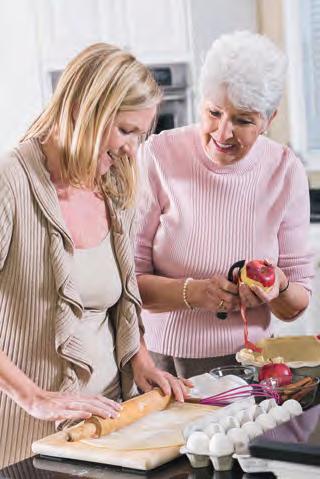
around the UK. Having focused initially on London and the South Coast, it is now rolling out nationwide to match people in areas such as Leeds, Nottingham, Manchester, Glasgow and Andrea’s old home turf in the North-East.
“By enabling the right people to find each other,” explains Andrea, “we have the potential to help combat the cost-of-living, rental and loneliness crises. Many householders would be happy to provide a spare room at an affordable rate to a compatible lodger who could offer a little help. It’s this mutual opportunity we want to nurture.
“We are a business, but we believe passionately that in this tough economic climate, hapipod has the potential to drive a lifestyle revolution based on shared space and mutual support that will enhance wellbeing – and not just for older people with a spare room, but for younger families feeling the economic pinch as well as mature people who need affordable accommodation.
“We believe it will help independent people of all ages live their best home lives.”


Since 1902 Shaare Zedek has provided Hope for Us, Hope for Israel, and Hope for the World.
We rely on donations and gifts in wills to enable our lifesaving work to continue.
To find out more about leaving a Legacy to Shaare Zedek UK please contact us on 020 8201 8933 or at info@shaarezedek.org.uk













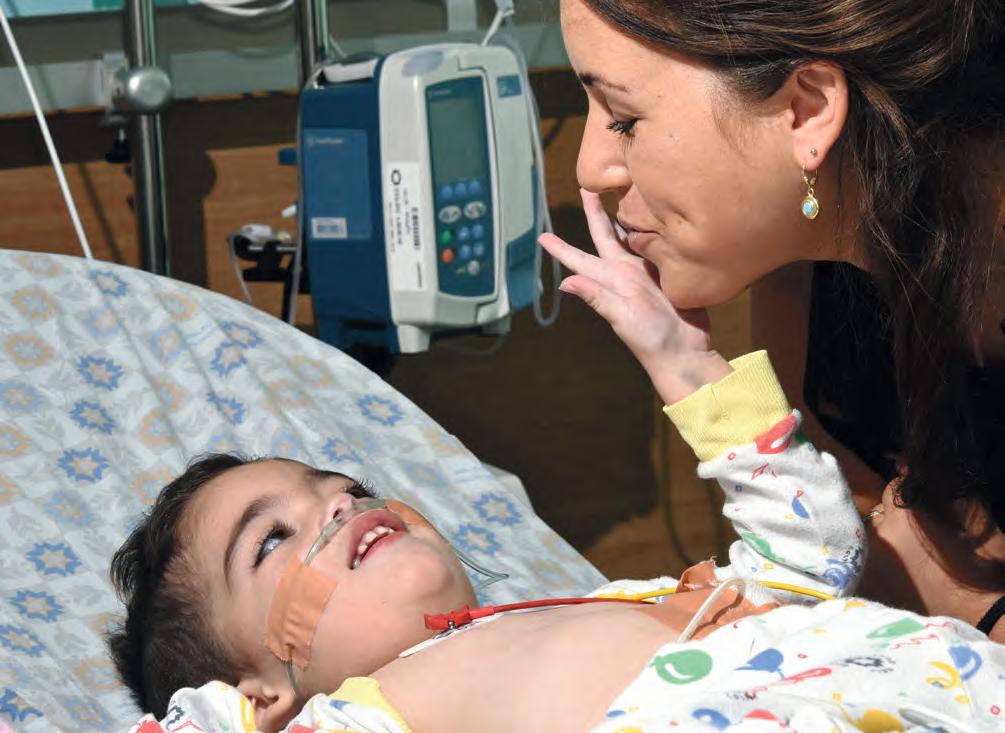
Jewish Blind & Disabled offers housing and support for adults who have physical disabilities or vision impairments.
Our specially adapted mobility apartments and support for people living in the community transforms people’s lives.

Help us transform more lives. Donate at jbd.org/donate or by calling 020 8371 6611


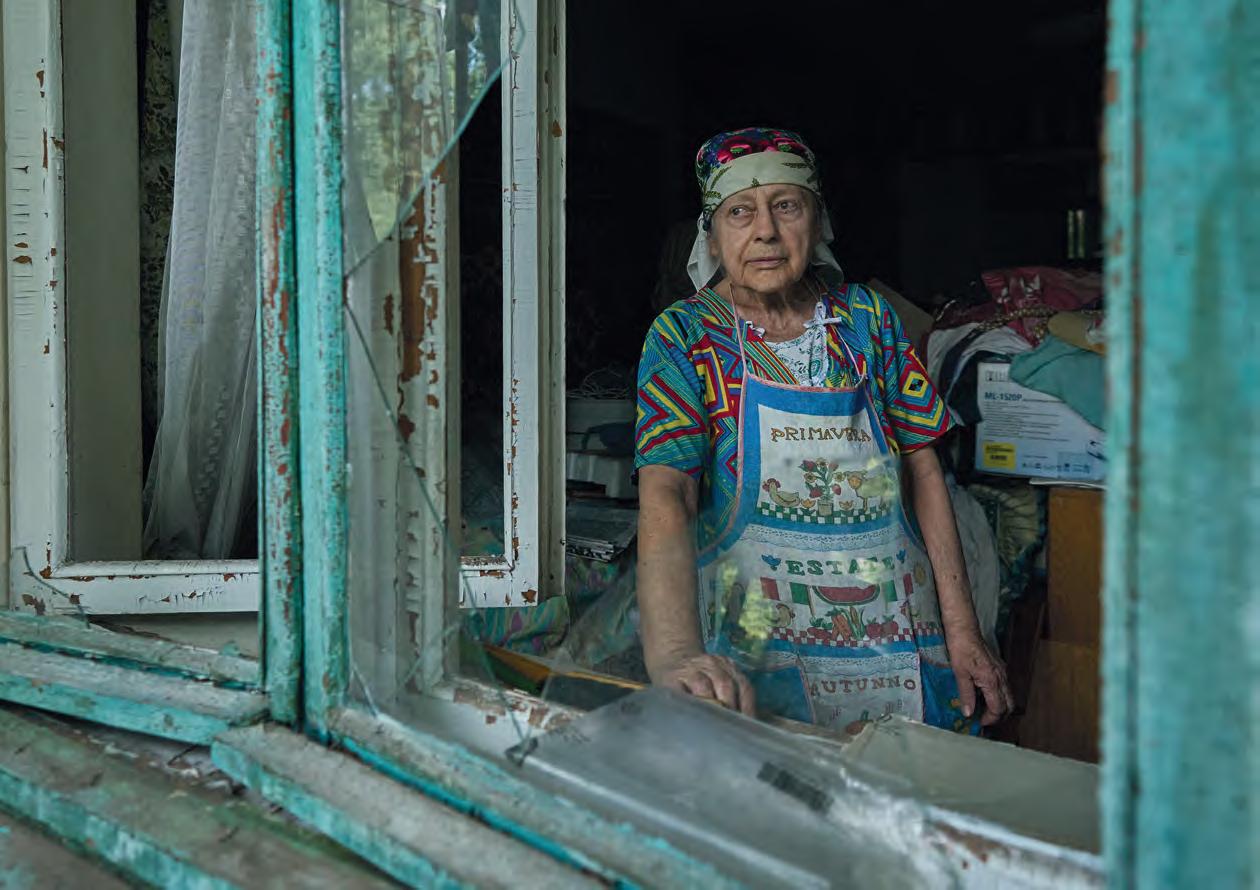




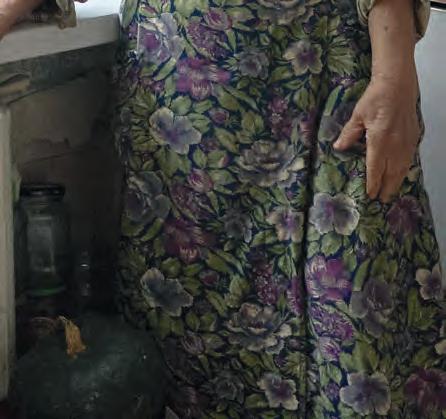

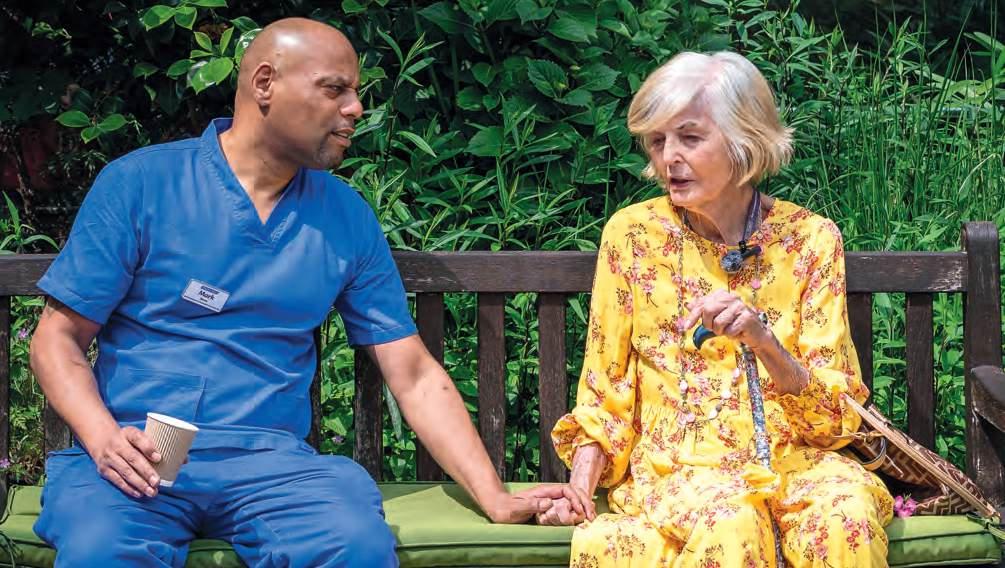
For Jewish Care residents, emotional assistance is often as much-needed as physical help. This results in special relationships being formed.
By Debbie Collins
When Vivienne Winnick moved into the Stella & Harry Freedman House care home following the loss of her daughter, she was grieving and uncertain about what lay ahead.
Mark Rowe, who began working in the kitchens, moved to resident care because of his kind nature, crossing paths with Vivienne.
“We warmed to each other the fi rst day she came in,” he reflects. “She was really concerned about her new surroundings, so I tried to reassure her and support her.”
Originally from Johannesburg, Vivienne appears frail and quiet, but
around Mark, something shifts in her, and a wry smile appears. Whether eating her meals or talking about how she’s feeling, she responds to Mark’s gentle encouragement with a “ja”.
“Vivienne trusts me,” says Mark. “When we make arrangements, she sticks to them – like today’s interview, which she’s been really looking forward to.”
Mark enjoys learning about Vivienne’s life, including a shared love of animals, especially horses, with Vivienne reminiscing about riding and showjumping in her youth. “I see a bit of rebellion in Vivienne when she’s not happy with something, and I see that

Christine and Melvyn like to share jokes
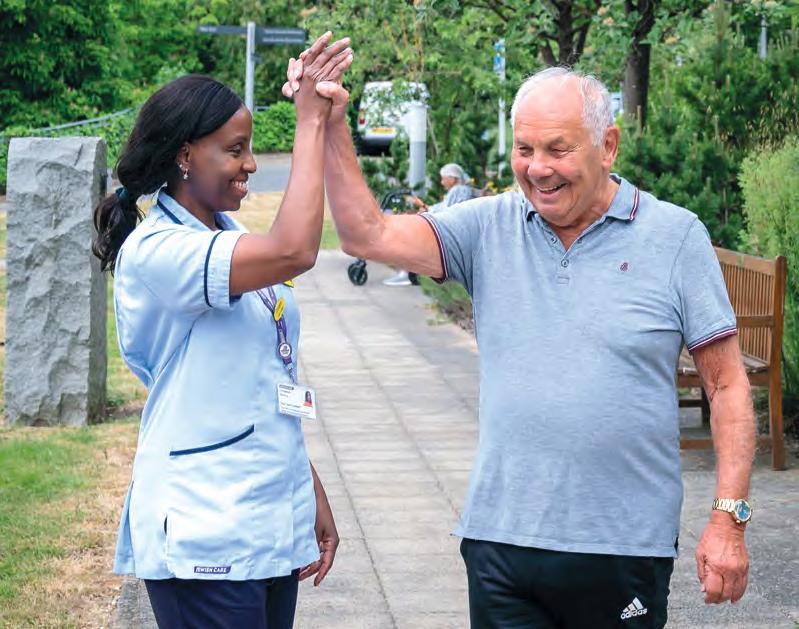
'When someone has a rich history and they let you be part of it, that's a gift'
side in me. I think that’s why we get on so well!” Vivienne nods in agreement and they take a moment for a gentle hand squeeze.
In the courtyard, Vivienne sits on a bench wearing striking yellow, speaking about how she enjoys getting dressed up and accessorising (even her walking stick is floral-adorned). Mark says: “I got one of the female carers to doll Vivienne up a bit today – with some blush and eyeliner. I know she likes to look nice.” Vivienne chips in: “It’s nice to have something special to dress up for.”
Her bedroom boasts a large collection of family photos, including one of her younger self with bone structure to rival that of a supermodel. Last summer, accompanied by Mark, the pair managed a trip to Tesco, where Vivienne’s determination to find the perfect hair tint led to Mark wandering
the aisles to find it.
During Covid, the absence of family visits tightened the bond between them. “Even if a resident might not speak, they feel and see who actually cares and I think that’s why I was able to build such good relationships – by always anticipating and caring.”
Asked if Vivienne misses Mark on his days off, she turns to him and stares questioningly for a moment, finally saying: “Most definitely.”
PLAYFUL BOND
Kun Mor & George Kiss Home resident Melvyn Goldberg may keep his age quiet (85 – shhh), but there’s nothing quiet about his presence. A resident for five years, he is a daily source of energy and humour, especially for team leader Christine Wachira, to whom Melvyn refers as “my favourite lady”. Both agree that their friendship is
“pure banter”, built on shared humour, respect and a deep love of football. Both die-hard Arsenal supporters, their bond was forged over match-day predictions and post-game debriefs. Christine says: “When they lose, I get moody, and Melvyn lightens the mood with one of his dry jokes.”
Melvyn defies his dementia with a packed daily schedule that Christine encourages, from leading Friday Kiddush to updating the activity board he takes the lead in joining activities. Most mornings you’ll find him getting fresh air with other residents and practising his trumpet, a skill he has kept up daily since he was 12. He plays for residents and performs the Last Post at the annual Remembrance Day service at the home.
Melvyn’s passion for sport led him to a career in sports law, setting up Melvyn Goldberg & Co, representing athletes and clubs. “I started at 25,” he recalls. “You couldn’t study it back then – I just did what I loved and was the first in the field to practice sports law. No one else was doing it.”
Melvyn never misses a home game, going with his children and grandchildren, with the goal of taking Christine one day. “She deserves it,” he says and Christine smiles. “He’s become a big part of my life. When someone has such a rich history, and they let you be part of it... that’s a gift.”
On Christine’s work days, Melvyn says that everything feels brighter but rather than make it too emotional, he jokes about her dancing (“two left feet!”), and she teases him about his preferred photo angle (“only from the right!”).
Melvyn explains that Christine makes him feel at home in care. “If you ask me if there’s anything I don’t like or want to complain about here, the answer is ‘no’. I’m very happy here.”
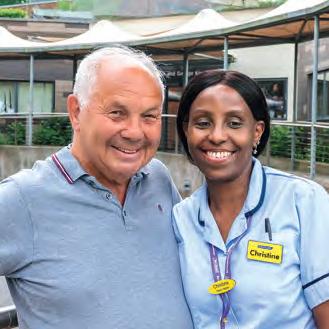


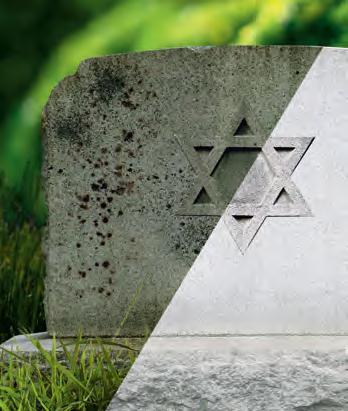











Support us on our Journey of a Lifetime
Kisharon Langdon supports people within the Jewish learning disability and autism community to thrive and reach their potential.
Whether joining our nursery, school, college, benefiting from employment or supported living programmes, we welcome people at every stage of life’s journey.
We can only continue our vital work with your support.
For more information or to make a donation, please visit kisharonlangdon.org.uk or call 020 3209 1160.
kisharonlangdon.org.uk 020 3209 1160 info@kisharonlangdon.org.uk
Kisharon Langdon Registered Charity No. 271519







At Tel Aviv University (TAU) we are optimistic that we will rally global support for ensuring the University’s own resilience, stability and excellence for years to come.



Formoreinformation:CaraCase,ChiefExecutive|Email:cara.case@tau-trust.co.uk Tel:02074468790|www.tautrust.org|RegisteredCharityNo:314179 Join us on the road to breakthroughs
@TelAvivUniversityTrust-UK @TAUTrust TelAvivUniversityTrust-UK telavivuniversitytrust


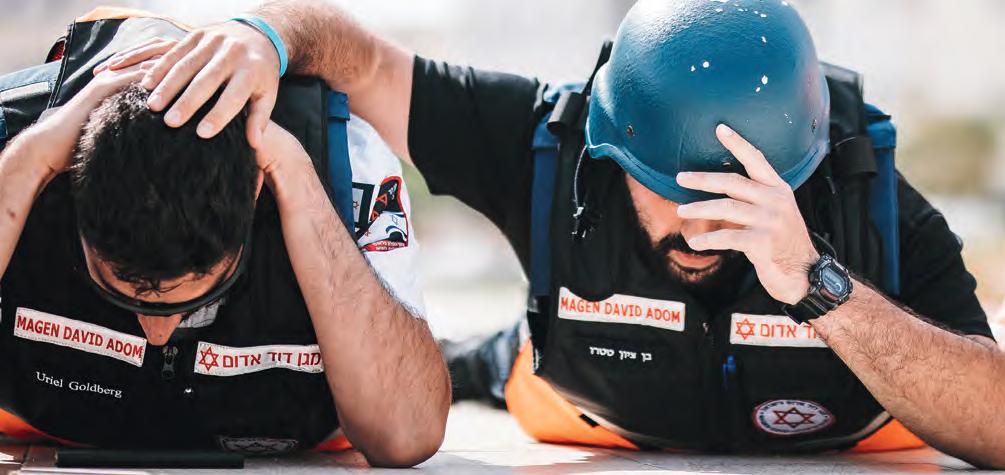









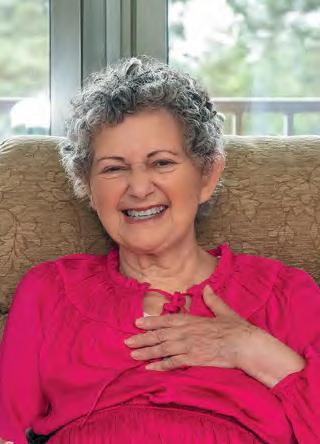
At the end of October , Valerie Sheridan came to Anita Dorfman House care home at Sandringham care campus by ambulance, with an end-of-life diagnosis of stage 4 breast cancer and doctors said she was too unwell to walk.
Valerie, 72, has a wonderful family around her along with her carers, Wanda (unavailable for interview) and Pauline Hicks, all of whom have encouraged and supported her to be as active as possible. This is what matters most to Valerie: her dignity, her family and being able to walk again for her grandson’s upcoming barmitzvah.
Valerie explains how she felt scared and unsure what to expect coming to the care home, “It sounds a bit corny, but I found a family here. Pauline is a great example of Jewish Care.”
At the same time that Valerie was brought in, Pauline, an experienced hospital matron, started work at Jewish Care – a serendipitous moment that initiated the bond that has led to
'It sounds a bit corny, but I found a family here, Pauline is a close friend'
Pauline recounting stories of Valerie’s life, including her role as Diary Secretary to Chief Rabbi Lord Jonathan Sacks. “It’s a shame we didn’t meet prior,” says Valerie. “We would have had good fun together. Pauline’s a wonderful carer, but she would have been a very close friend, as she is now.”
With Pauline’s constant support and encouragement, Valerie decided one day “I want to walk”, holding onto the edge of the bed and making her way round. “I got to the other side and sobbed with Pauline, who sobbed too. It was so emotional. I just had that determination knowing Pauline was with me.” Pauline acknowledges these moments of inner strength and captures them on video for the family.
When Pauline is off work, Valerie misses her, with both relishing the chance to catch up. Pauline laughs: “I’ve mostly been sleeping for two days. Sometimes Valerie has been up to more than me!
“Jewish Care is an amazing place to work. I look at everybody as my

mum, who I lost. I do everything I can to help people here.”
Valerie recalls an eye appointment where afterwards, she asked Pauline: “Can we go to a café?” While it wasn’t for long, it was a very special moment that “felt like freedom” to Valerie.
With her grandson’s barmitzvah fast approaching in July, Valerie is determined to be there, walking. “It’s my dream. And Pauline will be with me. She is my darling.”




Our community charities have lined up a host of initiatives for the months ahead, bringing sunshine where it's most needed.
By Louisa Walters
■ With many young people away from home for the first time at summer camps and youth programmes, Jewish Women’s Aid (JWA) is making sure they’re as safe as possible by delivering specialist training to youth leaders across the community to help them recognise signs of abuse and promote healthy relationships from an early age. Through direct support, education and training, JWA works to prevent abuse, increase understanding, and ensure no one affected is left alone. The school holidays can be especially isolating for women and children affected by domestic abuse and sexual violence, so JWA is organising days out and activities to ensure they can enjoy the summer together in a safe and supportive space.
Young professionals can get involved at the Young JWA Committee summer party, raising awareness around abuse, consent and healthy relationships, while funding this vital work.


■ Beit Halochem had an early start to summer when it brought a delegation of 32 Israeli veterans to London in March in unseasonably warm weather. Sightseeing, a picnic, a Shabbat dinner with host families and a visit to JCoSS to talk to the students were all part of the programme. There was a visit to Brighton to watch Brighton play Fulham, an Arsenal stadium tour and lunch at Tony Page’s restaurant plus a trip to see The Lion King, a Shoreditch street art tour and lunch at Hummus Bar. A celebration evening at The Sorting Office completed the trip with the veterans commandeering the dance floor, rocking out in wheelchairs and jubilantly punching the air with their crutches.
Earlier this month, more than 850 children from across the community came together for Beit Halochem’s It’s A Knockout event, raising vital funds for the 65,000 disabled veterans and victims of terror supported by the charity’s rehabilitation centres in Israel.
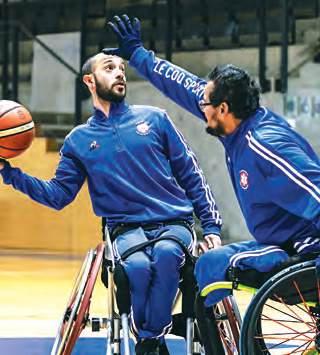

■ A sense of community, accessible fun, respite and the opportunity to create lasting memories are just a few of the reasons Camp Simcha’s summer programme is such a lifeline for the families it supports.
This summer, around 120 family members with children facing a range of serious medical conditions, will attend the charity’s three-day residential family retreat.
One parent explains: “Retreat is joyful at every turn… time as a couple, time as a family, time alone, it all lifts your spirits… plus, to know you are with
other parents who have experienced that awful life-changing doctor’s appointment and be in a safe environment is simply magical.”
Meanwhile, 16 seriously ill children will be going to Camp USA, run by the charity’s sister organisation in America, and more than 1,200 attendances are expected at the Keshet summer day scheme in London and Manchester. The programme will feature accessible outings to Hobbledown Heath, Gulliver’s Land, Adventure Island, Diggerland, Stockeld Park and Chester Zoo.
■ For those living in Emunah’s Residential Homes in Israel, summer can feel isolating. Without family outings or holidays, they risk missing out on the joy most of us take for granted. British Emunah’s homes remain open and active all summer, with the added challenge of keeping the children engaged and happy. Day trips are a highlight – offering a chance to explore nature, cool off at watering holes or connect with heritage at sites such as the Kotel.
These excursions provide structure, excitement and vital emotional relief during long, hot days when staying indoors can feel stifling, and supporters visiting Israel are invited to sponsor a day out. Closer to home, on 30 June, Emunah’s Eat & Speak summer event will feature Adam Cannon, director of legal at The Sun

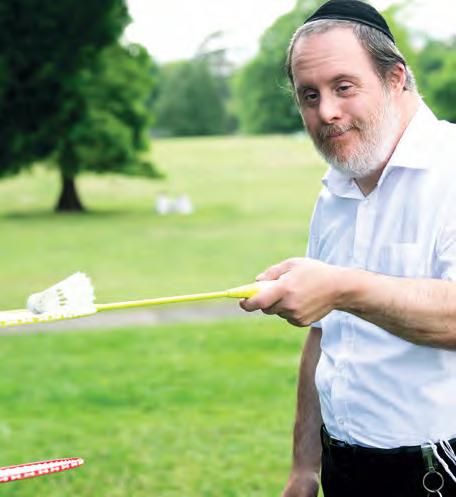
■ At Kisharon Langdon, summer is not just about sunshine – it's also about wellbeing. The vibrant summer programme champions mental health through outdoor activities (weather permitting), suggested and planned by the very people the charity supports. Highlights include picnics in the park and barbecues in supported living homes. Gardening is a popular choice, with weekly sessions at Childs Hill Library’s accessible garden led by an experienced horticulturalist.
The traditional sports day, held in the library garden, is a seasonal favourite. Staff join in too, creating a strong sense of inclusion and shared celebration.
For the quintessential British summer experience, there is a trip to the seaside for a day of sandcastle-building and leisurely strolls along the pier.
Teenage boys enjoy a barmitzvah trip to Afula, courtesy of Emunah
Importantly, it’s still business as usual. Kisharon Langdon’s core services run year-round, including supported living, employment support and life-skills programmes –enabling people in the Jewish learning disability and autism community to thrive throughout the summer and beyond.

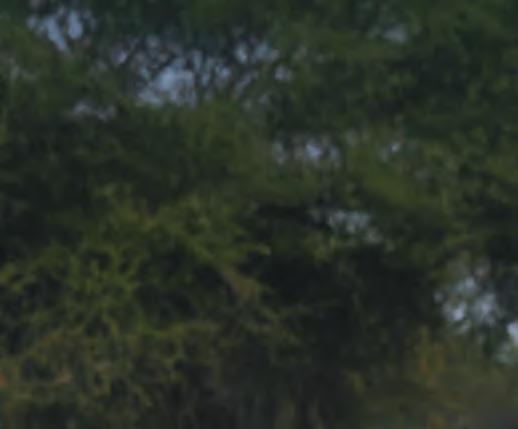

Join us on the wild side for this exciting 5-day cycle from Nairobi across the plains of Kenya, through the Tsavo National Safari Park and on to the beaches of Mombasa. Hybrid bikes, a mix of dirt and tarmac roads and the chance to see the Big Five, this is a feast for the senses not to be missed.
We’ll support you all the way and together we can support and empower neurodiverse children, their families and people with neurodevelopmental disabilities, to live their best lives.

More information: challenges@norwood.org.uk
To book: norwood.org.uk/kenya
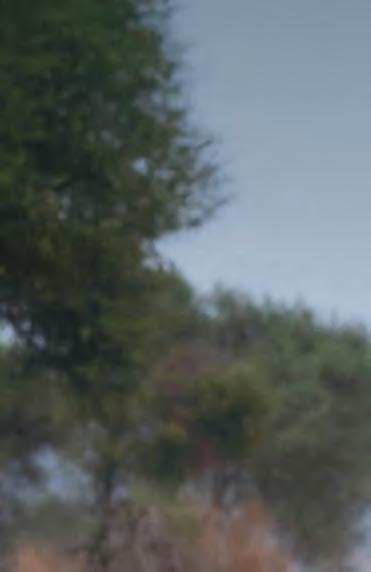
19–26 OCT 2025






■ Since the outbreak of war in 2022, nearly two million homes in Ukraine have been damaged or destroyed. Shattered windows, broken doors and crumbling walls have left families exposed and vulnerable and behind every ruined home is a person. This summer, World Jewish Relief is urging
the community to ‘Raise the Roof’ and help restore safety and dignity to older Jewish people across Ukraine. So far, 1,088 homes have been repaired but there is still much to do. Each repaired roof and replaced window is more than just shelter – it’s a step towards rebuilding a life.

■ While summer is a time for family fun, it can also strain household budgets. Extra childcare costs, increased food bills, holiday activities and pressure to provide memorable experiences can stretch already thin finances. Paperweight helps clients to build financial resilience, equipping them with the tools, guidance and support they need to plan ahead, helping them to access benefits and manage their money confidently. The team works closely with families to help them budget for the summer and across all seasons, identifying cost-saving strategies and support schemes they may not know exist.
Resilience means more than just making ends meet – it means feeling secure, supported and empowered to make informed choices. Whether it’s navigating Child Benefit or Universal Credit, understanding entitlements or negotiating with creditors, Paperweight ensures everyone can enjoy the summer with less stress and more stability, focusing on what matters most – time together.

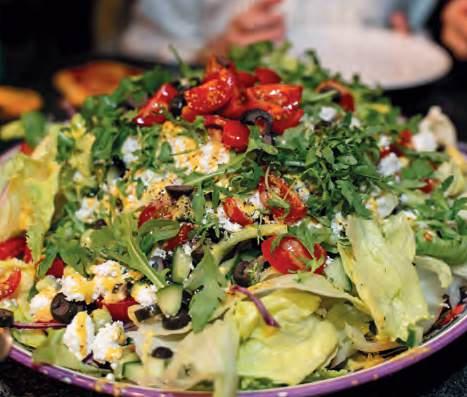
■ Head Room, Jami’s social enterprise café, is embracing the summer vibe with new dishes and a community spirit. Supported by The Maurice Wohl Charitable Foundation, this informal, relaxed and welcoming kosher café in Golders Green has added some new seasonal dishes to the menu, including a tasty tuna melt and a build-your-own salad, with everything from spiced chickpeas and sweet potatoes to smoked salmon and halloumi.
After you’ve had a bite to eat or savoured a refreshing iced latte, frappuccino or fruit smoothie, you can join the café’s community walking group every Thursday from 4pm-5pm. It’s a great opportunity to move your body, meet new people, or just have a bit of ‘me time’.
If you’re having a birthday celebration or hosting sheva brachot this summer, you can hire the café – stand-up buffets and sit-down meals can be arranged.
All profits from Head Room go towards funding Jami’s mental health services at the café and across the community.
Paperweight helps people to budget so they can focus on spending time with loved ones
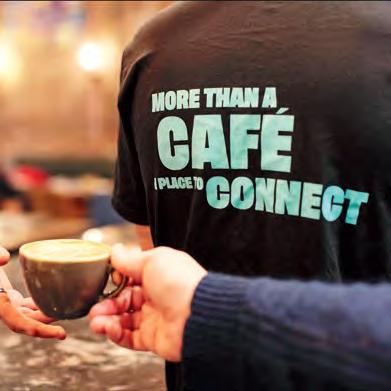
The UK’s Leading Israel Activism and Education Organisation
We Believe in Israel unites supporters across the UK-Jewish and non-Jewish communities, left and right, veteran advocates and new voices-creating a powerful, grassroots movement that supports Israel's right to peace, security, and recognition.



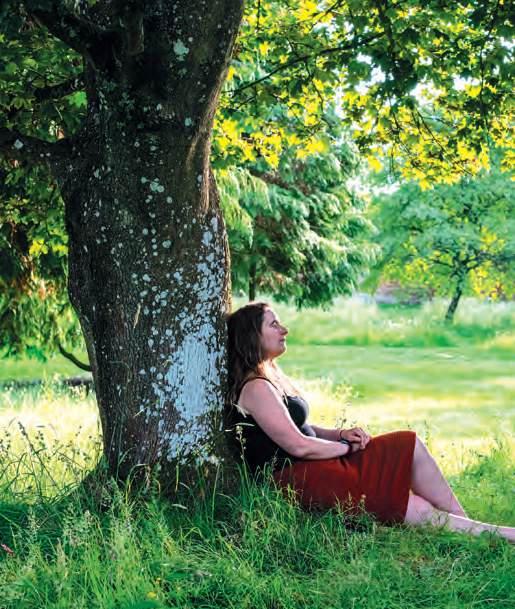
Charity pairs unused hotel rooms with carers in need of a break
ike many parents of children with additional needs, Rachel and her husband, an Orthodox couple from north-west London, could not remember the last time they had taken a break.
LDay to day, Rachel is looking after her husband’s parents as well as two of her adult sons, who have a mix of special educational needs and hidden disabilities.
“Being a carer becomes part of one’s life and, without noticing it, it wears a person down,” she says.
The fi rst time she went on a break with Carefree, she said it felt like “a giant hug”. For two nights, she could just focus on herself. It made her feel recognised. It made her feel cared for – for a change.
Carefree is a small but impactful UK-based charity that transforms vacant hotel rooms into vital breaks for unpaid carers – the millions of people in the UK who look after loved ones with illness, disability or mental health conditions, often without rest.
Founded in 2017 with the support of Jewish foundations and hotel owners, it now offers more than 10,000 respite breaks a year to carers nationwide through its multi-award-winning digital platform. All the accommodation is donated by Carefree’s hotel partners. Breaks are for one to two nights with breakfast included for a carer plus companion for a small admin fee of £33 towards the charity's operating costs.
Hotel in Winchester (which is very used to hosting Jewish guests), Rachel has referred more than 70 other carers from the Jewish community for a break, with 20 having already taken one.

Three in five of us will become an unpaid carer at some point in our lives. The charity believes that making it possible for every full-time unpaid carer to get access to a break when they need one is the fi rst step towards building a more sustainable health and social care system that relies on unpaid carers to provide 80 percent of home care in the UK.
“Carers give so much of themselves, often quietly and without recognition, and it can take a real toll,” says Judy Dewinter, chair of the Royal Free Charity. “That’s why Carefree’s work is so important; it gives carers a chance to rest and recharge. It’s simple and it works. We need more ideas like this in the health and care space.”
After her break at The Norton Park
She says: “The break taught me that I need to take more care of myself and prioritise time out so I can take better care of others.”
Carefree CEO Charlotte Newman (pictured, inset) says the reason behind the charity’s success is that made it easy for hotels to donate their forecast excess capacity. So far, it has given away 14,000 breaks valued at £3.85million and has registered 35,000 carers.
If you’re a carer in need of a respite break or you manage a hotel that would like to make a difference to people’s lives, sign up at carefreespace.org
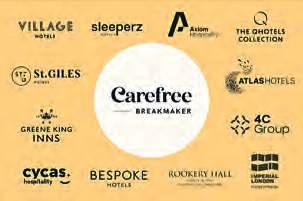


























Food-loving book publisher Michael Levanthal has curated a charity collection of cheesecake recipes
During lockdown I produced a fundraising collection of global chocolate recipes that was a tremendous book but more work than any of the 1,000+ I’ve published in the past 25 years. I swore to never do another cookbook but was seduced by a Basque cheesecake recipe which led to me collecting more than 60 others. All royalties will be donated to Chai Cancer Care, a charity close to my heart.
If you’re a lover of baklava and cheesecake, this is for you. I like to use Polish cream cheese as opposed to Philadelphia as it’s slightly smoother. This cake needs to be prepared a day ahead. Anne Iarchy
For the simple syrup
• 120g (½ cup + 2 tbsp) sugar
• 120ml (½ cup) water
For the cake
• 120g (8 tbsp) melted unsalted butter
• 10 sheets of filo pastry
• 150g (1½ cups) crushed pistachio kernels
• 12g (1 tbsp) sugar
• 500g (1lb 2oz) cream cheese
• 200g (1 cup) sugar
• 4 medium eggs
• 1 tbsp vanilla
• 25g (¼ cup) plain flour
• 225ml (scant cup) double cream
For the decoration
• handful of rose petals
• handful of the crushed pistachio kernels
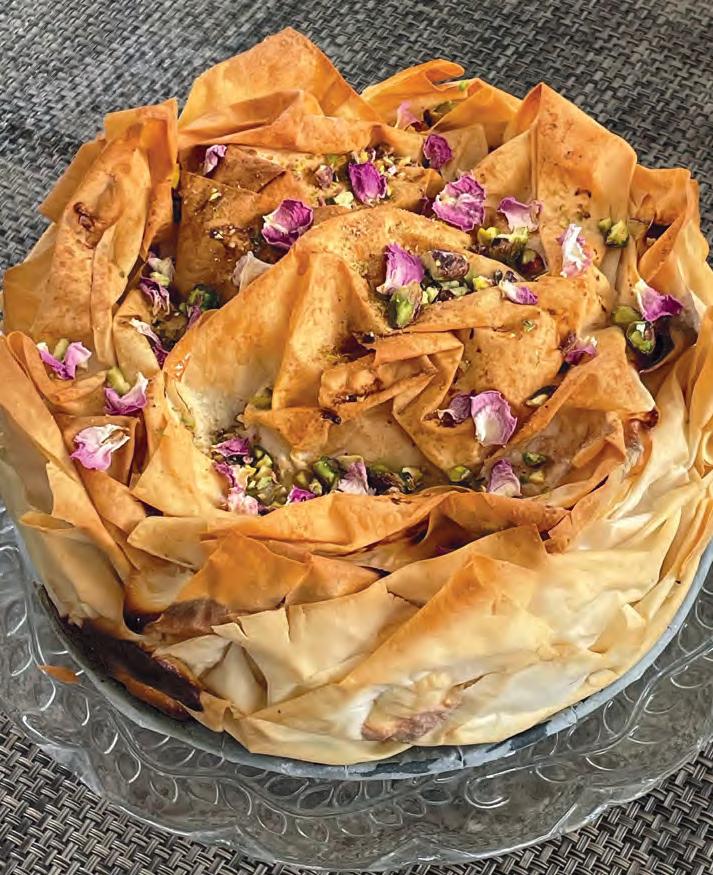
METHOD
1. To make the simple syrup: dissolve the sugar in the water over a low heat in a heavy-bottomed saucepan. Bring to the boil and leave to cool. Unused syrup can be stored in a clean empty jam jar in the fridge for up to 4 weeks.
2. Preheat the oven to 190°C (170°C fan/375°F/gas mark 5) and line the bottom and sides of a 20cm (8in) springform cake tin with parchment paper.
3. Brush 6 tbsp of the melted butter generously onto eight sheets of filo pastry and layer them across one another horizontally and vertically to cover base and sides of the tin and create a gap to pour the cheesecake mixture into. Bake for 10 minutes.
4. Set aside a handful of pistachios for decorating. Mix the remainder with 1 tbsp of sugar and 1 tbsp of melted butter in a small bowl. With a mixer, cream the cheese and 200g (1 cup) of
sugar until soft, add the eggs one by one and the vanilla until well combined. Add the flour and double cream and mix.
5. Add the pistachio mix to the baked base and press down on the pastry. Don’t worry if you hear the crushing noise of the breaking pastry. Pour the cream cheese mixture into the centre of the pastry base, as it can tend to seep out of the sides.
6. Crinkle the remaining two filo pastry sheets and press them onto the cream cheese mixture. Brush the top with remaining melted butter. Bake for 50 minutes until golden. If the cake is getting too dark, cover with some foil.
7. Once out of the oven, drizzle with about 60-80ml (½ cup) of the simple syrup and sprinkle with rose petals and remaining pistachios. Allow to cool at room temperature then place in the fridge for 8 hours or overnight.
The prevalence of Dubai chocolate means everyone now has an obsession with knafe, so why not use it in cheesecake, too? Joanna Nissim @joanna_nissim
INGREDIENTS
For the topping
• 100g (3.oz) knafe (kataifi) pastry
• 50g (3 tbsp) butter
For the syrup
• 200g (1 cup) sugar
• 240ml water (1 cup) water
• 120ml (½ cup) orange juice
For the base
• 170g (6oz) digestive biscuits or graham crackers
• 110g (1 stick) butter, melted
For the filling
• 400g (14oz) soft cream cheese
• 100g (cup) sugar
• 3 tbsp rosewater
• 2 tsp cornflour
• 3 large eggs
METHOD
1. Using scissors, snip the pastry into pieces. Melt the butter in the microwave then pour over the pastry and rub it in using your fingertips. Lay the pastry out flat on a baking sheet and cook for 15–20 minutes until golden. Keep checking and turning the pastry over to ensure it does not burn. Once ready, take it out and leave to cool.
2. Make the syrup by adding all the ingredients to a saucepan and, over a medium heat, dissolve the sugar. Once the syrup has thickened slightly, leave to one side to cool.
3. To make the cake, start by lining a 23cm (9in) cake tin with greaseproof paper. In a mixing bowl, crush the biscuits and stir in the melted butter until it is absorbed. Tip the biscuit
rubble into a bowl and press down into the bottom of the cake tin with the back of a spoon.
4. In a separate mixing bowl, mix the cream cheese, sugar, rosewater, cornflour and eggs using an electric mixer until you have the consistency of double cream. Pour the mixture on top of the biscuit base and place in the oven at 180°C (160°C fan/350°F/ gas mark 4) for 1 hour.
5. Once cooked and the top is golden, take it out of the oven and let it cool . Once cooled, take the cake out of the tin and pile the cooled golden knafe pieces on top. Drizzle the syrup all over the top and let it sink in.

The first time I tried cheesecake was at my husband’s Grandma Dora’s weekly Shabbat tea. She was a wonderful baker, but hers was a no-bake cheesecake. Being newlywed and somewhat unsure of my skills in the kitchen, this was something I felt brave enough to try. For years it was my centrepiece of choice, until the day I was at my friend Jo’s son’s first birthday tea, whereupon she presented a showstopper of a cheesecake that was everything mine wasn’t. It was square where mine was round, it was tall where mine was flat, it was golden yellow where mine was white, and it was baked. This was Jo’s mum’s cheesecake, and that’s what it is called on the dog-eared, stained recipe in my recipe folder. I have refined it slightly over the years, so it is now Louisa Walters’ cheesecake, but I like the nostalgia that comes with the original name. Louisa Walters
SERVES 10
• 360g (12oz) digestive biscuits, crushed and mixed with 30g (2 tbsp) melted butter
• 3 large eggs
• 225g (1 cup + 2 tbsp) sugar
• ¾ tsp vanilla extract
• 2 tsp custard powder
• juice of half a lemon
• 150ml double cream
• 680g (1lb 8oz) cream cheese For the topping
• 300ml (1½ cups) sour cream mixed with 2 tsp sugar
1. Preheat the oven to 160°C (140°C fan/325°F/gas mark 3). Line a large 23cm (9in) loose-bottomed round or square tin with the biscuit and butter mixture.
2. Whisk the eggs and sugar together. Add the vanilla, custard powder, lemon juice and cream, then add the cream cheese and whisk for a minute or two.
3. Pour the mixture over the base and bake for approximately 40 minutes. Take out of the oven and allow to cool. It will split, but don’t worry, because when it’s cool, you can cover the top with sour cream and hey presto, it looks perfect!
4. Refrigerate overnight but serve at room temperature and decorate with berries.
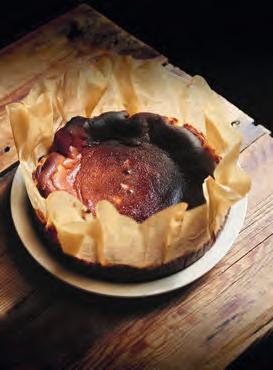
The Ultimate Cheesecake Cookbook, published by Green Bean Books, is available as an eBook on Amazon now and will be available in hardback in September

Places I’m getting my taste fix this summer.
By Louisa Walters
I’ve heard appetite drops when the temperature rises, but not mine! I just switch to sunny food, bold flavours and chilled rosé on a terrace. Luckily, Jewish, Jew-ish and Israeli chefs have it covered – including ice cream.
Born in a Tel Aviv kitchen in the ’90s, it all started when Mama Anita whipped up homemade jams and her son Nir created a gelato base. From selling scoops from a cart in 1998, they opened their first store in 2002, went global from 2014, and landed in London’s Covent Garden in 2023. Churning out over 150 flavours on-site, pick from the creamy gelato, zingy sorbets, vegan options and sugar-free delights topped with unlimited extras.
A Brazilian all-you-can-eat meat-and-salad fest has opened at Finchley Lido, taking over the bright, spacious former ASK site. The fresh salad bar nods to owner Tomer’s Middle Eastern roots with cauliflower tahini, mango broccoli, Israeli salad and aubergine – plus Caesar, coleslaw and beetroot with feta. A hot buffet caters to fussier eaters with beef stew, rice and pasta with tomato sauce. You plate up, sit down, and then the real fun starts: endless skewers of grilled chicken, lamb and beef are carved at your table – think teriyaki thighs, paprika chicken, jumbo wings, sausages, salt-crusted brisket, tender beef and juicy lamb, with perfect fries on the side. The banquet ends with grilled pineapple and softserve ice cream.
A fter a huge refurb, every inch of the place is now looking fabulous. The Brasserie is a top pick year-round, with huge picture windows keeping it bright all day. Expect classics such as chicken liver parfait, cod with crushed peas and dill and standout slow-cooked beef cheeks in red wine. Don’t skip the Bakewell tart – or the stunning new bar, where I found a passion fruit and white chocolate martini like no other.

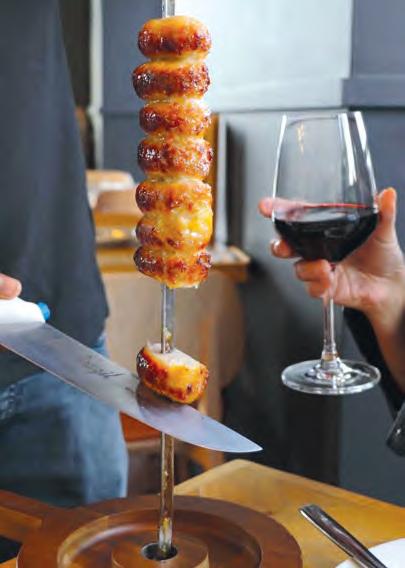
ABOVE: Limoncello sorbet at Anita Gelato LEFT: Chicken sausages at Bacana BELOW: The Brasserie at Sopwell House

Kushan Marthelis knows what women want for lunch – salad. The new salad bar at his revamped cafe on Leeming Road, Borehamwood, is packed daily because the salads are interesting, fresh and served with teriyaki chicken, grilled salmon and schnitzel by friendly staff.
Lunch on a secret sunny terrace in Soho sounds like a great idea, especially as Kapara has launched a new daily changing lunch menu. Eran Tibi’s fusion menu blends Tunisian, Syrian and Greek influences with bold Eastern Mediterranean flavours. Highlights include lamb-topped hummus with house-made pita, beetroot-cured salmon, spatchcock poussin and smoked ratte potatoes.

Berber & Q turns 10 this summer, marking a decade of North African and Eastern Med live-fire cooking under Haggerston’s railway arches. Founder Josh Katz (also behind Shawarma Bar and Carmel) teams up with Bubala’s Mark Summers –who credits Berber & Q for inspiring his veggie vision – for a one-off Sunday feast on 31 August. Part of a guest chef series reimagining Sunday lunch, the event promises smoky flavours, creative twists and relaxed communal dining. “I’m buzzing to collaborate with friends, past colleagues and fellow fire enthusiasts,” says Josh.
L ooking for bold, smoky summer flavours? Jeru in Mayfair has you covered. Its Mediterraneaninspired menu is all about charcoal-fired flair, and if you haven’t tried the wood-fired potato bread with truffle honey and chickpea miso butter, you’re missing Mayfair’s best carb fix. For something lighter, go for the sea bass ceviche with white strawberries and dill, served with a teapot dressing, or the dry-aged beetroot salad with blow-torched goat’s cheese and toasted hazelnuts.
“What can we do between the meals – how can we bring the joy?” ask Honey & Co founders Itamar

Srulovich and Sarit Packer. Their answer: The Joy Season, a new programme at Honey & Co Studio in Bloomsbury (just across from the restaurant), offering food, craft and conversation. Up front, there’s a charming deli; behind it, a light-filled space for workshops and talks – including life drawing, kimchi-making, gin tasting, meditation and more. Meanwhile, Honey & Co is also behind the al fresco menu at Opera Holland Park this summer: mezze-style plates such as sabich with roasted aubergine, creamy hummus, labneh, tomato tabbouleh and crisp pita, plus picnic hampers and cookie bags for interval snacking or summer outings.
Next month, The Black Cow at The Stage opens in Shoreditch, serving dry-aged steaks and Americanstyle dishes with a Middle Eastern twist. From Israeli duo Shiri Kraus and Amir Batito (of Camden’s Epicurus and the original Black Cow), this new spot promises serious flavour. Expect sharing plates such as lamb merguez corn dogs, followed by fire-cooked picanha, T-bone or onglet with flaming herbs. Finish with spiced quince and orange blossom ice cream or a knockout Gorgonzola cheesecake. Drinks? Ottoman martinis with Turkish coffee and standout Old World wines.
E lsewhere, Tel Aviv favourite Claro in St James’ has its terrace open for summer, while The Palomar in Soho is serving a £28 sunny set lunch (weekdays only).
ABOVE: Cacao
Bean salad bar
LEFT: Smoked ratte potaoes at Kapara
BELOW: Beetroot salad at Jeru





South Park has always been ahead of the curve. It is too crass for some, but Matt Stone (the Jewish one) and Trey Parker are attuned to the zeitgeist, hence the episode in which the town’s women are all wearing crop tops to show off their six-packs, acquired through dieting and exercise. Sounds familiar? Blame it on the silent epidemic that’s swept across the community: Ozempic. Maybe your friend has come clean about using the weight-loss injections, but many magically shrink without ever admitting to the weekly jab. Being bikini slim for summer is fantastic, but if you’re past 40, rapid weight loss lands on your face. Hollow cheeks, droopy jowls and thinning hair? Don’t panic. There’s an arsenal of science-backed gizmos and potions designed to lift, hydrate and stimulate your way back to the old (younger) you.



There are many LED masks, but Omnilux (£348) has Kim Kardashian’s approval for getting clinic results at home. It’s an incredible piece of kit with a medical-grade red and near-infrared light to stimulate collagen and elastin while firming and plumping where fat has faded. The Contour Face Mask is a whizz at reducing fine lines, wrinkles and sun damage and improves eczema and rosacea. Ozempic effects are minimised to the point of disappearing with the neck and décolleté version, which can be worn while moving as it focuses below the chin, where submental fat loss makes you look like a turkey. omniluxled.com
VoL.U.Lift
















vitamin C, and clinical study results are
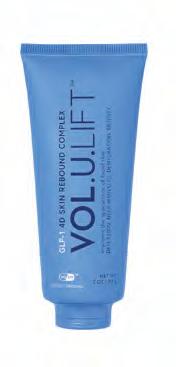
Microneedling, but don’t expect to look like her after it. For this facial, a small amount of your blood is taken, spun in a centrifuge to separate the plasma (rich in growth factors) then microneedled back into your face. The aim is to supercharge your skin’s natural repair process and collagen production. It’s not painful and the next day you look fresher-faced, almost glowing and gradually your skin’s scaffolding rebuilds from the inside out. As the London mayor’s 20mph limit exacerbates stress, avoid town and have your vampire facial at Eternal Aesthetics in Barnet with calm and experienced aesthetician Adina Miron (above).




left fan of Platelet-Rich Plasma (PRP) your face. The aim is to supercharge your skin’s natural and the next day you look fresher-faced, almost glowing inside out. As the London mayor’s 20mph limit and plump in the right way.
To help the two million UK women using Ozempic, plastic surgeon Dr Marc Ronert created VoL.U.Lift (£108), the first and only GLP-1 4D skin rebound complex to combat facial deflation, dehydration and sagging skin. It’s a smart product full of antioxidants such as Bakuchiol, kangaroo paw extract, ectoin, astaxanthin-rich micro-algae and vitamin C, and clinical study results are outstanding. It is the most luscious cream with a hint of tingle that works even if you’re not on Ozempic. Hooray. volulift.co.uk
Hydrating Booster

A PRP course of four is recommended and yes, £350 per session is pricey, but you leave healthy pink and plump in the right way.




dehydrates skin. The result? A papery, and eyes. This booster, costing £28,
Life magazine discount. Tel: 020 8868 7777
Visit eternalaestheticsclinic.com for a 10 percent Life magazine discount. Tel: 020 8868 7777
Weight loss doesn’t just zap fat, it dehydrates skin. The result? A papery, drawn look around the mouth, neck and eyes. This booster, costing £28, delivers multi-molecular hyaluronic acid into the deeper layers. Translation: It gives bounce-back to the bits that have caved in. It’s a quick fix with long-term benefits and is a damn sight cheaper than many alternatives. nealsyardremedies.com
nealsyardremedies.com


Manta Pulse Hair Brush (£70)


Extreme weight loss is terrible for hair, which can be sorted by the Manta Pulse, a miracle brush that vibrates gently to stimulate blood flow and protect breakage. It’s ideal for anyone who has noticed more strands in the shower post-Ozempic and it adapts to the shape of your hand and scalp, detangles gently, and gives your follicles the equivalent of a pep talk. mantahair.com
Scentology Body Mist (£7.99)

Summer is the season for switching things up, including your scent. Your go-to fragrance (Le Labo Santal, perhaps?) is iconic, but can feel heavy come July. Superdrug’s Scentology Body Mist (£7.99) is an affordable way to smell like sunshine and cocktails. The six-scent collection includes vanilla and nectarine blossom (a dessert island in a bottle) and tuberose and spiced pear (white fl orals, ripe pear and soft spice) are a refreshing change for warm nights, and you won’t think twice about spraying it all over.





a refreshing nights, and you about spraying it

superdrug.com
We’ve missed the dancing. We’ve missed the chaos. We’ve missed the energy that only an Israeli wedding can deliver. Still, that’s no reason to miss out on one of Israel’s most iconic exports: the wedding dress. From the










ethereal magic of Mira Zwillinger’s hand-embellished gowns to the red-carpet elegance of Galia Lahav, Israeli bridal design remains a world leader because it doesn’t follow trends – it sets them, and Helena Kolan is one of the new rising stars crafting fairytale gowns by appointment. “I do… want a dress by Alon Livne,” bleat the brides, but Alon also excels at casual and has collaborated with Israeli label Castro, which has brought back Bar Refaeli, 25 years after her first campaign, to be pictured with him.















Austrian mother and daughter Daniela and Esther Stern turned their love of nature into a jewellery brand. Herbalist Daniela dries the plants and photographer Esther encases them in hand-blown glass and silver pendants or turns them into earrings. Wearable keepsakes in summer to treasure in winter. zweisterne.com


Delicate daisies with soft yellow centres, French marigolds and baby’s breath on which butterfl ies land. These blooming floral crowns worn by striking models are Life ’s nod to the blooming season. But this beautiful fashion shoot is about more than sunny days and shedding layers. We may be wearing less, but we’re saying more.


Bring Them Home. Proudly Black & Jewish. Never Again is Now.
The messages on these clothes and accessories show what we stand for. Stepping out in these slogans paired with shorts and shades should not be an issue for the community.
Bailey suggests seasonal purchases with purpose these






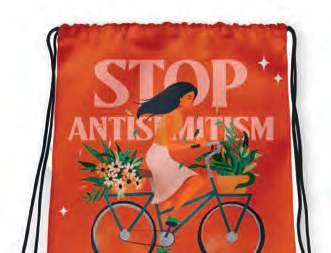


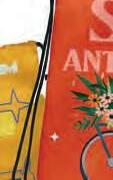
Those who are never without a yellow ribbon pin or hostage dog tag won’t fl inch. But it is the silent ‘others’ we would like to see in these shirts, which have ‘Say No upbeat graphics and flowers.





to Antisemitism’ and ‘I Love My Jewish Friends’ subtly colourful and

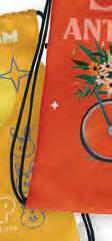










This colourful and committed collection is the creation of Jouparty, a brand so joyfully aligned with Jewish pride and identity that finding it is like stumbling across the faith-based equivalent of Willy Wonka’s chocolate factory. Only instead of sweets, there’s solidarity.



Jouparty is the “world’s largest online shop against antisemitism” with a name that makes the provocative, palatable and persuasive. When keffiyehs and terrorist headbands are sold three for one, we’ve never needed it more.
name that makes the provocative,




'It's a way to address
The founder of Jouparty isn’t Jewish – which is surprising. That she is German makes it compelling. “I can see why,” says Elsa Schatz. “For one of the greatest fashion projects for Jews to emerge from where the Holocaust took place is a paradox.”
As a child, Elsa was deeply affected by school history lessons about the Second World War and the Holocaust.
“They shaped me profoundly. I even had dreams about time travel –imagining I could go back and save children in the camps by bringing them blue contact lenses or blond hair dye.”















Independently, Elsa studied the Holocaust further – which is why Jouparty is about much more than clothing. “It’s a way to address generational trauma, to show that we’re not frozen in the past,and to help inspire a better future together.”












For Elsa, October 7 shattered any illusion that history couldn’t repeat itself.
“After the Hamas attack, I started seeing disturbing parallels between the rise of global antisemitism, violent protests and propaganda, and what I’d studied about Nazi Germany. History was circling back, but most people didn’t and still don’t recognise it.”
Nazi







anyone who refuses to accept injustice and discrimination. In a time when hatred against Jews is spreading like a global virus, Jouparty offers light, colour and joy as weapons of hope.”
Elsa has no desire to be the face of the brand, which is too bad as her fashion-driven resistance could rally the reluctant and convert the complacent.






Elsa took to social media, first as a hobby, sharing videos against antisemitism and pro-Israel content.

antisemitism and pro-Israel content.
“But I didn’t want to add to the hate and noise,” she says. “I noticed that many Jewish or pro-Israel designs use Hebrew symbols, but they don’t reach a broader audience. Not when antisemitic lies dominate.
“I decided to offer something that looked and felt different. Something beautiful and brave that delivered a message positively.”
The tees and totes with the addition of ‘Am Israel Chai’ and ‘Antisemitism is bad for your heart’ are Elsa’s unapologetic response to the silence.
“It exists to unite Jews, allies and
“It’s not about shouting,” she whispers. “It’s the quiet, powerful cry of a world that has said and done nothing for too long.”
Jouparty has various production sites across Europe and the US, with the company donating a portion of its profits to organisations fighting antisemitism, but also providing free clothing, vouchers and financial support to individual activists on social media who speak out but can’t always afford the clothes to stand out.
“These are people risking everything to combat antisemitism,” adds Elsa. “Giving them something to wear that says ‘you’re not alone’ is how I can help.”
There isn’t a Jouparty loyalty card currently, but there should be. Elsa deserves it.
10% discount on every purchase. Visit: jouparty.com and enter the code FRIEND10 and “I many Hebrew symbols, broader lies looked beautiful brave message addition ‘Antisemitism are the



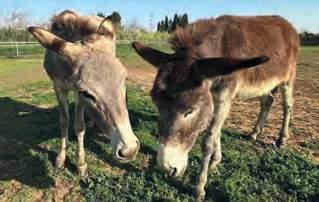

There are donkeys urgently needing to see you at Moshav Burgata, near Netanya. Forty-nine beautiful donkeys and two lovely horses, to be precise, that require some love and attention at the on-site sanctuary. The sanctuary relies on voluntary help – so help is needed, preferably from those with ‘a sensible mind who can use their own initiative’ and in possession of sturdy shoes and know-how to walk a donkey. Or three. In the summer heat. There are not enough staff to lead, so it’s all down to you and you're advised to bring a hat. Since October 7 sent so many to the army, there has been a shortage of help in all animal facilities, which are full because of the amount of orphaned pets and growth in strays. It is for that reason Facebook group Swords of Iron posts constantly for volunteers. So if you are going to Israel, or know someone who is, and they have a few hours spare, there are donkeys, two horses, quite a few rescued cats and two darling dogs waiting to meet them. To find out more, send a WhatsApp message to +972 543221725.


It has been a tail-wagging few months for Teddy, the Israel Guide Dog Center puppy named in honour of the late Martin Segal, beloved UK executive director who passed away last year. This gentle golden pup has not only stolen the hearts of all who meet him but is showing early promise of becoming a standout trainee.



reception brought together a delegation of supporters, including Martin’s widow Rebecca.
Teddy clocks in daily at the courthouse,
Still in the capable hands of a devoted puppy raiser who works at the prosecutor’s o ce, Teddy clocks in daily at the courthouse, where he is known for having excellent social skills and astonishing sensitivity.

He has also become a bit of a social star and snapshots of him at the dog Purim party show him playing with fellow puppies. Although it’s still too early to predict whether Teddy’s future lies in guiding or post-traumatic stress disorder (PTSD) support, updates in September will reveal more but, so far, all paws point to a bright future.
In a touching tribute to the man after whom Teddy was named, the Israel Guide Dog Center has unveiled a new veterinary clinic in Beit Oved in Martin’s memory. The opening




















“Martin believed so passionately in the work of the Center – not just the dogs, but the difference they make to people’s lives,” Rebecca shared. “He would be deeply touched to see how the new clinic will ensure every dog receives the best care possible. It’s a legacy he would be proud of.”
deeply touched to see how
The need for this facility couldn’t be more urgent. With the Center’s reputation as a beacon of independence for the blind, visually impaired or those suffering from PTSD, the number of puppies born on-site has surged. These future heroes, along with hundreds of already-working dogs, now have access to the best medical care. Meanwhile, back in the UK, a record-breaking crowd of 200 attended the annual supper quiz at New North London Synagogue last month. The biggest turnout in the event’s history was, as always, a chance for supporters to test themselves on trivia, eat and win raffle prizes. Martin would have loved the special bonus round devoted to the life-changing work of the Center.
israelguidedog.org.uk
He’s eight years old, has soulful eyes, and knows exactly where Pat the butcher keeps the good stuff. Meet Julius – the four-legged therapist from Israel who has become a celeb in NW3, with his photo as the florist’s mascot.
Julius is a Caucasian Shepherd dog, a breed that hails from somewhere in Georgia, Armenia or Azerbaijan, where they guard livestock against wolves and bears. Known for their fearless loyalty and calm strength, it is understandable that Julius proved to be an outstanding therapy companion for those affected by October 7.
Children were immediately drawn to the gentle giant – so big and fluffy –who has now relocated to London from
Tel Aviv with his owner, Isaac, also a therapist. “Julius is my best friend and my Zen teacher,” says Isaac. “He teaches patience, presence and has no judgement.”
Completely acclimatised to UK weather and enjoying the green space, Julius behaves as though he were born here, walking, unleashed, to see Georgie the baker and other proprietors, who give him treats. Julius is now registered with the Mayhew Clinic as a therapy dog and is currently supporting children at a Hampstead primary school. But he is eager for more therapy gigs , so if you know where his talents would be useful, contact Julius via his Instagram @juliusnw3

Need help with your dog’s behaviour? You’re not alone. Jewish parents love their pets so much they forget to impose rules. So if you’re raising a new puppy, settling in a rescue or need fresh tools for an old friend, you need WCS Ltd

Led by experienced behaviourist Tracie, her one-to-one consultations offer calm, personalised support to help you and your dog understand each other better. Using reward-based methods, Tracie works with you to tweak and teach for lasting change. From toilet training to reactivity, separation struggles to lead-pulling, each session is tailored to your dog’s needs and you get a detailed follow-up report to guide your progress. So you make the chicken soup and leave the one-to-one support to Tracie. Email tracie@wcsdogs.co.uk; Instagram @waggingtons; Phone 07900 123456

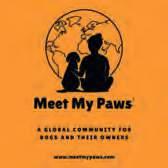
In a world in which swiping left is the norm, seeking a match through meaningful conversation feels like a lost art. But it’s different if you have a dog...
Martine Davis is convinced it improves your chances of meeting someone – and, as the founder of exclusive matchmaking agency Page Introductions, she is no stranger to helping others hook up and knows dogs are like magnets. A Bichon Frise or a Boston Terrier spark chats with all sorts, and among them may be the one. That’s why Martine has launched Meet My Paws – a social platform for dog owners that’s turning casual strolls into real connections. Whether you’re single, attached, divorced or tired of walking alone, this free community is there to help you meet people via your pup.
Martine set the ball rolling on walks with her Cavapoochon, Rusty modelling a T-shirt that read ‘My owner is single’ (available from Martine’s online store).
“Sometimes the hardest part is just saying hello,” says Martine. “Meet My Paws does the introducing. The rest is up to you – and your dog.”
Members can search by location, dog breed or interests, and can arrange walks, coffees or adventures – at home or even while travelling. Join the pack and see where your lead leads. meetmypaws.com
And, if you haven’t got a dog to help in your search for a partner, hurry to alldogsmatter.co.uk acquire one. You’ll be giving love to find love.
and




















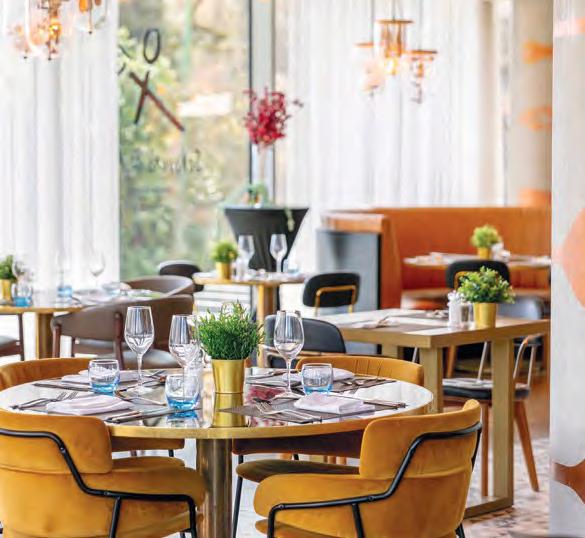
Bournemouth has shaped the childhood summer memories of many of our readers, so why give it up now? Instead, head south for sea, sand and a side of style at the Hilton Bournemouth – a sleek, family-friendly hotel with more than a splash of personality.
Just five minutes from the beach and pier, the hotel makes its mark from the moment you step inside. Designed by Ted Baker founder Ray Kelvin, the interiors brim with quirky British charm. Bold wallpapers, sculptural staircases, art-lined corridors and lifts with texture and flair. Even the ensuite bathrooms ditch the dull chain hotel vibe in favour of stylish tiles.
Beyond good looks, the Hilton delivers on comfort. The heated indoor pool is perfect for unpredictable British weather, and while children splash, grown-ups can sneak off to the R1SE Spa for a massage or sauna. During school holidays, the Aspire Life Sports Kids Club keeps little ones busy with crafts, games and sports.
Rooms are spacious and family-ready, with interconnecting options, free cribs, child-sized robes and a buffet breakfast with all the faves –pancakes included. The hotel’s open-kitchen restaurant, Schpoons & Forx, serves up reimagined British dishes and gets further than nuggets and chips on the children’s menu.
Beyond the quirky walls is the Oceanarium, zip line, pleasure gardens, mini golf and sandy (important) beaches. If you’re driving, this Hilton has private parking and EV charging, ensuring that yellow lines and no electricity are not part of your holiday. This is Bournemouth with a touch of luxe for grown-ups and cannonballs and colouring kits

for the children, who will continue the Bournemouth tradition of making memories. hilton.com
A lba di Canazei is a postcard-pretty village in Italy’s dramatic Dolomites, and not the obvious location for My Kosher Hotel, but that’s what makes it matchless. In summer, when the snow melts to reveal lush green meadows, this kosher haven at altitude is surrounded by wildflowers and hiking trails that stretch for miles. Families flock here for the rare combo of glatt kosher dining, a synagogue and a mikveh on site, with full access to nature’s playground. There’s a pool for cooling off, mountain bikes for hire, and plenty of kosher picnic options if you’re heading out for the day. It’s peaceful, picturesque and ideal for anyone looking to combine Jewish tradition with alpine adventure. mykosherhotel.it
ABOVE: The bar and Schpoons & Forx and the pool at Hilton Bournemouth
BELOW: My Kosher Hotel in Alba di Canazei, Italy

Louisa Walters walked the line from country music to rock ‘n’ roll through Nashville and Memphis
From Dolly Parton to Luke Combs via Johnny Cash and Jelly Roll, you cannot help but get caught up in the country music vibe of Nashville –but it was the amateur musicians playing from 10am till 3pm in the honky-tonk bars along Broadway that got my feet tapping. Entry is free, but you are expected to buy a drink and tip the band. Going from one to the next, past hen and stag groups, couples and gatherings of friends, makes for a great night out.
The thing that surprised me most about the town known in these parts as Music City, is how small it is. Like Vegas, it’s all about the strip (Broadway) – only this one is shorter, seedier and decidedly more Hicksville. It’s also oozing with honky-tonk fun.
We stayed at Holston House, a mid-priced Art Deco hotel, far enough from the sounds and lights of Broadway to afford us a good night’s sleep, yet close enough that we could walk everywhere. It offers a pretty decent breakfast and a rooftop pool. Our room was spacious and well-appointed with a large bathroom. The hotel pays heed to the town with musical artefacts – such as vintage speakers on the wall – art made from vinyl records and black and white photographs of Broadway’s bars.
To get our bearings, we boarded the hop-onhop-off Old Town Trolley Bus Tour. It was hard to believe our eyes as we rode past the city’s very own Parthenon, a replica of the Athens showpiece, which gives Nashville its nickname “The Athens of


the South”. We stopped off at Marathon Village, a former motor works that is a haven of motoring memorabilia, craft shops and a distillery.
The Country Music Hall of Fame and Museum is as good an introduction to the sounds of the area as any, charting the evolution of country music and its influence on soul, R&B and rock. We visited the famous RCA Studio B, Nashville’s oldest recording studio, where Elvis recorded many of his singles and where the Steinway piano he played is still in situ. The Ryman Auditorium, the original home of the Grand Ole Opry, is still home to concerts and we learned all about the Fisk Jubilee singers, who went to the UK and played for Queen Victoria. She remarked: “You must come from a music city”, which is how Nashville coined its moniker.

Music, yes... healthy eating, no, unless you head to the gentrified Gulch area, where Biscuit Love offers up decent salads. Back on Broadway, it’s all about fried chicken and the queues outside Hattie B’s attest to this. Possibly the tastiest meal I’ve had in my life, though!
It’s also a shopping no – unless you want cowboy boots, a Stetson or sunglasses, and it rather surprised me to be served by a Chasidic man in the Ray-Ban shop. He told us there was a small Jewish community and a few synagogues and that it was even possible to buy kosher food.
After a 200-mile drive to Memphis we checked into Canopy by Hilton Memphis Downtown, a lovely bright modern hotel with large sunny bedrooms, an incredibly comfortable bed, terrific lighting in the bathroom and a great vibe every time you walk in the building. The location is

superb, right across the road from the landmark Peabody Hotel, home to Lansky brothers, the Jewish-owned store where Elvis Presley used to have his clothes made.
First stop was Sun Studio, the former auto repair shop that became the birthplace of rock ‘n’ roll. This is where an 18-year-old boy named Elvis made a recording for his mum’s birthday and changed the music world. BB King, Johnny Cash and Jerry Lee Lewis all recorded here, too, and put Memphis on the map. The locals say it best: “Blues and gospel had an affair and gave birth to rock and roll.”
On the Memphis Mojo Tour bus we learned the history of “the world’s largest small town” from a musician on board, who strummed his guitar, sang and told us stories and anecdotes. He took us past the unassuming block of flats where Elvis lived as a boy and pointed out his bedroom window.
Memphis is very much an ode to Elvis, with sculptures and memorabilia scattered all across town, but there is much else to see. The National Civil Rights Museum presents a very well-curated outline of the history of the movement, ending with a visit to the very room where Martin Luther King was shot, which I found very moving. At the Peabody Hotel, the resident ducks take to the red carpet in the lobby every day at 5pm – Memphis madness but seriously cute.
There’s also a great food scene. By The Brewery is a rustic brunch place in a cool redeveloped area, while Hive Bagel has the largest range I’ve seen outside of New York. At Lobbyist at Chisca we feasted on sharing plates with punchy flavours and lots of veggie dishes and Flight is a novel concept where the food comes in flights as well as the wine – they describe them as ‘mini’ plates but, this being America, they are all very substantial. But I still found room for chocolate pecan pie!
All of this is just a forerunner to the behemoth that is Graceland, which is so much more than just a house. There is a vast complex of museums charting Elvis’ life, his clothes, his cars, his artefacts and you can even board his very own full-sized plane. There is something profoundly
moving about entering Graceland. It’s every inch a real home, untouched since Elvis’ death and fully furnished with personal possessions.
While it’s a lovely big family house (Elvis bought it for his parents and lived there with them, his wife and his daughter), it is somehow not ostentatious. It has sizeable – but not gargantuan – rooms, lovely – but not sprawling – grounds, and a relatively basic home office in the garden, from where his father managed his affairs. There is also a small but poignant museum on-site filled with family photos and documents. It was here we learned Elvis had a twin brother who died at birth.
Graceland is a real insight into the man himself, who is buried in the grounds together with his family. His mother’s headstone with a Magen David is in situ. For a Jewish Elvis fan, it feels like coming home.
Louisa’s trip was organised by tnvacation. com, with accommodation at Holston House (hyatt.com) and Canopy by Hilton Memphis Downtown (hilton.com). For airport transfers: blacklane.com For tours and special offers: visitmusiccity.com




Tucked within the cobblestone lanes and gothic spires of historic Prague stands a hotel that is both a haven and a heritage site: Hotel King David. This five-star glatt kosher gem is housed in a lovingly restored building and the only fully kosher hotel in the Czech Republic that is renowned for its warm Jewish hospitality, with a synagogue and mikveh on-site. There are lavish buffet-style meat dinners and Shabbat lunches with a lighter dairy fare served daily in the elegant lobby bar. The hotel’s 65 rooms and suites blend historical charm with sleek, modern comfort – each one designed with Shabbat in mind. Need a moment to recharge? The wellness area has a heated pool, jacuzzi, steam room and sauna – which you’ll appreciate after full days of sightseeing and shopping in nearby Wenceslas Square. And the beautifully restored Art Nouveau Jerusalem Synagogue is just a five-minute stroll away. Prague is likely to be on your must-visit list and now you know the place to stay. hotelkingdavid.cz

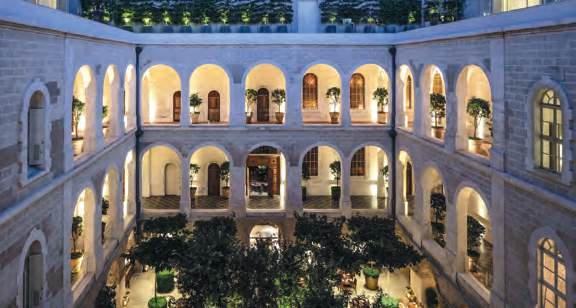
A hotel deemed worthy of a place in the Fattal Limited Edition collection tells you all you need to know. That it’s in Jaffa tells you to book. Jaffa is Israel’s coolest ancient town, from where Jonah set sail and the cedars for Solomon’s Temple arrived. So, to be part of that, The Jaffa Hotel had to be biblically impressive. It’s certainly cinematic, tucked into a 19th-century neo-Renaissance former French hospital, where guests can stay either in the historic wing, with its soaring ceilings and cloistered corridors, or in the minimalist modern wing designed by British-Israeli architect team John Pawson and Ramy Gill. The hotel’s 120 rooms and suites look over Jaffa’s terracotta rooftops, the Med or the tranquil courtyard and pool. Of course


you’ll go out, but eating in is an experience. Don Camillo is a Michelin-recommended Italian with a New York twist, offering handmade pastas and an award-winning wine list. By the pool, Golda’s Deli serves comfort food with Israeli chutzpah all day, then it's cocktails in the vaulted-ceilinged Chapel Bar, which is available for private events. Jaffa is all about old-world beauty, but the L. Raphael Genève spa is for right now, with six treatment rooms, steam saunas, hammams, and high-end treatments that guests who appreciate a backgammon lounge would expect. A 24/7 gym – tick, and valet underground parking – ditto. The adventurer in you loves the closeness of the port and flea markets, but The Jaffa Hotel’s luxury makes it a holiday. thejaffahotel.com
DON’T MISS MONTENEGRO
From a boat, the cascade of stone-and-glass residences and suites dotted on the hill look like the HQ of a Bond villain. Impressive and discreet, it is only when you are inside an apartment at The Dukley Hotel and Resort that you appreciate how five-star it is, which is true of relatively unexplored Montenegro.
There are the balconies, for starters, with views of the turquoise water from the Jacuzzi. Or the Stairmaster, so you can work out before heading to one of three private beaches or the rooftop infinity pool. Furnished in warm wood and stone with maritime accents, you’ll want to emulate the apartment décor at home, but not before dining at the five restaurants, which include Sunosan – a Japanese – and the open kitchen Dukley Seafront Restaurant serving Mediterranean with Italian leanings. As there are multi-bedroom suites, this is a resort for families, cue a kids’ club, water sports, boat shuttles to the town of Budva and babysitting services. But the most unexpected twist: it has a thriving Jewish centre with Montenegro’s only five-star kosher restaurant, Shalom, overseen by the Chief Rabbi of Montenegro. Kosher on a private peninsula in Montenegro? It’s a gift. dukleyhotels.com

Erin Molan (inset), Life ’s last cover star, ignited our interest in Australia with her support for Israel. To a lesser degree, Married at First Sight Australia made us want to visit as it featured some truly beautiful places. If you are fortunate enough to go to Oz, connecting with the tribe will be a must, so be sure to go to Kimberley Gardens in the leafy Melbourne suburb St Kilda East. A favourite simcha spot for the community, the boutique property has one- to three-bedroom villas, studios with spa baths or queen rooms, with guests consistently raving about the comfy beds. An indoor heated pool, spa and fitness centre are also part of this garden-wrapped retreat and all the food is glatt kosher so, although it’s a long way to travel, the Kimberley Brunch menu is motivation as is everything Melbourne has to offer. kimberleygardenshotel.com.au
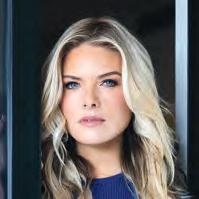
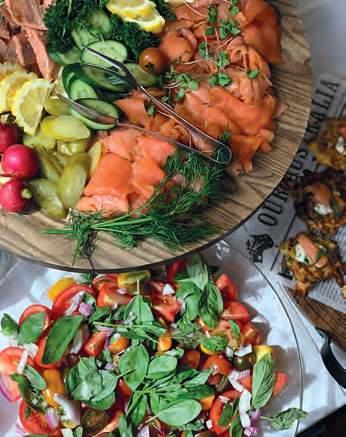


“What’s the point?” “Aren’t you too old for this?” “Are you really Jewish and Welsh?!”
These are questions I’ve been asked by comedian friends and real friends ever since I decided to perform once again at the Edinburgh Fringe Festival.
So why am I doing it? It’s not like I’m the next new thing waiting to be discovered – that ship sailed so long ago it could have been part of the Spanish Armada. And it’s certainly not for financial reasons – the only people who make money at the Edinburgh Festival are hotel chains, the venue runners, and those who let out their homes for the month. I mean, who wouldn’t want to pay £4,000 to sleep in someone’s sink?

There are two main reasons I’m doing it again. The first is I want to try and help people. Odd, I know, but my show this year – the most personal I’ve ever performed – is about dementia, depression, death and antisemitism. You know, the usual comedy subjects. My previous show, LOSER (2023) did pretty well. Played to packed houses, won Poster of the Year, made Top Ten Jokes of the Fringe and The Telegraph. FYI the joke: “I entered a ‘how not to surrender’ competition and I won hands down.” Off the back of that, I planned to return in 2024. But then my father, who had dementia, passed away at the end of the year. Following this and other factors mentioned in the show, I experienced depression for the first time. It stopped me from doing anything but staring at the floor and crying. I had to cancel work, my show, a holiday and cancel visiting my children – my favourite thing in the world. I was in physical and mental pain. I know what you’re thinking – this show sounds laugh-a-minute. Well, there will be laughs (he says, optimistically), but like the first Edinburgh show I ever wrote – about becoming penniless and
homeless after identity theft – I’m hoping it’ll be interesting, informative, and help others in a similar place. I’ll also explore how antisemitism has become an acceptable form of racism on the comedy circuit and how I regretfully – and inadvertently – upset Sir Anthony Hopkins, who used to light the fire for my religious grandparents in Port Talbot.
The other reason I’m performing is because my son is performing too! He’s just finished an English and Acting course at Edinburgh Uni (a course I’d have loved to do, if it had existed and I’d been clever enough to get his grades).
younger – but I knew I wouldn’t be any good at it. I regret writing that… Bennett Arron: I Regret This Already Liquid Rooms Studio Aug 2 - 24.


He’s one of five in a comedy called Holly Street. I’ve read the script and, considering it’s by a 22-year-old with no previous writing experience, it’s annoyingly good. So the chance to perform at the festival with him was too good to miss. Plus, I’ll need him to hand out leaflets in exchange for the thousands I spent on food, nappies, video games…
So, these are the reasons I’ve decided to do it. The show is I Regret This Already (if you’re Jewish you’ll put a comma after “This”). Will it be successful? I’ve no idea. I’m a comedian, not a fortune teller. Funnily enough, I wanted to be a fortune teller when I was








A little while ago, my brother David and I were on the I Wish I Was An Only Child podcast, hosted by Frank Skinner’s wife, Cathy and her sister Rachel. The first question they asked us was: who’s the funniest? Potentially awkward, but I answered without much hesitation: I am socially, he is professionally. That’s not to say David isn’t funny socially—he has his moments— but for no doubt deep-rooted psychological reasons, I’m a people pleaser who has always liked making people laugh. Was I funny at school?



I think I was, but more in a class clown/buffoon sort of way than the sharp, quick-witted kind. Which it probably would’ve been if I’d had a copy of How To Be Even Funnier Than The Funniest Kid in School , by


Steve Vinacour and, oh, me. It’s the follow-up to How To Be The Funniest Kid in School , which we also wrote.
In the first book, there are jokes about school subjects like English… What word is always spelled incorrectly? Incorrectly. While the new book expands to things like technology… Where do you find information about ducks?
On a webbed-site.
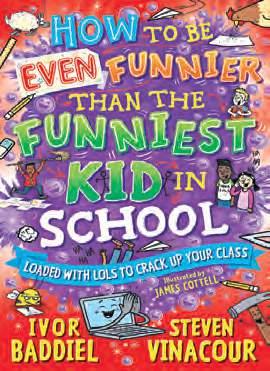

Now you may laugh—or not—but these jokes are the building blocks of proper comedy. Before age six or seven to get a laugh just say “poo.” Fart noises also work—though admittedly, they lack structure. The gags in HTBEFTTFKIS involve wordplay. They need a setup, punchline, and something relevant to the child’s world—so a bit of observation too. You have to start somewhere, and in my humble opinion, this is it.
So, where next? TV shows like The Simpsons and SpongeBob are great. But to
immerse your child in comedy, you could do a lot worse than the Edinburgh Festival. This year, there are over 1,200 comedy shows. Not all are suitable for kids, but some are.Seeing a show introduces your budding Joan Rivers or Jerry Seinfeld to the most important part of comedy: performance. You might have a great gag, but if the delivery’s off, it won’t land. Timing and confidence matter and come with experience. Seeing how others do it—or don’t—is part of the learning. Every great comedian has died on stage. I once watched a comedian I wrote with bomb so badly, I’d have dug my own grave. She didn’t. She got back on stage the next night –because resilience is part of it.
Once your budding comic graduates from our book and gains confidence, they’ll need new gags. Unless they’re planning to play to six to 10-year-olds forever – in which case, job done.
There are no rules – but the golden advice is: write what you find funny.


Don’t try to second guess the audience. It doesn’t work. On one of the rare occasions I tried stand-up, I completely misread the audience and died on stage. I think some members of the Pinner shul community are still traumatised. Maybe don’t lead on prostate cancer material at a family fundraiser—but still, write what you find funny.
Is it harder to be funny now, especially if you’re Jewish? Maybe. Comedy always shifts. In the ’80s, old-school comics moaned about alternative comedy. Jokes from the Noughties? Some are now completely off-limits. Look at Little Britain. But that’s fine. Comedy should be challenging. If it wasn’t, everyone would do it.That said, some things never change. Poos and farts? Always funny to a three-year-old. Wordplay? Always funny to six-year-olds. Which means How To Be Even Funnier Than The Funniest Kid in School (and its predecessor) are essentially timeless.
Anyway, I’ll leave you with this absolute banger. If your six-year-old doesn’t laugh, I’m the Chief Rabbi:
What do snakes do when they’re in a bad mood?
Have a hissy fit.












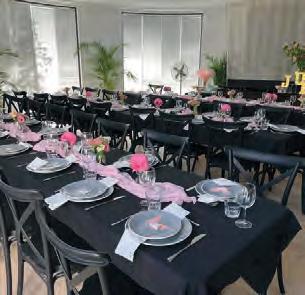

by actor and thinker Elliot Levey
I have never struggled with the good art v bad artist debate. Can we enjoy Wagner without the ‘ick’? Easy. Yes. His music is astonishing. Next? T.S. Eliot, Chesterton, Pound? Products of their time, sublime, but of little contemporary influence. Inverse this for Kneecap and Kanye. Huge impact, ridiculous art and more ick than you can shake an antisemitick (sic) stick at.
And so to Dahl...
There’s a wonderful line in Mark Rosenblatt’s play Giant, where his publisher is asked why he is prepared to stay silent over Dahl’s not entirely pleasant views about Jews.
“Because books are how we grow up. How we first navigate the world, learn to live, become vaguely functioning adults. And this man, he deserves criticism for what he’s said, sure, but in his books, he picks a glorious, playful path through the chaos of childhood. It’s the rarest of gifts. To show its cruelty but take you out the other side. And the more kids feel guided by his books, the more boldly they’ll read as adults…”
As the actor lucky enough to be saying these words, I’d like to tell you how deeply this resonates.
My parents were drowning in a rancorous divorce, but a copy of Dahl’s Danny, the Champion of the World nestled under my pillow kept my five-year-old self happily afloat. It’s the story of a beautiful relationship between a father and son living in Arcadian bliss after the death of a barely-remembered mother. My father would read a chapter to me the night before I was handed back to my – happily very much alive – mother.
He’d turn out the lights. I’d beg for another chapter and, as his footsteps retreated, I’d switch the light back on and force
ABOVE: Elliot Levey with his father and (top) as a child
BELOW: John Lithgow and Elliot in Giant



myself to decipher the words. I willed myself to read. It was an act of instinctive parental brilliance that leaves me in awe to this day. I became literate over a paean to fatherhood. My imaginative light was switched on over a book that pitted father and son against a hostile world. And their nemesis? A moustachioed man in a big car called Mr Hazell. When I tell you my new stepfather drove the same car and sported a moustache, you’ll forgive me for thinking my Dad had written it himself.
That my Dad and Dahl could become synonymous in my infant mind speaks less to the coincidence of our situation –and my Dad’s propaganda coup – and more to the universal genius of Dahl. He really had the magic touch. When he was threatened with cancellation over his antisemitic remarks, Dahl knew the kids would revolt. He spoke directly to them. The adults had no idea. His book sales would be unaffected.
But what if his antisemitism makes it into the books themselves? What if the blood/brain barrier of art and artist is crossed? That’s the dilemma at the heart of Giant. Dahl’s publisher fears his new book The Witches could be seen – in the light of his newly-published views on Jews – as analogous, the witches being hook-nosed Jewish devils who stalk the land printing money and killing children. Dahl rightly rejects this as ridiculous, but once his bigotry has become explicit, how does one refute the accusation of implicit racism? Let the work speak for itself and keep shtum? Open your mouth and you open a Pandora’s box of prejudice.
I’m not calling for artists to be muzzled – however blissful a respite that might sound to some – but for them to recognise that their best work rarely comes from the part of the brain that churns out political opinions or ideology. A thesis may be inspired, but it’s built from evidence. When we call something non-artistic ‘a work of art’, we do so knowingly – because something beyond logic has happened. It escapes the everyday. I’d never claim the actor’s craft ranks alongside the painter’s or composer’s, but you recognise when the judging mind switches off. You look into someone’s eyes on stage and just believe. It’s time out of the quotidian mind.
When Wagner composed Parsifal, was he taking time out of his antisemitic mind? The art is too magnificent to believe otherwise. When Kanye spews his latest bile, and Kneecap hail Hezbollah, the art is too crass to care.

i there! We’re Michaela and Priya, the proud partners of Specsavers Borehamwood. Specsavers stores are run by local partners who work in store and in the test room. With cutting-edge technology, advanced staff training and a new frame range, our Borehamwood team has been refreshed since 2022. Come in and see the difference – we truly care about our community and will always try and put anything right.
If you’ve been thinking about booking an eye test or a hearing test, or just fancy popping in for a chat, we’d love to welcome you. And don’t miss the exclusive discount code at the end of this article.
Below we’ve answered some of the most common questions we hear about eye tests, ears, glasses or general eye health.
HOW OFTEN SHOULD I GET MY EYES TESTED?
Adults with no existing eye conditions should have an eye test every two years. If you have concerns or speci c conditions, your optician may recommend every six to 12 months.
HOW OFTEN SHOULD I GET MY EARS TESTED?
weaken your eyes. In fact, they help correct issues such as short-sightedness and astigmatism, which can reduce eye strain and help maintain your eyesight.
WHAT AGE DOES SUN DAMAGE START AFFECTING YOUR EYES?
UV damage can begin early, and most sun-related eye issues happen before age 20. Protect young eyes with proper sunglasses, which also protect the skin around the eye.
WHAT IS AN OCT SCAN?
Measure the distance from where you sit to your screen(s) prior to your visit to us to make your glasses prescription bespoke to your needs.
If you’re over 50, regular checks are essential. We recommend annual hearing tests from age 40, or every two years if you’re younger. We offer free hearing tests at Specsavers Borehamwood for anyone over 18.
AT WHAT AGE SHOULD I TEST MY CHILD’S EYES?
Around age four, or when they start recognising letters. If you notice anything earlier – such as a wandering eye or that they are bumping into things – book an appointment earlier. REMEMBER: At Specsavers Borehamwood, children’s eye tests and glasses are FREE, with lots of fun styles to choose from.
WHAT IS MICROSUCTION EAR WAX REMOVAL?
A gentle vacuum that removes excess wax – it’s safe, effective and performed by accredited audiology professionals at Specsavers.
WILL WEARING GLASSES MAKE MY EYESIGHT WORSE OVER TIME?
Not at all! Wearing properly prescribed glasses won’t
This is like an X-ray and allows us to see the different layers of the back of the eye to detect early signs of eye conditions such as glaucoma, macular degeneration, diabetic retinopathy and many more. It’s just £5 at our store.
WHY AM I GETTING EYE STRAIN?
Common causes include too much screen time, reduced blinking and unworn prescriptions. Try the 20/20 rule: every 20 minutes, look really far away for 20 seconds – and blink often.
I WEAR VARIFOCALS FOR SCREENS BUT STILL GET NECK ACHE. WHY?
You may be tilting your head to nd the right focus area. Come talk to us – we can help you nd better lens options for your workstation.
WHAT’S THE BEST FOOD FOR EYE HEALTH?
(HINT: IT’S NOT CARROTS!)
A Mediterranean-style diet with kale, leafy greens, sh, whole grains and olive oil.



Israel was already in deep trauma from the 7th October atrocities and now the psychological needs of Israel’s most vulnerable communities have significantly increased again. We urgently need your help to fund emergency mental health support and, in addition, to provide emergency supplies for those in shelters.
UJIA is working closely with partners in Israel to ensure that all funds raised will go directly and immediately to support those that need it the most. Your donation will have an instant and ongoing impact on those affected by this indiscriminate onslaught from Iran
Donate today at ujia.org/underfire or scan the QR code
ujia.org
